

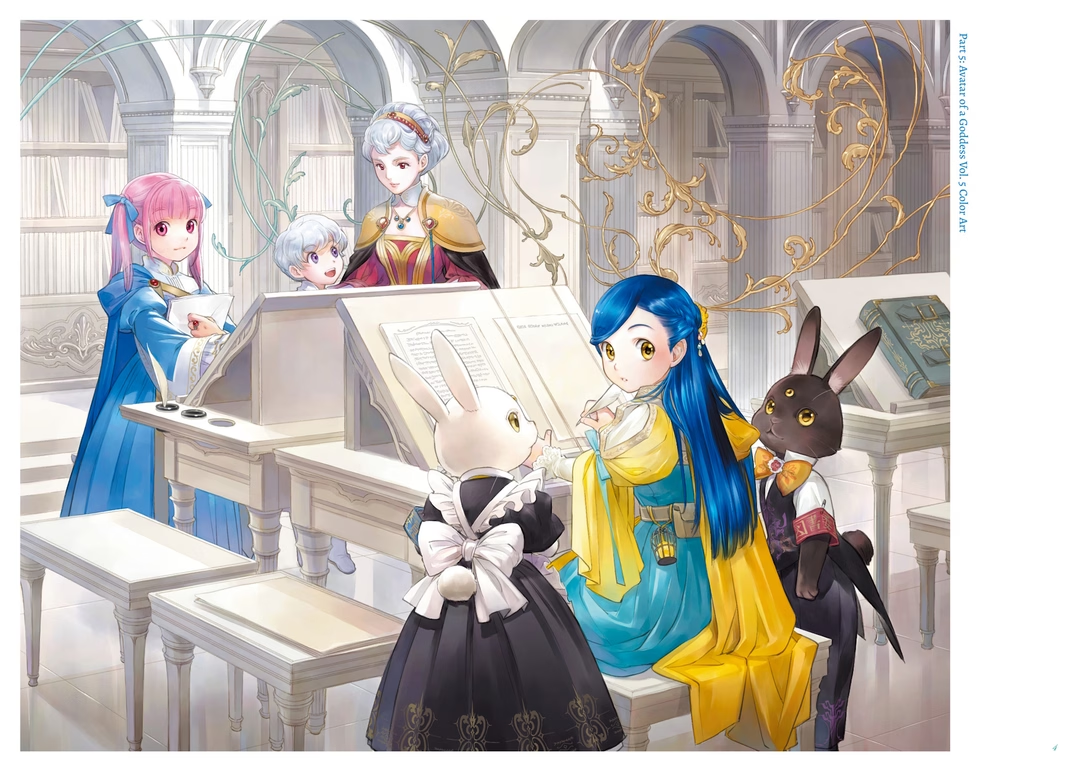





















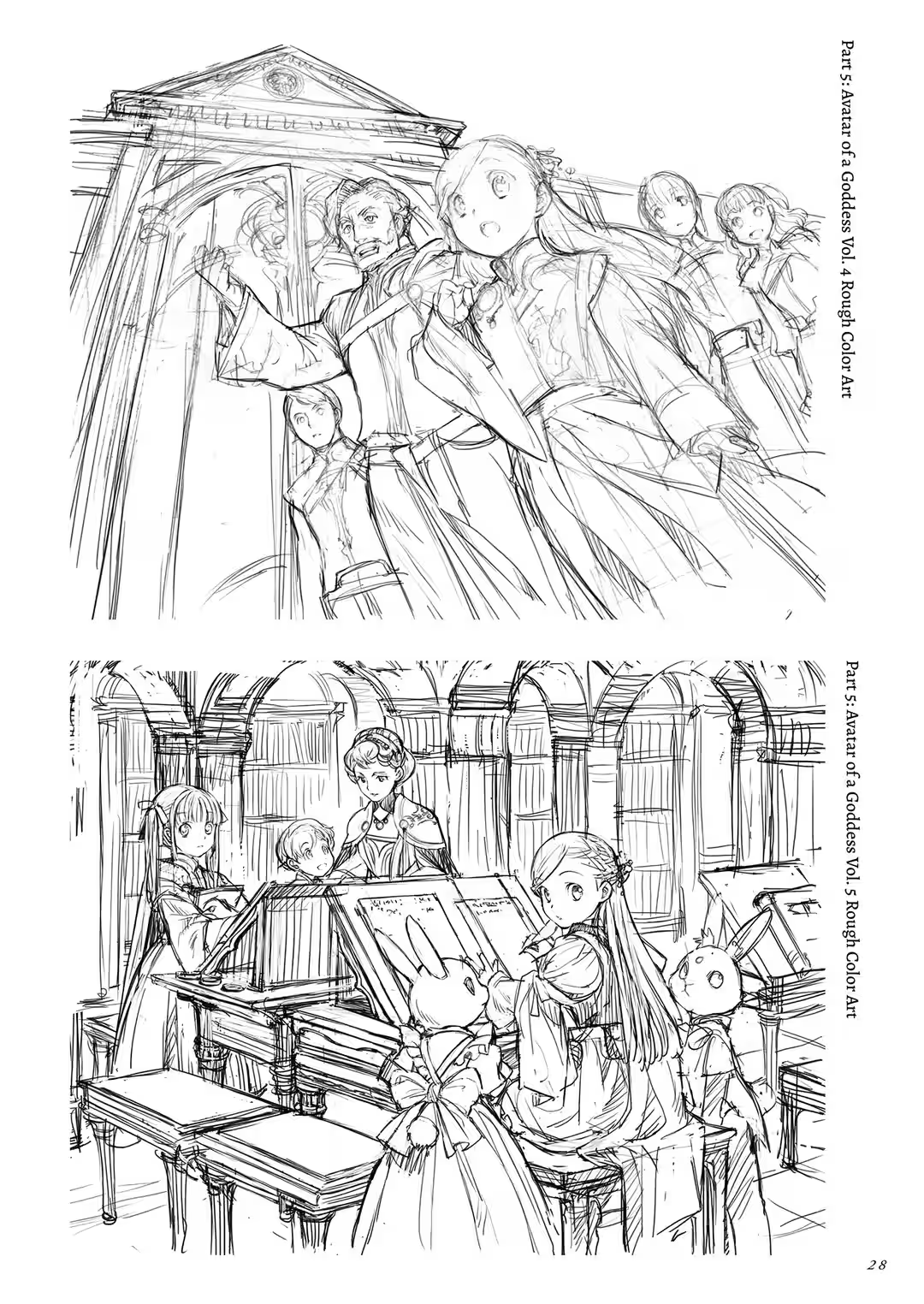
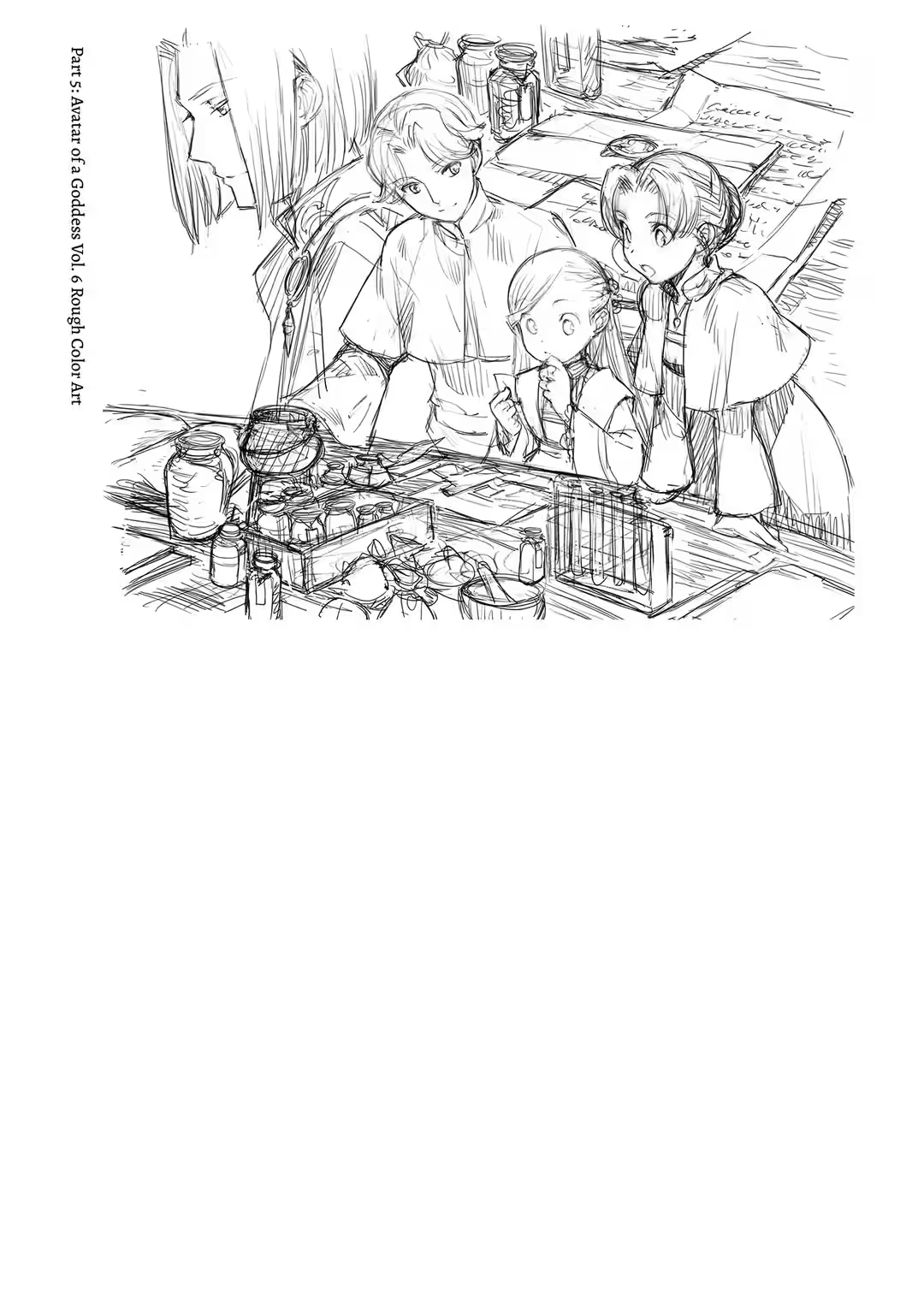
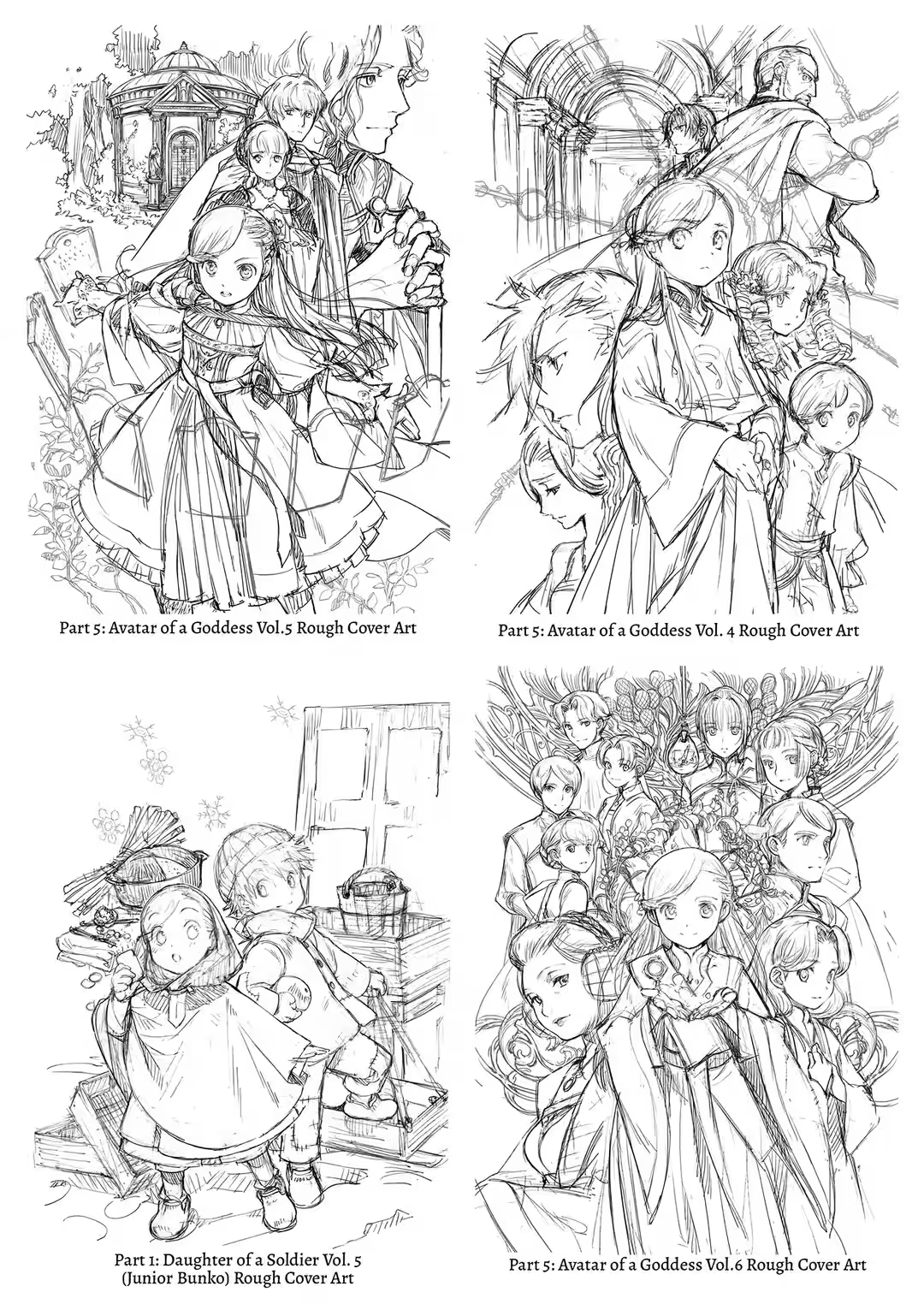



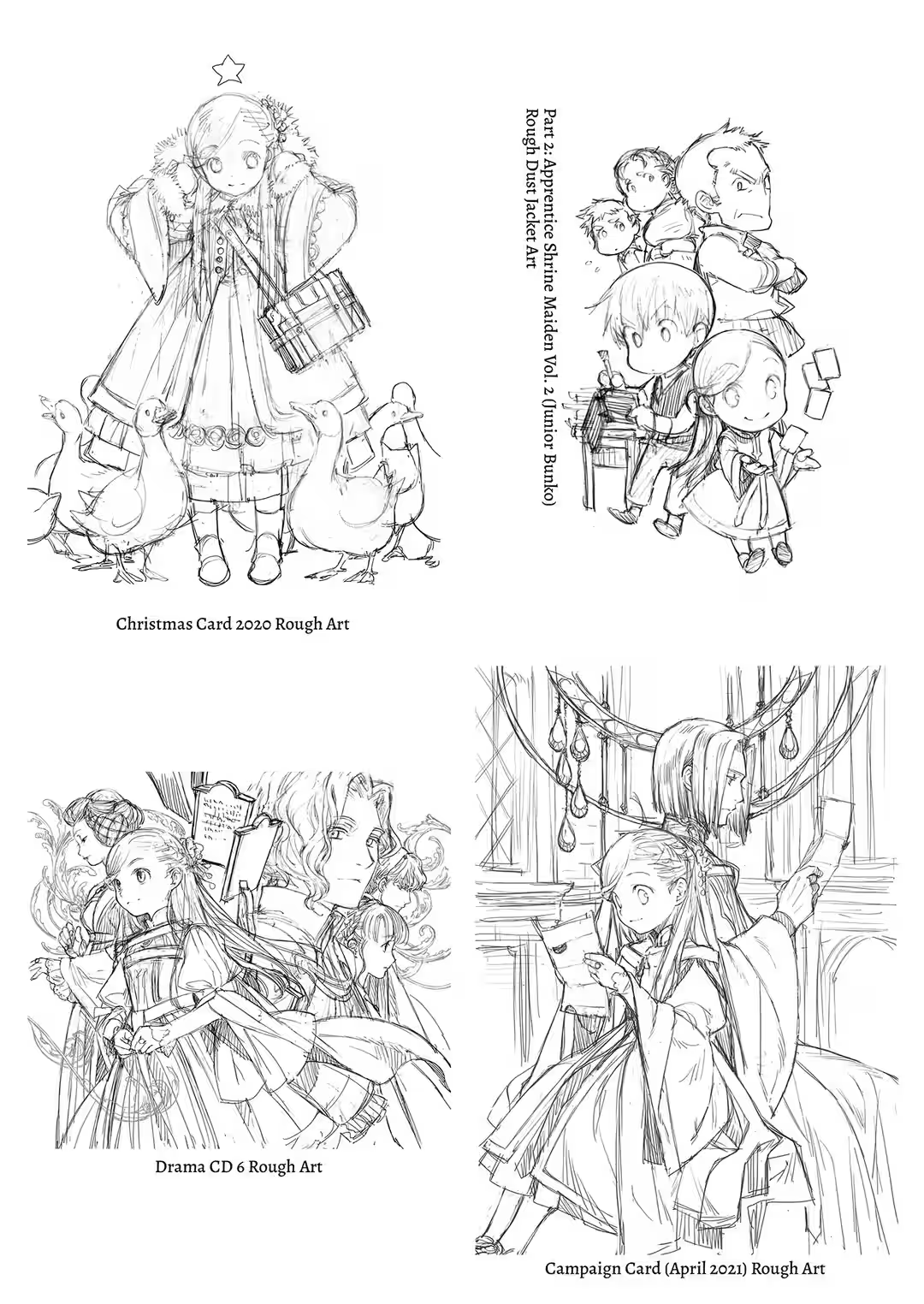

Preparing to Become a Noble
“Dirk, Meinard, I bring magic tools gifted to you by my father, Aub Ehrenfest.”
The day after our interview with Lord Hartmut, Lord Melchior came to the orphanage’s dining hall. He wasn’t alone—there were several gray attendants and noble retainers with him. I recognized Fran and Monika from the High Bishop’s chambers, and Lady Philine and Lord Damuel from among Lady Rozemyne’s retainers. If only Lord Hartmut and Lady Rozemyne had arrived with them.
So there are magic tools inside that box, huh? Neat.
I tried to step forward, curious about the box two of the attendants were carrying, but someone pulled me back. I glanced over my shoulder and saw Delia holding my arm.
“Dirk...” she murmured.
Deep down, she was probably still opposed to my decision—but I’d already made my promise to Konrad. I would get a magic tool and become a noble who could defend the temple. Delia was only stuck in the orphanage because she had chosen to protect me. I owed it to her to return the favor, no matter what.
“They’re here for me,” I said. “I need to go.”
We had received a message before Lord Melchior’s arrival, informing us that we pre-baptismal children should all stand ready for him. The adults had gone to the workshop to give us some privacy.
I pulled my arm free of Delia’s grasp and went to the front of the gathered children with Meinard and Wilma. Everyone watched as we exchanged the appropriate greetings. I even heard someone mutter, “Arrogant commoners...”
“You must choose from among these,” an attendant said as the box was placed on one of the tables and opened. Wilma picked up Meinard so he could see inside, but I was too old for that. I climbed onto a chair instead.
Inside the box were bracelets, ornate metal decorations, and what appeared to be glass jars. They looked just like the tools the noble children in the orphanage used. Garrick had said that even those with noble blood needed them to actually become nobles. He had gotten really mad during his interview when Lord Hartmut rejected him for not having enough mana. He was still mad, in fact.
“Are these the tools for becoming a noble?” I asked.
“They are tools for storing overflowing mana,” answered Lord Kazmiar, one of Lord Melchior’s retainers. “The bracelet absorbs excess mana that could prove lethal to a child and stores it in the empty feystones here.”
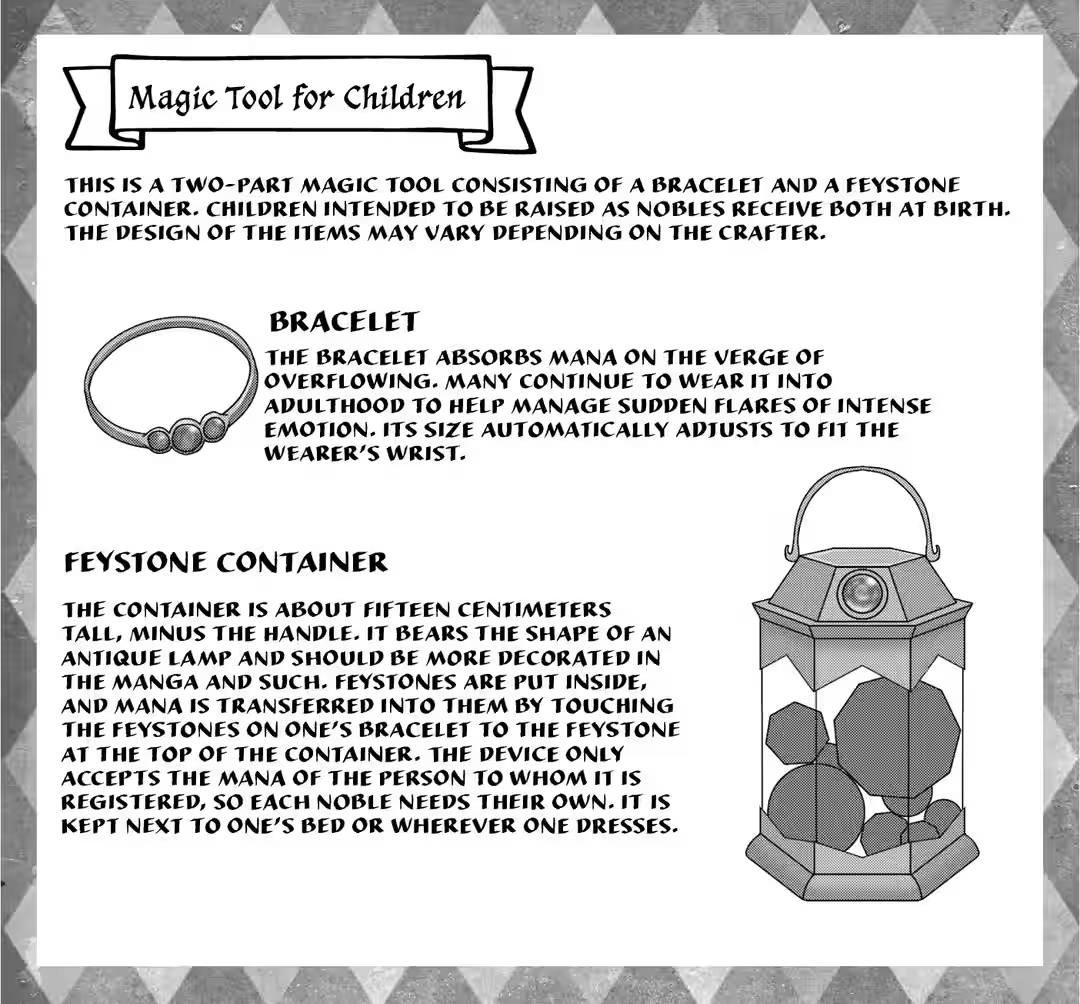
Lord Kazmiar had pale orange hair and hooded brown eyes. He was a kind man who spoke and acted a lot like Lord Hartmut—which was fitting, as he was due to succeed the man as High Priest. It was hard to understand what he was saying sometimes, though.
“Can you become a noble without them?” I asked. “If you have good enough control of your mana, I mean.”
“One does not learn to control one’s mana until the Royal Academy—and one must be baptized as a noble to even enroll. Not to mention, students need the feystones they dye with these tools for their lessons. One could cleanse and dye feystones during class, I suppose, but it would be exceptionally tough for a child without prior experience.”
So, um... that’s basically a no.
I had hoped there would be some way around it, but apparently not. Despite having teased me nonstop since Lord Hartmut’s interview, Garrick wasn’t going to be a noble anymore.
“Kazmiar, choose which of the tools will suit Dirk best,” Lord Melchior said.
I glanced over at Meinard and noticed he was already wearing a bracelet. One of Lord Melchior’s retainers stood with him, a glove covering one hand. When I looked closer, I realized Lord Kazmiar was also wearing a glove.
“I wear this to prevent mana contamination,” he explained, waving his protected hand.
“Are the magic tools not all the same?” I asked.
“They have different affinities. If the tool you receive does not suit you, then your mana will seep out before it can reach the feystones. Please grip this and count to ten.”
I wasn’t entirely sure what he meant, but I gave an enthusiastic nod, held the feystone part of the bracelet, and counted to ten. Lord Kazmiar’s narrowed eyes darted between the tool and me. I couldn’t quite tell what he was looking for.
“Nobles receive these tools as babies, don’t they?” I asked. “If they can’t grip the tool, it must be hard to find one that suits them.”
“Not at all. Their parents or relatives prepare their tools for them, meaning they are almost always suitable. We need only do this because these tools are from the Sovereignty.”
“Then why don’t Garrick and the others have tools? Shouldn’t their parents have provided them?”
“These are special circumstances,” Lord Kazmiar said, avoiding my question. “You and Meinard are already behind. If you wish to be a noble, then you must save as much mana over the next three and a half years as most children would in ten. Meinard has six and a half years.”
I need to save up ten years’ worth of mana?!
My worries about Garrick and the others were blown away in an instant. The road ahead of me was even harder than I’d expected. Was I going to be okay?
“If you cannot accumulate roughly seven-tenths of the mana expected of a child your age, you will not be able to finish your preparations for the Academy in time,” Lord Kazmiar explained. “Lady Rozemyne will prepare feystones and rejuvenation potions for you, but even then, this endeavor will put a tremendous burden on your body. You cannot afford to waste mana, which is why choosing a tool that suits you is so utterly important. You should be grateful for Lord Melchior’s consideration.”
“I am grateful. From the bottom of my heart,” I said, repeating one of the many responses we had been meticulously taught without a second thought. Defying nobles wasn’t an option—that was the most important lesson we learned in the orphanage.
“Meinard has found the tool that matches his affinity best,” Lord Melchior observed. “Kazmiar, what about Dirk?”
Lord Kazmiar scanned the tools before him. “As rare as this is, it seems that each tool is equally suitable for him.”
Lord Melchior and the others in his service said nothing. They merely looked at me, eyes wide with surprise.
“Every one of these tools suits you,” Lord Kazmiar said, turning his attention back to me. “Why do you think that is?”
“Um... Because I’m a commoner orphan, maybe? Is it a bad thing?”
“It is unusual, but not bad. You may use this one.”
I accepted the tool Lord Kazmiar handed me with polite words of gratitude.
“Now, you must register your mana with it,” Lord Melchior explained. “I confess, I do not know much about this process, as I received my tool when I was born. Kazmiar, can you help? You have children of your own, correct?”
Lord Kazmiar nodded, the corners of his mouth upturned as he instructed me. “Do you see the red feystone on your bracelet? Hold it until it pulses with light. Once the registration is complete, the bracelet must be placed on your arm. Its exact position does not matter. Noble children commonly wear theirs on their wrists so their parents can easily check them, but I am told that most here prefer the upper arm.”
Living in the orphanage meant having to clean, wash clothes, help out in the workshop, and gather. Bertram and the others had told me that wearing the bracelet on the upper arm ensured it wouldn’t get in the way. I put mine in place, and it shrank to fit me perfectly.
Meinard watched me, then put on his own bracelet. Wilma and Lily would check it whenever they changed his clothes.
“How nice, Meinard.”
“Bwehhh... Wilmaaa...”
Immediately, Meinard began shrinking into himself. That wasn’t good. For some reason, nobles always got angry when they saw children upset.
“Lord Melchior, may we take Meinard away before his behavior causes offense?”
“Certainly. He must be tired,” Lord Melchior answered with a nod.
Without missing a beat, Lily took Meinard downstairs to the lower rooms.
“Dirk.” Lord Melchior turned to me. “You have been given a magic tool, but you must still pass your interview with the aub if you wish to be baptized as a noble. To be baptized this winter, you must meet with him in autumn. The time until then will test your dedication as well as your loyalty. If the aub deems you unworthy of his guardianship, your tool will be confiscated.”
Lord Melchior knows so many big words. He’s a kid, but he speaks just like an adult.
I nodded as though I understood. I would ask Lady Philine what he meant later.
“You may prepare for your baptism ceremony and debut with Philine and the others. I would advise that you also plan for your meeting with the aub. If you run out of time, Father said that your baptism will need to be delayed a year.”
“Um, children are baptized when they turn seven, aren’t they?” I asked. “I turn eight next year...”
“If we need to make time for your preparations, then you will turn seven again next year, not eight.”
So I’ll turn seven twice? Wow! Can the aub really do that?!
I moved to express my unequaled appreciation for the archduke—only to be stopped in my tracks by a cold, hateful sneer. It was Garrick.
“As if a commoner orphan could ever become a noble,” he said. “Just give up. An extra year or two won’t change your upbringing.”
Bertram’s group—those who already had magic tools—spoke up in agreement. Lord Melchior opened his mouth to interject but closed it again when Lord Kazmiar stepped forward with a smile.
“You are being held to the same standards, remember. You might be the children of nobles, but you have no family to accept you. If the aub chooses not to take you under his wing, then you will not be nobles yourselves. Your tools will be confiscated, and you will spend your days as regular gray priests.”
The children who had mocked me were stunned, like they couldn’t believe what they were hearing. They tensed up and grabbed their bracelets.
“That can’t be...! My family gave this to me!”
“Would it not be tyrannical to steal them?!”
“This is all I have left to remember them by...”
They’re arguing with Lord Kazmiar? They really are the children of nobles.
In the orphanage, we were taught never to oppose a noble. Even if one decided to slaughter us, history had shown that there was nothing we could do to stop them. No amount of complaining or arguing from a mere orphan would change a noble’s mind.
“You have been permitted to hold on to your tools only because we have determined it valuable to increase our noble population. Under normal circumstances, no personal belongings are allowed in the orphanage. Your tools were part of the estates of purged criminals, making them the property of the aub.”
Lord Kazmiar was right: anything an orphan brought into the orphanage was confiscated and treated as common property. It was only natural that those who failed to become nobles would have their tools taken from them.
In short, it’s like how the cloth I was wrapped in when I was brought here was taken away and turned into rags for everyone.
Truth be told, the magic tools were the least of my worries. I was more concerned that Lord Kazmiar might fly into a rage—and that his fury would come crashing down on me as well. I held my breath, expecting the worst... but the future High Priest was perfectly composed.
“If you do not wish for your tools to be confiscated, then pass your interviews with the aub,” he said. “If you become nobles, they will not be taken from you.”
To think he’d stay calm even after they spoke back to him. Lord Kazmiar really is a good person.
I was relieved, and so were the other kids. The news that they could keep their tools by becoming nobles was enough to stop their protests. Lord Kazmiar looked over us all, then took a step back and gestured for his lord to address us.
“As a member of Ehrenfest’s archducal family, I would like our duchy to have as many nobles as possible,” Lord Melchior said. “Those of you with magic tools should spare no effort to keep them. My sister Rozemyne and her retainers will play an active role in the baptisms and debuts this year. Philine, Damuel—I entrust the rest to you.”
On that note, he returned to his room. Rumor had it he was pretty busy with the handover.
No sooner had Lord Melchior departed with his retinue than the orphanage sprang into action. Some went to help out in the workshop, while others devoted themselves to studying, taking out karuta cards or practicing the harspiel. Delia and Konrad watched from a distance, probably not wanting to interfere.
Wilma asked Bertram if he would want to join me in seeking advice from Lord Damuel. He dismissed the idea out of hand, insisting that, as a mednoble, he knew far more than a laynoble could ever teach him.
“You’re an orphan too, Bertram,” I said. “Can’t you be a little less—”
Lord Damuel raised a hand to stop me. “It’s fine, Dirk. Bertram was raised as the son of a noble; his situation isn’t as dire as yours. There’s barely enough time for you to prepare before winter. If he can manage on his own, that’s better for us.”
“Why is it so urgent that we finish before winter? I thought Lord Melchior said we could wait a year.” The archduke’s offer to stop time for me was still fresh on my mind.
Lord Damuel examined me carefully, a serious glint in his gray eyes. “Give up on being baptized next year. Assume this year is the only chance you have.”
“Why?”
“Most nobles think these magic tools are wasted on you. The orphanage only has them because Lady Rozemyne negotiated for it. Next year, when she’s gone, there’s a good chance they’ll be taken back.”
Lord Damuel sighed. He and Lady Philine were the only members of Lady Rozemyne’s retinue staying behind, and they were both laynobles; if noble society complained enough to change the archducal family’s mind about the orphanage, neither one of them would be able to protest.
“Even here, not everyone is your ally. There are those who resent the fact that a commoner received a magic tool,” Lord Damuel continued. He must have heard Garrick’s bad-mouthing. “Things won’t be the same when Lady Rozemyne and Hartmut leave the temple. And when that happens, who knows how your peers will treat you? They might draw attention to your every mistake, determined to harm your reputation.”
“That’s just...”
“They might be young, but they’re the children of nobles; they know how to be sneaky and crafty. You shouldn’t judge them as you would another commoner. They hate you far more than you can imagine.”
All of a sudden, I grew afraid of Garrick’s group—of the children who hadn’t received magic tools. It was scary not knowing what they might do.
“Having an extra year before your baptism will make things easier, yes, but who knows how things will change? Consider how much the temple has transformed. Not even a year has passed since Lord Ferdinand was the High Priest.”
I paused to think. Over the past year alone, the children of nobles had entered the orphanage, and the threat that nobles posed had become clear to me. Lady Rozemyne’s move was set in stone, and though I was now being given the chance to become a noble, it wouldn’t be surprising if the temple took another drastic turn once she was gone.
“If you’re set on becoming a noble, then strive to be baptized this winter. You mustn’t give up, no matter how tough it gets. Carve into your heart that this is your only chance.”
Lady Philine blinked at Lord Damuel in astonishment, having been listening to our conversation. “You certainly are invested in Dirk.”
“Of course. I’ve known him since he first came to the temple. I was Lady Rozemyne’s guard during the incident that led to Delia being kept in the orphanage for good,” Lord Damuel explained. “We need nobles who can protect the way of life Lady Rozemyne created for the temple and orphanage. I’ll do anything I can to help.”
I’d never felt particularly close to Lord Damuel. He might have been used to visiting the orphanage with Lady Rozemyne, but I rarely had the chance to speak with him as I did with Lord Hartmut. He didn’t even have siblings in the orphanage like Lady Philine and Lord Laurenz did. Yet, he had watched over me since I was a baby. I suddenly felt a lump in my throat.
I almost want to cry.
“I understand, Lord Damuel,” I said. “I will become a noble this winter.”
“Well said. You’ll have an interview with the aub in autumn, then your baptism and debut in the castle in winter before a gathering of nobles. Let’s go over what you’ll need to do.”
Lord Damuel glanced at Lady Philine, who nodded in response.
“Your interview will focus primarily on your loyalty to the aub and your resolve to become a noble,” she said with a kind smile. “You shouldn’t have trouble with either, Dirk. Simply repeat what you said in your interview with Hartmut.”
Then her expression clouded, and she continued in a sobering voice:
“Your greatest weaknesses will surely be your education and your knowledge of noble etiquette. As part of your baptism, you will need to use a ring to give a noble greeting. And for your debut, you must play the harspiel for the gods. In both cases, you will need a great deal of skill not to bring shame upon the aub.”
“A harspiel performance...?”
I’d pretty much neglected my harspiel practice before Wilma explained that I actually had a chance to become a noble. Compared to Bertram, who was practicing hard to reclaim his former status, I was awful.
“Will there really be enough time?” I asked.
“As it stands, I suspect not,” Lady Philine replied. “You’ll be expected to perform to the standard of a mednoble, at least. Anything less would be an embarrassment.”
She glanced at Bertram, who was hard at work practicing. The very thought of having to match—or even surpass—his talent made my vision go dark.
“Calm down, both of you,” Lord Damuel interjected. “Dirk doesn’t need to master the harspiel; he just needs to study one song. If he practices obsessively, that should get him through his debut.”
“Really?” I asked.
“Is that how you practiced, Damuel...?” Lady Philine asked, her brow furrowed. “Won’t it cause problems for him at the Royal Academy?”
Lord Damuel shook his head, wearing an awkward expression. “It isn’t, no. But that was the advice Lady Rozemyne gave... a certain someone. They took it to heart and passed their debut after just a season of practice. If we ask Lady Rozemyne, Dirk could receive the same tutoring from Rosina.”
In other words, I just needed to make it through my debut; then I could use the time until my enrollment at the Royal Academy to practice the harspiel properly. The path ahead didn’t seem quite as bleak.
“Greetings are important too,” Lady Philine noted. “It took me quite a lot of work to memorize them. And then there’s the etiquette one must keep in mind when interacting with nobles.”
“Your mana capacity should earn you a place as a mednoble, but it won’t spare you from being treated the same way as the children of criminals,” Lord Damuel added. “Be nothing but polite even when interacting with laynobles. Arrogance will only lead to disaster.”
Even as a noble, I wouldn’t have the support of parents or an extended family to rely upon. That meant there would be plenty of situations in which even a laynoble could wield their status against me, and the aub wouldn’t be able to intervene unless my innocence was abundantly clear.
Well, that’s nothing new.
Noble tyranny was regularly spoken about at the orphanage, and we were taught to be humble from a young age. As a mednoble, I might be in a new environment, but the core principle of respecting my superiors would remain the same.
“Um, Damuel—what about giving blessings?” Lady Philine asked.
“If nothing else, he needs to learn the winter greeting for when he goes to the playroom. Dirk, kneel down like this and repeat after me: ‘May I pray for a blessing in appreciation of this serendipitous meeting, ordained by the harsh judgment of Ewigeliebe the God of Life?’”
“May I pray for a blessing in appreciation of this seren... serenpit... serenpitious...? Um, by Ewigeliebe the God of Life.”
Saying the gods’ names was easy since I already knew them from the prayers we’d memorized; the rest of the greeting was the problem. It seemed to mirror the language used in prayers, at least.
“You will recite the greeting and give mana as part of a blessing,” Lady Philine told me. “It will require a great deal of preparation. We should ask Lady Rozemyne for a practice ring.” Apparently, she had gone over the process time and time again at home so as not to seem incapable when she actually had to greet someone.
“Your mana capacity shouldn’t be an issue, based on your interview with Hartmut,” Lord Damuel said. “The blessing will require you to memorize the greeting and technique. We can start harspiel practice tomorrow, once we have made arrangements with Rosina. And of course, above all else, you need to start saving mana. That should enable you to scrape by with your baptism and debut.”
“Scrape by”? So this is just the bare minimum?
There was too much I needed to do. My head swirled with thoughts that it was all too much for me.
“Most noble children have tools from the moment they’re born,” Lord Damuel explained. “Because you’re so far behind them, you’ll need to down rejuvenation potions and force your body to overproduce mana, which you’ll then channel into your feystones. It’ll be excruciating—not to mention bad for your health. Knowing that, will you still press on?”
I nodded without hesitation. “I will. It’s the only way I can become a noble, right?”
Upon hearing my response, Lady Philine pulled a glass tube wreathed in metal out of her bag. “Dirk, I made this rejuvenation potion under Lady Rozemyne’s orders. Pressing this feystone part will make the cap open. Try drinking it.”
I took the tube, opened the cap, and poured a faint green liquid down my throat.
Blegh... This is gross.
“It tastes like... a weird kind of tea that wasn’t brewed properly,” I said, wiping my mouth and inspecting the tube.
Lady Philine took the empty vessel from me and closed the cap with a giggle. “It goes down much easier than the ones Lady Rozemyne tends to drink. They’re wretched, she says—though that doesn’t stop Hartmut and her from using them to circle the duchy and supply it with mana during ceremonies.”
“When I get older, will I need to drink those wretched potions too?” I asked, trying to steel my resolve.
Such potions were only necessary for those with especially large mana capacities, Lady Philine explained with a troubled smile. I felt a bit relieved—but at the same time, I couldn’t help feeling disheartened by my own low capacity.
Huh? I feel... hot.
An intense heat surged through me, making it hard to breathe. Then, moments later, I broke out in a cold sweat.
“Ah. The potion’s kicking in,” Lord Damuel remarked.
Again and again, heat stirred within me, burgeoning into an inferno before pouring outward and sapping my strength. My fingertips went cold, then numb. The sensation spread to my wrists—then from my toes to my ankles. I crumpled to the floor, unable to even stand.
“Dirk!”
Konrad and Delia rushed to my side. I tried to tell them I was okay, but I couldn’t speak properly, which just worried them even more.
“What happened to him?” Delia asked.
“He needs to save up mana, and this is an important part of the process. It is something he has resolved to do, and as Lady Rozemyne has entrusted me with his care, I do not intend to stop him.” Lord Damuel crouched down and rolled me onto my back. “Dirk, breathe as slowly as you can. In, out... That’s right. In, out...”
I repeated the words in my head and tried to synchronize my breathing to the sound of his voice. Every moment seemed to stretch on forever, but the heat burning inside me eventually streamed into my bracelet, and my body started to cool. The rejuvenation potion must have run its course.
“Are you done? Let me check your bracelet.” Lord Damuel inspected my arm and frowned. One of the feystones on my bracelet had changed color, but not by much. “When enough mana accumulates, you can transfer it to the jar portion of your tool—but this is basically nothing. Want another potion?”
The very thought of going through that agony again gave me pause. Konrad must have noticed, because his hand shot into the air.
“Lord Damuel, I can teach him!” he exclaimed. “I know how and when you’re supposed to move your mana!”
“Yes, I suppose you do. Please teach him well.”
Lord Damuel stood up and instructed Lady Philine to give me three potions. She shot Konrad and me a look of concern, then placed the tubes of swaying, light-green liquid in my hand.
“You’ll need to drink at least two potions a day to save up enough mana,” Lord Damuel informed me. “When you drink them is up to you. Try not to let it interfere with your harspiel practice or your work in the temple.”
“Right,” I said with a slow nod, feeling the weight of the potions in my hand.
“I’ll return tomorrow,” Lord Damuel assured me. “You should rest today and think carefully about your decision to become a noble.”
I was overcome with embarrassment. Despite all my claims about my resolve, he must have noticed my hesitation and seen right through me.
Delia watched Lord Damuel and Lady Philine depart, then turned to me with tears in her eyes. “Please stop this, Dirk. It’s so evidently bad for you,” she said.
Konrad looked worried too.
“Hmph. It’s clearly too much for you,” one of Garrick’s friends sneered.
“Commoner orphans would do well to know their limits,” another chimed in.
Doubtless pleased with themselves, Garrick and the others erupted in scornful, pitying laughter. I squeezed the three rejuvenation potions in my hand. The road ahead of me wouldn’t be easy by any means, but I wouldn’t back down, no matter what anyone said. I was going to become a noble.
That night, I prepared my bed and took out one of my rejuvenation potions.
“Are you gonna drink one now, Dirk?” Konrad asked.
“Yeah,” I said. “I think having it before bed is best.”
With a deep breath, I opened the glass tube and swallowed down its contents. Then I replaced the cap and set the empty container on top of my clothes basket. It didn’t take long for the same heat as before to rise within me. I couldn’t help but groan from the pain; it felt like I was being eaten alive.
“Dirk, are you okay?”
“N-No...” I sputtered. “N-Need... your help. Guide me like... Lord Damuel.”
“Right. Breathe deeply. In, out...”
Konrad patted my back, his voice quavering. I matched my breathing to his voice and gripped my bracelet, desperately pushing as much of the heat into it as I could.
I’m going to become a noble. No matter what.


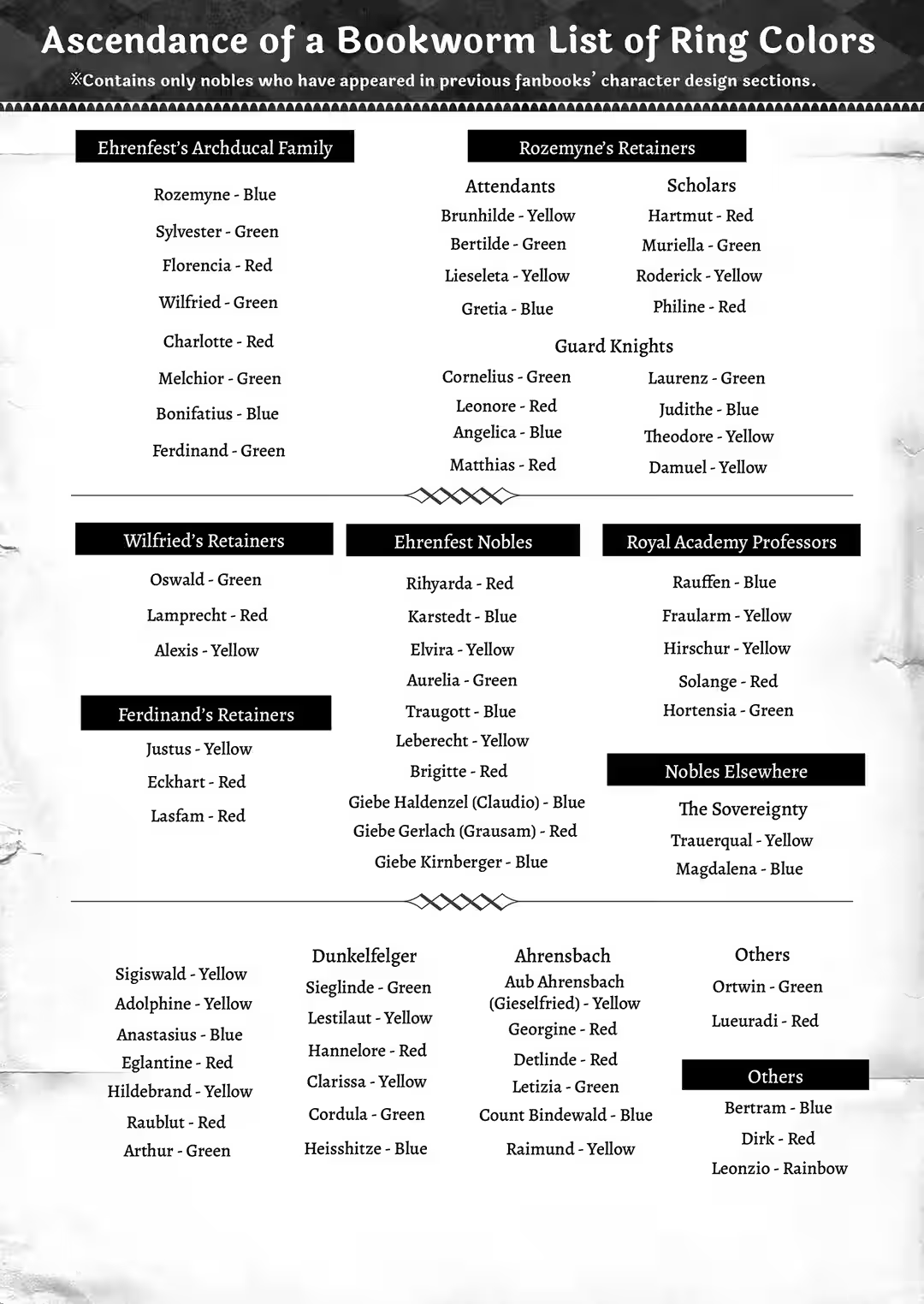
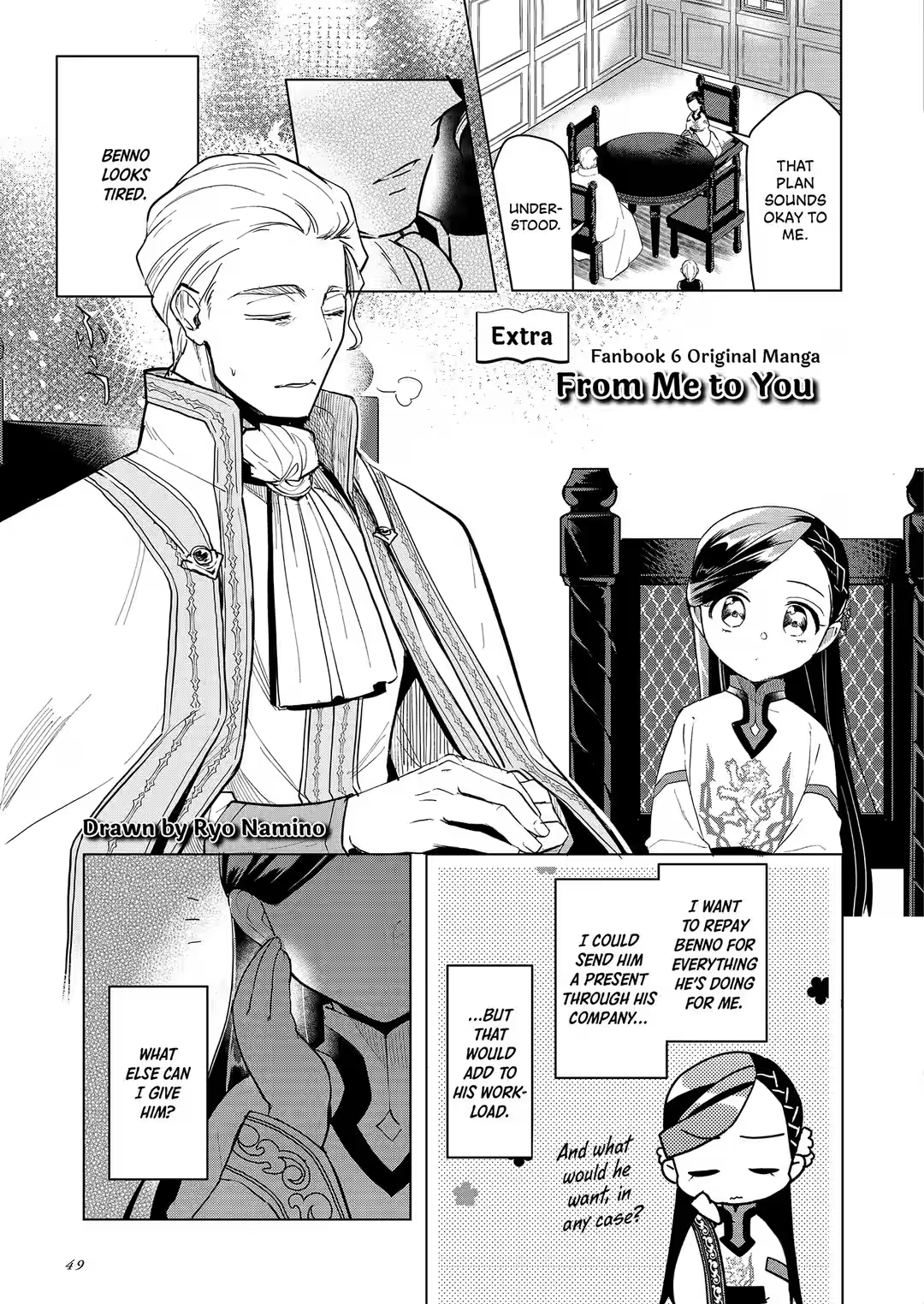
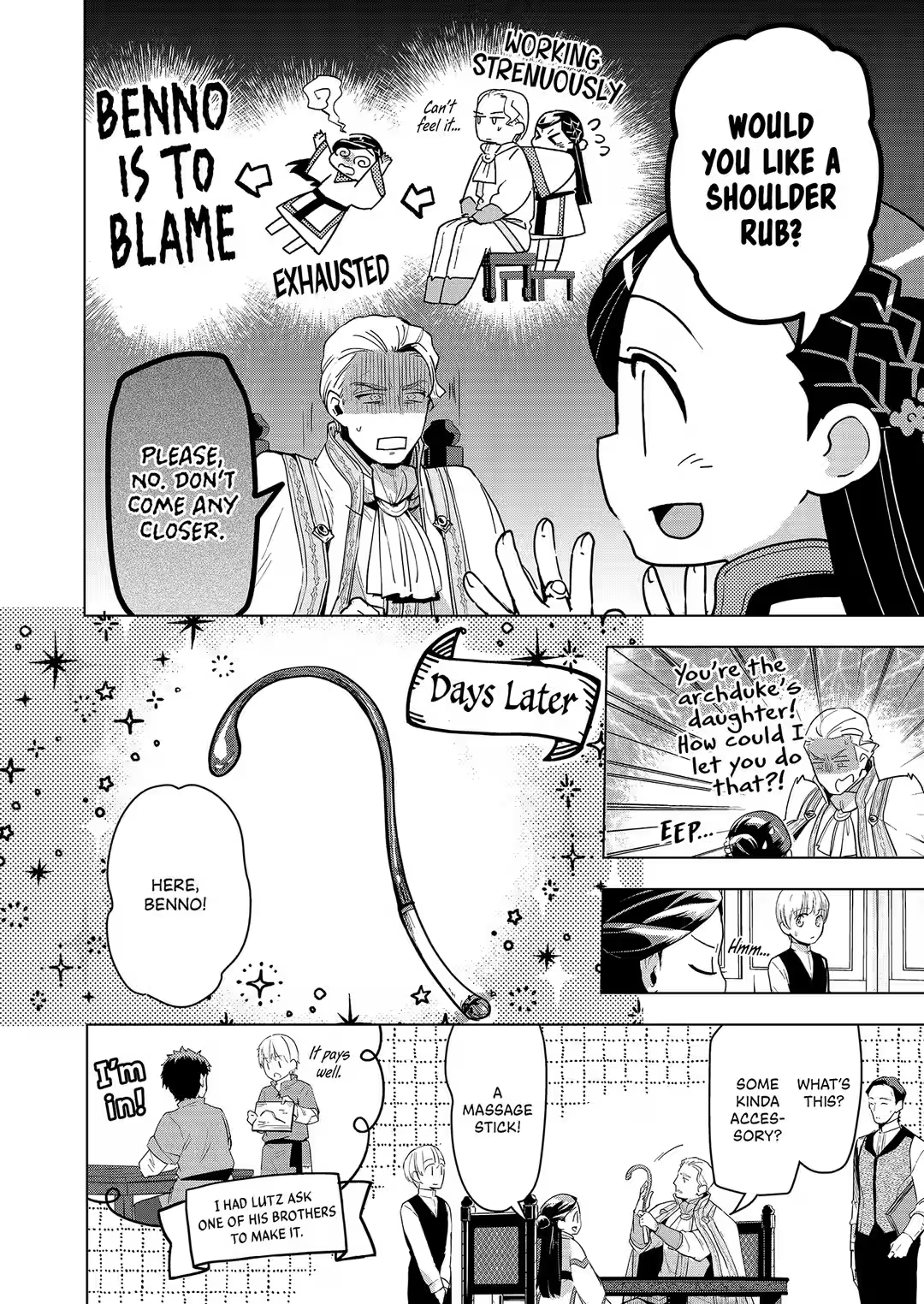
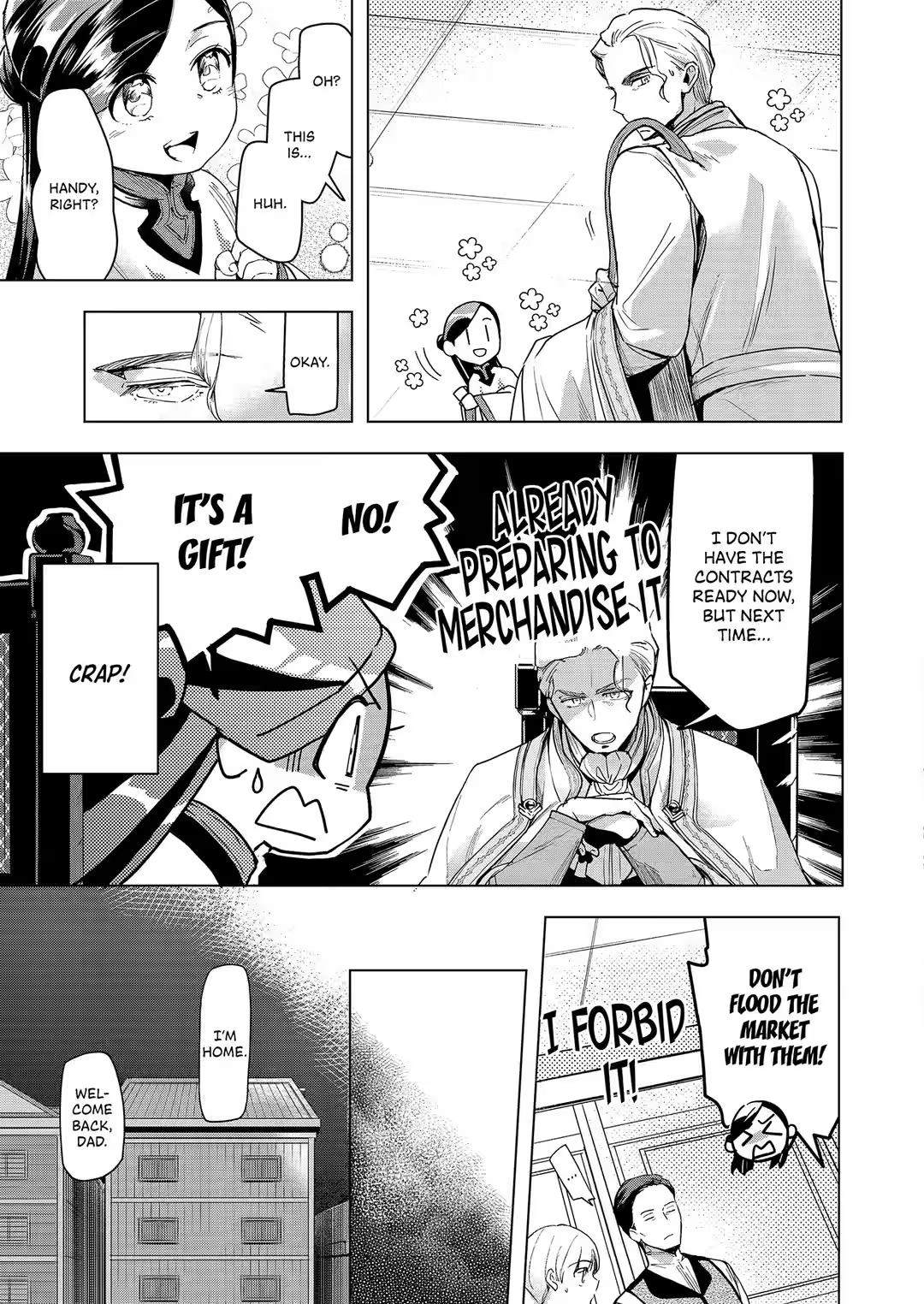
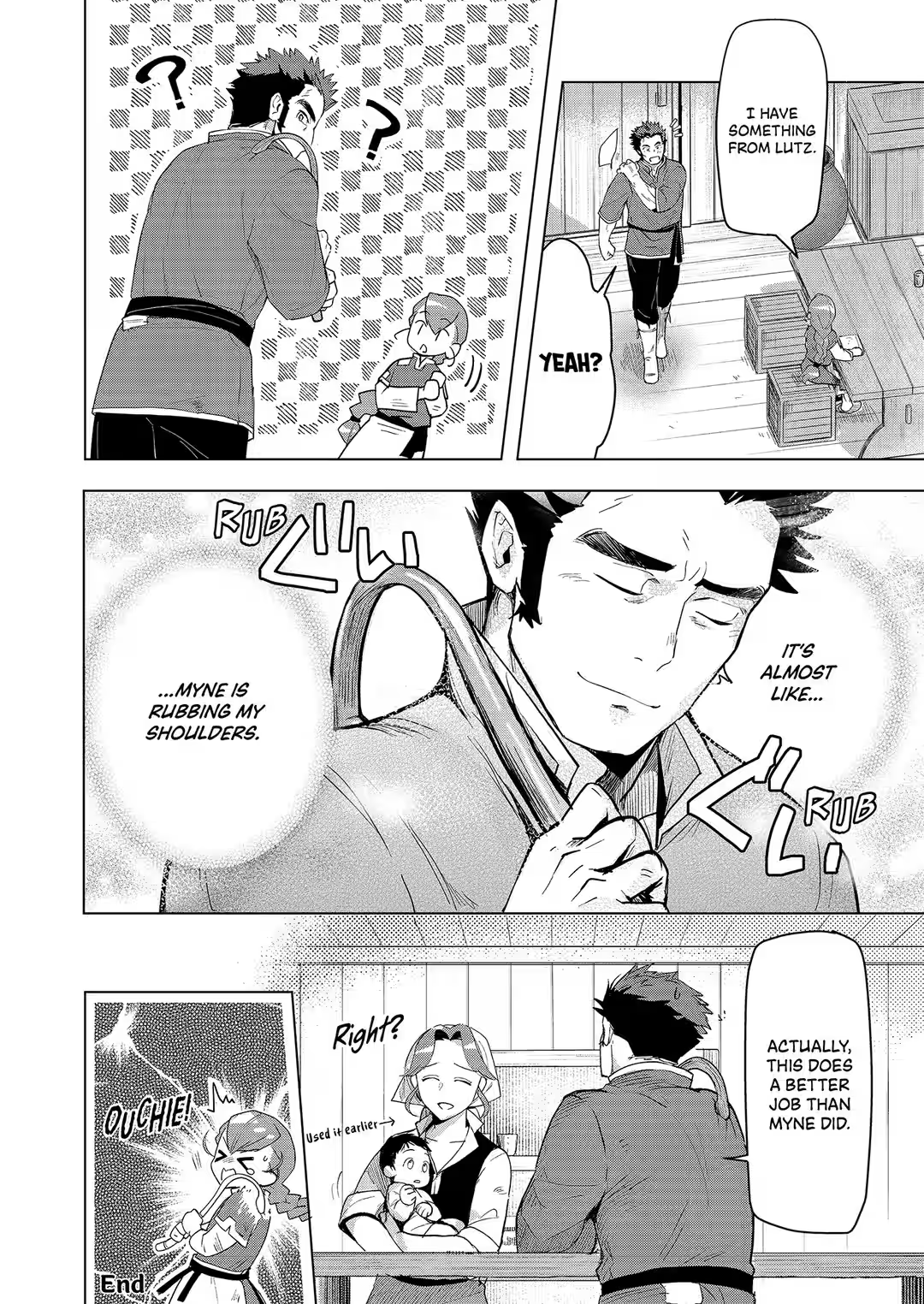
Ascendance of a Bookworm
Drama CD 2 Post-Recording Report
By Miya Kazuki
It was in January 2018 that we started recording the second drama CD. We were using the same studio as last time, but again, I wouldn’t have made it there without the guidance of my husband.
“Aah, it’s always a comfort to see how calm you are, Kazuki-san,” Suzuka-san said, as tense as before.
“Well, I already know what to expect, so there’s nothing to be nervous about. My only concern is that I won’t have anything new to write.”
“You say that, but you’re you! I’m sure you’ll write plenty.”
“Only if new things happen.”
I assumed this report wouldn’t be as lengthy... but Suzuka-san was correct. It actually ended up being longer than the last one. How strange.
Because we were using the same studio as before, I made it to the control room without issue. The sound mixer and director were hard at work preparing for the busy day ahead of us. Suzuka-san and I sat on the sofa and waited, since we had nothing to do at that moment in time.
“Good morning.”
“Kunisawa-san! At last, I made some business cards!”
No sooner had our scriptwriter greeted us than I thrust one of my new business cards in her direction, trying to replicate what I’d seen when we were working on the first drama CD. I’d very nearly forgotten to bring the cards with me, but I elected not to mention that.
“Suzuka-san, have you made new business cards?” I asked.
“Yes, but they won’t arrive until later today or tomorrow. Ah, geez! I knew you’d want to mention them in your report!”
“I’ll mention this conversation instead!”
On that note, Kunisawa-san interjected: “Since we’ve already met, it feels a little strange to receive your business card.”
As it turned out, most people only handed out their business card when they were meeting someone for the first time. In my excitement, I’d given one to our scriptwriter without even thinking. Well, whatever, I thought. It was for my own satisfaction anyway.
Once the whole team was assembled, the producer and sound director gave us a quick summary of our schedule for the day.
“As mentioned in the email regarding this drama CD, we’re breaking up today into three sessions. Those with exceptionally busy schedules will record their lines separately from the others.”
“I know exceptions are made when voice actors can’t all synchronize their schedules, but...”
I wasn’t sure whether the names mentioned in the email could or couldn’t record as part of the usual schedule. Suzuka-san was just as unsure, but the sound director cleared up our confusion with a smile.
“We listed those who can record on schedule.”
Our day had been split into three sections. We would start with only four voice actors, move on to the “main session” with most of our talent, and then close with some solo recordings.
For our first session, we had Takeuchi Shunsuke-san playing Benno, Nakahara Mai-san playing Tuuli, Asano Masumi-san playing Angelica, and Nakane Kumiko-san playing Rihyarda. Seeing only four people in a booth that had contained eighteen for the first CD made it feel so much larger than before. Each voice actor had their own mic, which they adjusted to their respective heights.
Our first scene of the day required Takeuchi-san to perform alone. The voice actors for Lutz and Rozemyne weren’t scheduled to arrive until later, so he had to pretend they were in the booth with him. Still, he did a great job at playing the straight man and unleashing Benno’s thunder when he needed to. Rozemyne wasn’t there, of course, so he had to grind his fist into the air as if she were!
These things didn’t stand out to me last time, since the characters were all together, but it was strange to see Takeuchi-san pause just long enough for Rozemyne’s parts to be slotted in. It was impressive, to say the least. In his shoes, I would have kept asking whether I’d waited long enough. Was he saying the other characters’ lines in his head, maybe?
Suzuka-san: “Even on his own, he isn’t hesitating at all, is he?”
Me: “He does this as naturally as he breathes.”
Despite being alone, Takeuchi-san spoke with as much emotion as one would expect from characters in an energetic conversation. I’ve said this before, I’m sure, but voice actors really are something else. They’re such professionals!
Because we were missing so much of our cast, there was a lot more jumping around than last time. It made it especially hard to imagine the completed drama CD. I remember listening to Benno and wanting to shout, “Hold on! Can’t we fill in all the gaps?! Someone bring in Lutz and Myne!” By the end, I was so unsure of what the finished product would be that I felt more like a reader than the author. How fun!
This time, Takeuchi-san played not only Benno but also the professor announcing the start of the Royal Academy’s new term. No wonder the academic year started with such a bang!
Benno’s voice hadn’t changed since the last CD, so his scenes progressed smoothly. Tuuli wasn’t quite as simple. Nakahara-san didn’t portray her for the first CD, and three whole years had passed since, so we needed to create the voice from scratch. Once that was done, though, we blazed through her scenes.
Suzuka-san: “Is this really the same woman who voiced Georgine? Whew... Phenomenal.”
Me: “Tuuli sounds so cute, doesn’t she?”
Nakahara-san gave a performance that couldn’t have been more distinct from her portrayal of Georgine. It was adorable. Perfect for Tuuli.
Suzuka-san: “Having read the novels, this development took me by surprise.”
Kunisawa-san: “Kazuki-sensei gave me a summary and the dialogue. It was just a matter of choosing where to put it.”
Me: “It’s something readers have been curious about for ages. I’ve received so many requests to elaborate on it, and this felt like an appropriate opportunity.”
Indeed, I’d written a new Tuuli-centered short story, “A Royal Commission,” for this CD, and I couldn’t help but grin when I heard it brought to life. I hope you’ll look forward to it!
Of course, I can’t speak about cuteness without mentioning that Nakahara-san also voices Weiss. Her “milady” is to die for. It makes me wish the two shumils were real so I could visit the library and see them with my own eyes. Oh, and she also played a music professor.
Nakane-san was as wonderful as last time. I think Rihyarda had more to say in this drama CD.
Suzuka-san: “She’s so good as Rihyarda.”
Me: “A perfect match, one could say.”
Rihyarda scolds and guides Rozemyne, being both harsh and kind. My favorite of her scenes in this CD is when she chastises Justus.
Incidentally, Nakane-san also played a music professor. Please enjoy hearing her conversation with Nakahara-san. I couldn’t tell who was who without looking at the script, but my husband managed it with ease. It was amazing.
Again, Asano-san played Angelica. Her session was fun.
Me: “Angelica’s third line on page thirteen shouldn’t be quite so dry. She’s proud, if anything.”
Suzuka-san: “So she needs to be more smug.”
Me: “That’s right.”
And with that, smug Angelica was born. I couldn’t have been more satisfied—I’d managed to work in all the lines I really wanted to hear her say.
Asano-san played Elvira as well. Her performance stood out so much from Angelica that I almost couldn’t believe both voices were coming from the same person. I particularly enjoyed the scene where Elvira gives Rozemyne a warning. It brought so many deep emotions out of me. She’s such a wonderful mother...
In an amusing turn of events, it came to light that the sound director had mistaken the old Count Leisegang for a woman and asked Asano-san to play him.
Me: “Hmm? The former Count Leisegang is a man.”
Suzuka-san: “He’s a grandpa on the verge of death, isn’t he?”
Me: “That’s right. He’s all skin and bones.”
Suzuka-san and I pointed out the mistake, and the sound director stopped Asano-san in her tracks.
Sound Director: “Sorry, but it turns out the old Count Leisegang is a man. I’ll arrange for one of the men to voice him later.”
Asano-san: “Whaaat?! But I practiced so much... Well, to be honest, I’m kind of relieved.”
Asano-san’s reaction was so cute that everyone in the control room chuckled. The former Count Leisegang only had one line, and it was meant to be part of some background chatter, so the fact that Asano-san had put so much thought into the role warmed my heart. I was touched—moved, even.
In the end, we went through the whole script with the four voice actors we had at hand. Most of their dialogue was at the start, so it didn’t actually take us that long. Before we knew it, they were done, and those booked in for the main session were getting ready to take over. It was during this brief crossover period that photos of the voice actors were taken, and those from the morning session had a chance to get Suzuka-san’s and my signatures.
In no time at all, the corridors were full of people, so Suzuka-san and I waited patiently in the control room. There wasn’t much time for tea or anything extravagant, since we had so much content to get through, so we snacked on Pocky instead.
“Good work.”
“Your performances were excellent. Thank you.”
Once we’d said our farewells to the voice actors from the first session, it was time to move on to the second. This one involved a lot more people. The sound director started by assigning someone new to voice the former Count Leisegang.
“Forgive me for making such a sudden and unreasonable request, but we need one of you to play the role of the previous Count Leisegang. We’d given it to Asano-san, but that was before we found out the character was a man.”
“Can you even call it a role?” asked Sawashiro Miyuki-san, the voice of our resident bookworm, while thumbing through the script. “He only has one line.” Her tone and attitude were so close to Rozemyne’s that those of us in the control room had to laugh.
So, who ended up voicing the former count? During the previous CD, Date Tadanori-san had shown us all that he could play an older man through his performance as the High Bishop. But with so many male voice actors this time around—Majima Junji-san as Justus, Kikuchi Tatsuhiro-san as Mark, and Hamada Youhei-san as Otto, to name a few—maybe it was someone else’s time to shine.
“Sakurai-san, if you would.”
In a shocking twist, it was Sakurai Takahiro-san, our voice actor for Ferdinand, who had to meet the sound director’s sudden demand.
“What?!”
Suzuka-san and I were just as surprised as he was. Our calm, collected Ferdinand voicing a chattery old man about to climb the towering stairway? Even now, I can barely believe it.
Sawashiro-san: “An old, withered grandpa... I guess it’s time to channel Shimura.”
Sakurai-san (chuckling): “I can’t go that far.”
I couldn’t wait to see what kind of old man he’d create, and the voice he came up with sounded very withered indeed. The former Count Leisegang had only a single line, remember. See if you can pick it out from the rest! I certainly won’t be able to.
Once that was done, we moved on to our first big scene. Sawashiro-san, voicing Rozemyne, and Date-san, voicing Fran, moved to stand in front of their mics. Fran had just one thing to say—the rest was Rozemyne all on her own. She cried out in pain from Benno’s noogie, without Benno actually being there, then cried and clung to Lutz.
Sound Director: “Really take your time with that crying section.”
Sawashiro-san: “Right... Bwehhh! Luuutz!” (She cries for a bit.)
It was amazing how smoothly she transitioned from one emotion to the next. I would never have guessed she was performing on her own.
From there, we moved to the castle. Kikuchi-san, the voice of Mark, opened the scene with his performance as a scholar. Damuel (Tamaru Atsushi-san) and Cornelius (Yorita Natsu-san) also made an appearance, although Damuel didn’t have much to say. I felt bad for depriving him of the spotlight once again, but there was no helping it, since he’s an adult who can’t go to the Royal Academy.
Yorita-san did a fine job of playing a slightly older Cornelius.
Sawashiro-san: “Should we not add some dialogue before this part? It’ll seem like Angelica is getting ignored otherwise.”
I went over the script and found that she was right. We would need a better way to transition from Angelica’s line to the next part of the scene.
Kunisawa-san: “How about ‘What a relief’ or ‘That’s nice to hear’?”
Me: “I’d rather keep it more ambiguous. ‘Oh, right...’ or something. Less relieved—more exasperated.”
Kunisawa-san: “In other words, something that captures the feeling of Damuel shaking his head and turning to face Cornelius.”
Me: “Oh, that’s a good way of putting it.”
The sound director conveyed our thoughts to the voice actors, and the scene was redone. It ended up all the better for it. Listening to Sawashiro-san and Sakurai-san argue as Rozemyne and Ferdinand was just as pleasant as before.
Producer: “That last line sounded particularly aggressive, don’t you think?”
Me: “That’s fine. The stronger the emotion, the better Rozemyne’s desperation comes across.”
The scene then moved to the Royal Academy. Tanaka Atsuko-san voiced the indomitable Hirschur—a great choice, I thought. I remember looking her up when she was first chosen and thinking that even her photo resembled the character. She really exuded the aura of someone sharp and capable.
Producer: “How was that?”
Me: “Hmm? Seemed totally fine to me.”
Kunisawa-san: “Making the voice sound just a touch older might suit the character better.”
So nuanced was the change that I couldn’t even hear it during the test run. The end result was a little better, though, so I concluded that Kunisawa-san knew best.
Tanaka-san’s take on Hirschur had a no-nonsense, dead-serious attitude. For a moment, I considered asking if we should make her more playful, but I quickly decided against it. She was giving a report, and she had no reason to take a light tone with Ehrenfest at that point in the story.
Kikuchi-san’s scholar passed along Hirschur’s report, and the guardian trio agonized over the professor’s message. Well, two of them did—Toriumi Kohsuke-san was booked in for the later session.
Suzuka-san: “Bleh... I wish we could have seen them all together again.”
Me: “So true. I guess we have no choice but to wait for the finished product.”
The back-and-forth between Karstedt and Ferdinand was excellent, but it was still such a shame that the trio was incomplete. Thinking about how great it would have been with Sylvester there too was maddening.
Hirschur’s report contained snippets from other characters at the Royal Academy. Yorita-san played Brunhilde, Hasegawa Nodoka-san (who voices Florencia) played Fraularm, and Date-san played Rauffen. They each had only one line, but they really brought their characters to life. I couldn’t help but laugh.
Hasegawa-san also played Solange. The good-hearted librarian had enough dialogue that we really had to perfect her voice, which was no easy feat. On her first attempt, Hasegawa-san sounded too sharp and pushy—a carryover from Fraularm.
Sound Director: “How was that?”
Me: “A bit sweeter...”
Kunisawa-san: “A bit older.”
Suzuka-san: “Professor Solange is meant to be kindly, right?”
Several tweaks later, we ended up with the voice we were looking for.
Rozemyne, Cornelius, Wilfried, and Angelica had some excellent exchanges—but with Wilfried and Angelica both missing, they ended up kind of all over the place. The same went for Rozemyne’s interrogation at the hands of the guardian trio. The fun dialogue made Sylvester’s absence all the more upsetting. I can’t wait to hear them all together.
For our next scene, we had a conversation in the orphanage director’s chambers with several characters from the lower city. Benno’s lines had already been recorded, leaving Rozemyne, Otto, and Gustav to perform the rest. Hamada Youhei-san played Otto, while Date-san played Gustav. The first step was to decide on their voices.
Sound Director: “Any thoughts on Otto?”
Kunisawa-san: “He should sound a little older, I think.”
Me: “And more breezy.”
Suzuka-san: “Yeah, I agree. A bit more casual.”
We pooled our ideas and decided on a prompt: “A breezy merchant who acts like a con man.”
Producer: “How about Gustav?”
Suzuka and me: “He sounds like the former High Bishop.”
Sound Director: “I suppose they are roughly the same age.”
The sound director requested a new voice, and Date-san delivered. He never ceased to surprise me.
Kunisawa-san: “Isn’t that a little too young?”
Me: “I don’t think so. Gustav’s still active in his work, unlike the former High Bishop.”
Once the voices were sorted, it was time to record. I noticed that Date-san had far more lines as Gustav than as Fran. I guess Justus took over most of Fran’s dialogue...
We wrapped up the conversation in the temple and then took our one and only break of the session. It was the perfect time to have lunch, use the restroom, and so on. Otherwise, we holed up in the control room while the voice actors stood in the booth and recorded for hours on end.
I bumped into Yorita-san in the restroom, and she told me she’d read my last post-recording report. She said she was absolutely overjoyed that I’d written so much about actors playing multiple roles. I was glad to hear her thoughts.
As I understand it, reports of this nature don’t normally say much about voice actors’ secondary characters. Even the producer and sound director were shocked to see me buck the trend. It’s strange, really—the actors work just as hard on their smaller roles, so why not mention them? They might have fewer lines, but that doesn’t mean I’m any less grateful. Hopefully that comes across in this report.
On my way back to the control room, I poked my head into the booth. Hasegawa-san and I are mutuals on Twitter, so I wanted to greet her, but she was going over the script with such great intensity that I thought it best not to bother her. Others were scarfing down food, hanging out, and preparing for their next roles. Everyone had a preference for how to spend their downtime.
There was a moment during the break when Hamada Kenji-san—whom I expected to be busy—approached me with a question about a euphemism. He was very apologetic, but I always appreciate it when voice actors come to me with queries or ideas to improve the finished product. They’re way more informed than I am when it comes to knowing what sounds best.
Once our break was over, we focused on scenes involving actors with other places to be. Otto’s bit part had to be postponed as a result.
Hamada Kenji-san played another of this drama CD’s scholars—a noble who looked down his nose at commoners. Even just speaking with Sylvester, he made the role his own.
There was a moment when Sawashiro-san, our protagonist, had to say “technical fee.” She had such a hard time with it that I tried to think of another way to phrase it, but the session ended before anything came to mind. Aah, my vocabulary...
You can try saying it yourselves, if you want. Gijutsuryou!
Cue a change of scene, and another new voice to choose. Come forward, Majima Junji-san, our new Justus!
Sound Director: “How was that?”
Kunisawa-san: “He needs a more teasing tone. Justus has a casual air about him.”
Sound Director: “Hmm, okay. How about now?”
Me: “That was too casual. Or maybe too impish. Justus is relaxed, but he’s still a noble.”
Justus is such a hard role to play. He has this light, kind of mocking attitude but also never acts out of character for a noble. He’s also the kind of weirdo who sneaks into women’s tea parties for the sake of gathering intelligence.
Me: “Oh, that’s closer.”
Kunisawa-san: “Putting how he acts aside, he should sound a touch older.”
From what I gathered, Kunisawa-san and I had somewhat contrasting images of Justus, which made it hard for Majima-san to satisfy us both. Still, he succeeded, and I’m glad that he did. It was fun hearing him brush aside Rihyarda’s criticisms.
Hasegawa-san voiced Florencia for the previous CD, and she had no trouble reprising the role. She captured the emotions of a worried mother perfectly.
The last voice we had to sort out was Mark’s. For his first attempt, Kikuchi-san adopted the role of an energetic merchant.
Me: “That’s not it. Mark is a wonderful gentleman.”
Kunisawa-san: “He’s quite reserved. Think about how a butler would speak.”
Suzuka-san: “He needs to have a kind, gentle demeanor.”
Me: “That’s right. A superb gentleman must exude grace.”
Despite my insistence that Mark was a gentleman, the sound director only shared Kunisawa-san’s and Suzuka-san’s comments with the booth. I couldn’t understand why—my instructions were the clearest of them all.
From there, we moved on to the climax of this drama CD: Rozemyne, Benno, Lutz, and Mark all coming together for a heartfelt conversation. I couldn’t reach the end without tearing up. It was so moving that I didn’t even have time to think about how cute younger Myne sounded in the flashbacks.
Oh, Lutz! How I wish you were here!
I wanted to shout at the top of my lungs. It was such a wonderful scene, but Myne and Lutz had to record their parts separately. My kingdom for the completed CD!
Going into the studio, I certainly wasn’t expecting to end up this impatient. Even as I write this, I can’t bear to wait. Grr...
This CD’s epilogue involves Rozemyne, Ferdinand, and Justus—and the somber tone of the previous scene returns in full force. Who in the world wrote such an emotionally devastating exchange? On the bright side, it also includes two highly sought-after words of praise from our stoic High Priest, which we weren’t able to include in the last CD. Not to toot my own horn, but good job, me!
Editor: “How was that, Kazuki-san?”
Me: “That ‘very good’ wasn’t good enough! More praise!”
Suzuka-san: “You sure seem invested in this part.”
Me: “Of course! This is the ‘very good’ scene!”
Suzuka-san: “I mean, I understand that, but...”
The sound director passed along my request for a kinder “very good,” and Sakurai-san went above and beyond. He did such a fine job, in fact, that I remember gasping and clapping a hand over my mouth. It was almost lethal. If you’re a fan of Ferdinand, rejoice! Listen to his praise and feel your knees go weak! Mine certainly did.
My excitement aside, it really is a touching scene. Ferdinand recreates the praise his father gave him—a huge contrast to his usual apathy when speaking with Rozemyne.
Next, we had to record some background noise—chattering crowds and the like. The first-years needed to gasp in shock when Rozemyne doubled down on the Better Grades Committee and shout “Understood!” when called upon.
Sound Director: “I’ll ask the women to play the first-years.”
Kunisawa-san: “Are all the first-years girls?”
Me: “No, some of them are boys. Most of them, in fact.”
Sound Director: “Even so, the female cast will play them.”
Kunisawa-san: “There’s only four of them, though.”
And yet, they voiced seven first-years. Sawashiro-san let out an exclamation that rang out clearly above the noise—both cute and perfectly fitting for someone voicing Myne.
Once the last bits of dialogue had been recorded, Sakurai-san practically leapt out of the booth. There wasn’t even time to speak with him; his manager had to greet us in his place. It must be tough being in such high demand. I’m so glad we got him to play Ferdinand.
As everyone else was preparing to go home, Toriumi-san (Sylvester) finally arrived. I couldn’t help thinking that I’d feel pretty tense in his shoes.
Hamada Youhei-san (Otto) found it especially hard to match the pace of a section Nakahara-san (Tuuli) had recorded earlier in the day. It was one of those classic Bookworm greetings that goes on for a really long time. Imagine having to say it from start to finish without a single pause or stumble. What a nightmare!
It was the mixer’s job to make sure that separately recorded parts aligned seamlessly in the final product. Otto’s scene with Tuuli was one such example.
Mixer: “That part didn’t match up. It was a bit too fast.”
Sound Director: “Otto, can you say ‘Ewigeliebe the God of Life’ a little slower this time? Right... How about that?”
Mixer: “Hmm... It’s still not right.”
They tried again and again until it was perfect. We didn’t need to worry about timing in the main session because all the voice actors were present, but watching Hamada-san taught me just how tough it can get. It also taught me how great voice actors are at making things work.
Overall, I suspected that the voice actors who’d recorded first were the lucky ones. Good work, Hamada Youhei-san.
Hamada-san departed, and we entered the last stretch of the day: the solo performances. If the booth had looked empty with four voice actors, it looked practically deserted with Toriumi-san on his own. It was a sorry sight when there had been ten or so people in there not long before.
Still, the actual session went exceptionally smoothly. He had played the role of Sylvester in the first CD, so we didn’t need to work on his voice, and there were barely any retakes, so we wrapped up his scenes in just a quarter of an hour. What a pro!
Toriumi-san: “Good work, everyone.”
Suzuka-san and me: “Yes, good work.”
Toriumi-san gave a breezy farewell, and then he was gone. It all happened so quickly that I couldn’t believe it. He was amazing—no one could deny that—but I still wished I could have seen him perform alongside the other voice actors.
Subsequently, we had an hour to spare before the next voice actor would arrive. Kunisawa-san decided to stretch her legs while my editor went off to make some work-related phone calls. As for Suzuka-san and me, we passed the time with some pleasant conversation. Oh, and we signed a few things as well. Suzuka-san even added some cute little drawings. It was strange to see my name next to the signatures of genuine voice actors.
As our break came to an end, we moved from the big booth for a dozen people to a smaller one meant for solo performances. I was told they were commonly used to record audiobooks and the like. Kohara Konomi-san arrived shortly after to voice Charlotte. She adjusted her mic, positioned everything she needed, and got straight to work.
Kunisawa-san: “Could she sound a little younger?”
Sound Director: “Two years have passed, so I don’t think that’s necessary.”
Me: “She should sound a bit older than Rozemyne this time, so yeah, I think this works as is.”
We concluded that the voice was fine and continued. Charlotte didn’t have much of a role this time around; instead, Kohara-san spent most of her time playing Schwartz and Corinna.
For the adorable shumil, the sound director requested a somewhat robotic voice. Kohara-san nailed it right away and even gave an exceptionally cute “milady.” I wondered how I would ever tell Schwartz and Nakahara-san’s Weiss apart.
Then we moved on to Corinna. Kohara-san’s first attempt was bouncy and fairly energetic.
Kunisawa-san: “Do you think she’s leaning too heavily into the ‘merchant’ aspect of the character?”
Suzuka-san: “Corinna should be kind and gentle, right?”
Me: “She had a fairly rich upbringing, so yes, a gentler tone would suit her best.”
A few tweaks later, we had a Corinna who was tender and reserved. It was such a good performance that I could tell exactly why Otto fell in love with her.
Once we’d parted ways with Kohara-san, Horie Shun-san arrived to play Lutz. I can’t quite explain it, but there’s something about the way he carries himself that’s undeniably endearing. He jumped right into a conversation with Benno, for which Takeuchi-san had already recorded his part. Even perfecting the timing of a short response like “Understood!” proved surprisingly tricky.
Sound Director: “You’re in the castle, in the presence of the archduke. Try to be a little more reserved.”
Horie-san: “Ah, right. Reserved. Reserved... Understood.”
I thought his personal pep talk was so cute.
Lutz was around five years old in Part 1, so his voice in the flashback scenes needed to reflect that. Switching between that and present-day, eleven-year-old Lutz must have been a challenge.
Horie-san also played Hartmut this time around. He had only one line—but that still meant he needed a voice. And as a result...
Sound Director: “How was that?”
Me: “Lutz has gone insane...”
Kunisawa-san: “Kazuki-sensei...”
Suzuka-san: “Keep it constructive!”
Kunisawa-san and Suzuka-san both laughed, but that was genuinely how I felt. My first thought was “Lutz would never say that!”
Horie-san: “Ah... Did that sound too much like Lutz?”
Sound Director: “Yes. Try a different voice.”
“A different voice”? It was such a vague request that I sat pondering what it even meant. Horie-san must have known the answer, because he tried again without missing a beat. Hartmut sounded a little drunk, I thought.
Sound Director: “How was that?”
Me: “Just fine. We can move on.”
Next on our schedule was more background noise. The scene for which we needed it involved everyone in the family having fun together, which meant Horie-san had to laugh on his own for a bit. It made me want to cheer him on. “Stay strong!” or something of the sort.
I understood why we couldn’t record the background noise with everyone together—each voice actor had their own schedule to work with—but I still wished we could have found a way. It was kind of sad to see one person doing it alone.
Horie-san: “Good work. Oh, and congratulations on winning Konorano (This Light Novel Is Amazing!).”
Me: “Hmm? Ah, thank you. You have something else to record now, right? Good luck.”
I ended up becoming Twitter mutuals with Horie-san shortly after. By this point, I have a pretty respectable grasp of both his and Hasegawa-san’s schedules.
After the last drama CD, I was motivated to follow every voice actor we worked with on Twitter—but I stumbled at the very first hurdle. I searched for Sawashiro-san, only to find a flood of parody accounts using her name. I wasn’t sure I’d be able to find the real one—or if she even had a Twitter account—so I decided to wait and see if she might comment on any of my tweets.
The last voice actor to arrive was Fujiwara Natsumi-san, who came to play Wilfried. She’s a woman, but she’s pretty cool and tough, so to speak. She even responded to each instruction with a sharp “Understood!”
Fujiwara-san knew how to voice Wilfried from the first CD, so when the sound director asked if she could make him sound a bit older, she adapted right away. As with the others, the hard part was trying to match the dialogue that had already been recorded. The short lines were tough, but the long ones—such as Rozemyne’s greeting—were positively brutal.
Fujiwara-san: “Sorry, how do I pronounce this? Evi? Ewi?”
Sound Director: “Ewi.”
Mixer: “Um, could you pause for a moment after you say ‘bless’?”
Fujiwara-san: “Pause for a moment... UNDERSTOOD!”
The length of the pause and the time it took to say Ewigeliebe’s name varied from person to person. You also had to watch people’s mouths for when they took a breath. The mixer really had to go all out to make every single tiny discrepancy match.
Next, Fujiwara-san had to record some lines for one of the background students. Her voice was so cute that my heart almost skipped a beat. It was hard to wrap my head around the fact she had played a boy mere moments before.
At the end of the session, I went to the restroom. On my way back, I crossed paths with Fujiwara-san as she prepared to leave. We had a brief conversation.
Me: “Good work.”
Fujiwara-san: “Ah, thank you. You too.”
Me: “You know, I saw a lot of comments praising your work on the last drama CD. They said your voice was a perfect match for Wilfried.”
Fujiwara-san: “Really?! YAY!”
She celebrated with a fist pump. It reminded me so much of Wilfried that I couldn’t help but smile.
And with that, our work on the second drama CD came to an end. This one took longer to record than the last, but everyone—the voice actors and the studio—worked so exceptionally hard on it. I can’t wait to see the finished product.
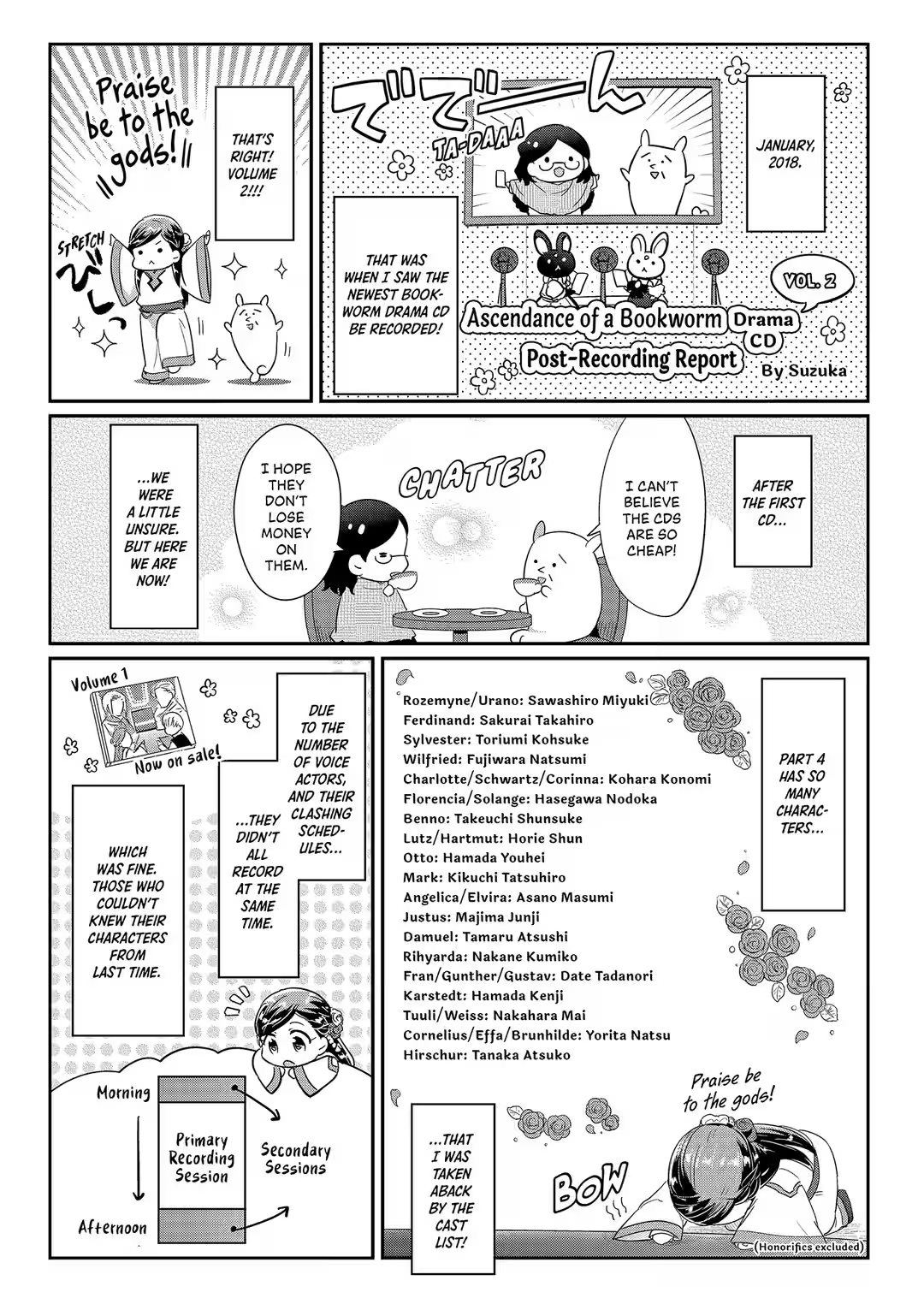
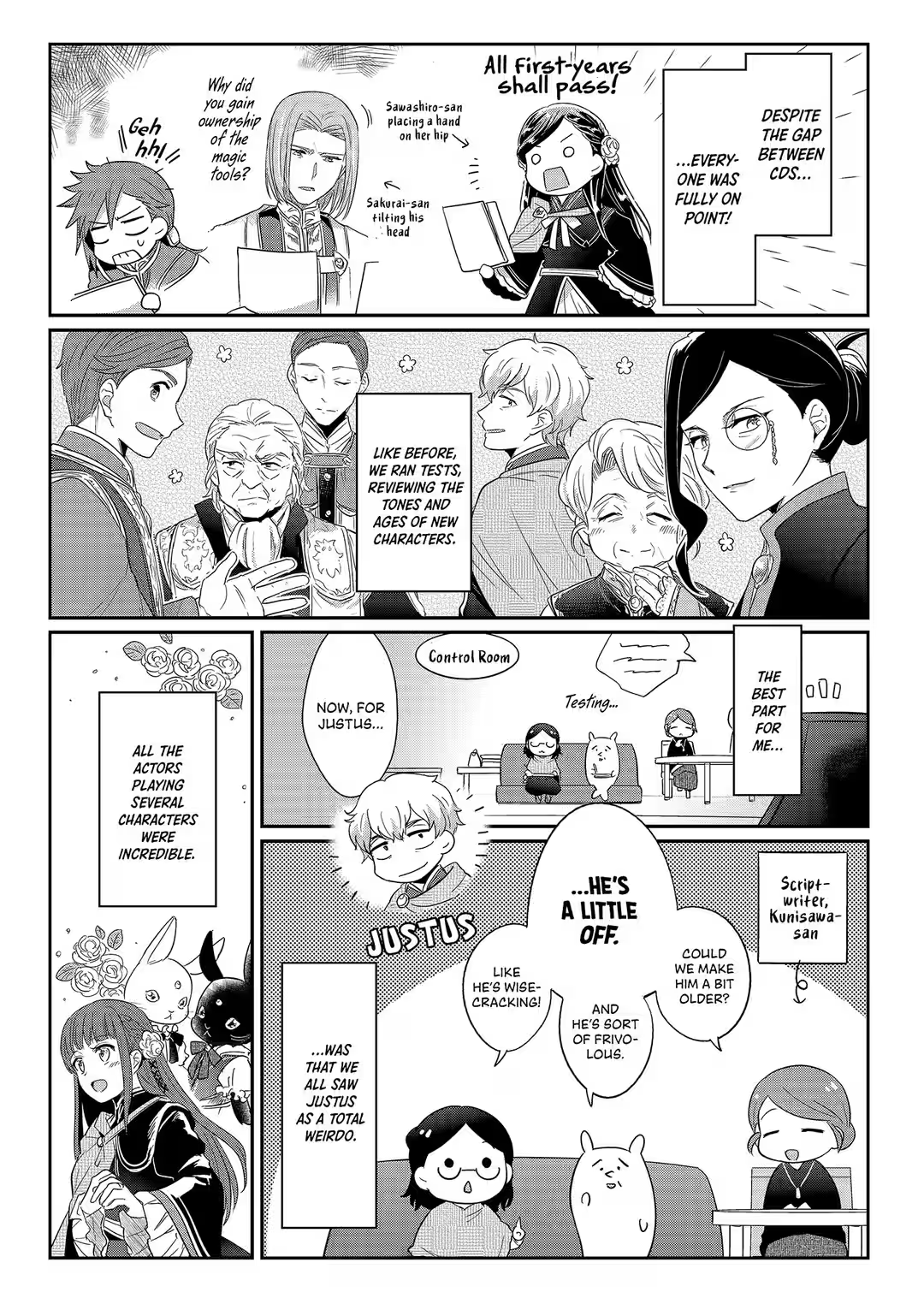
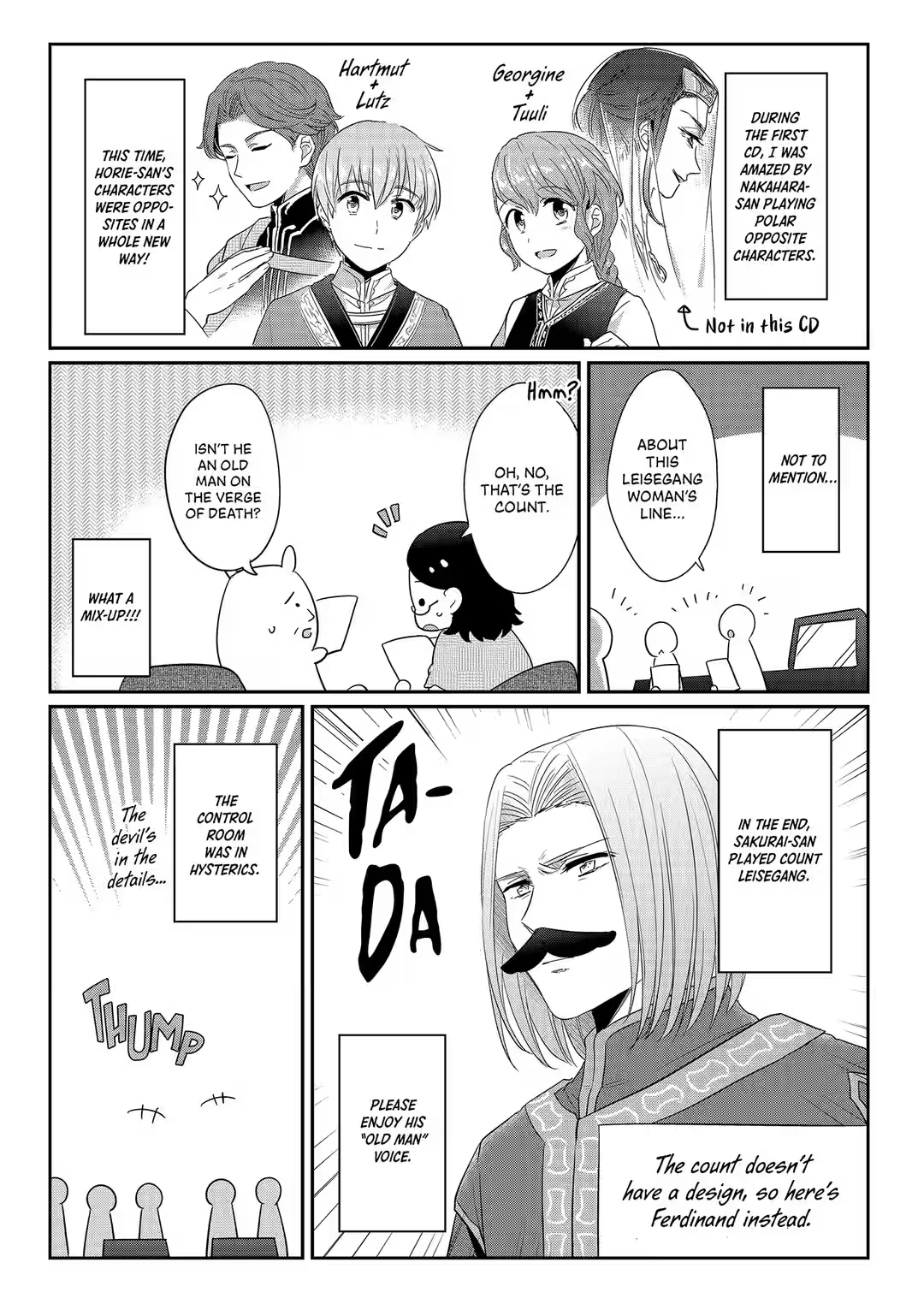
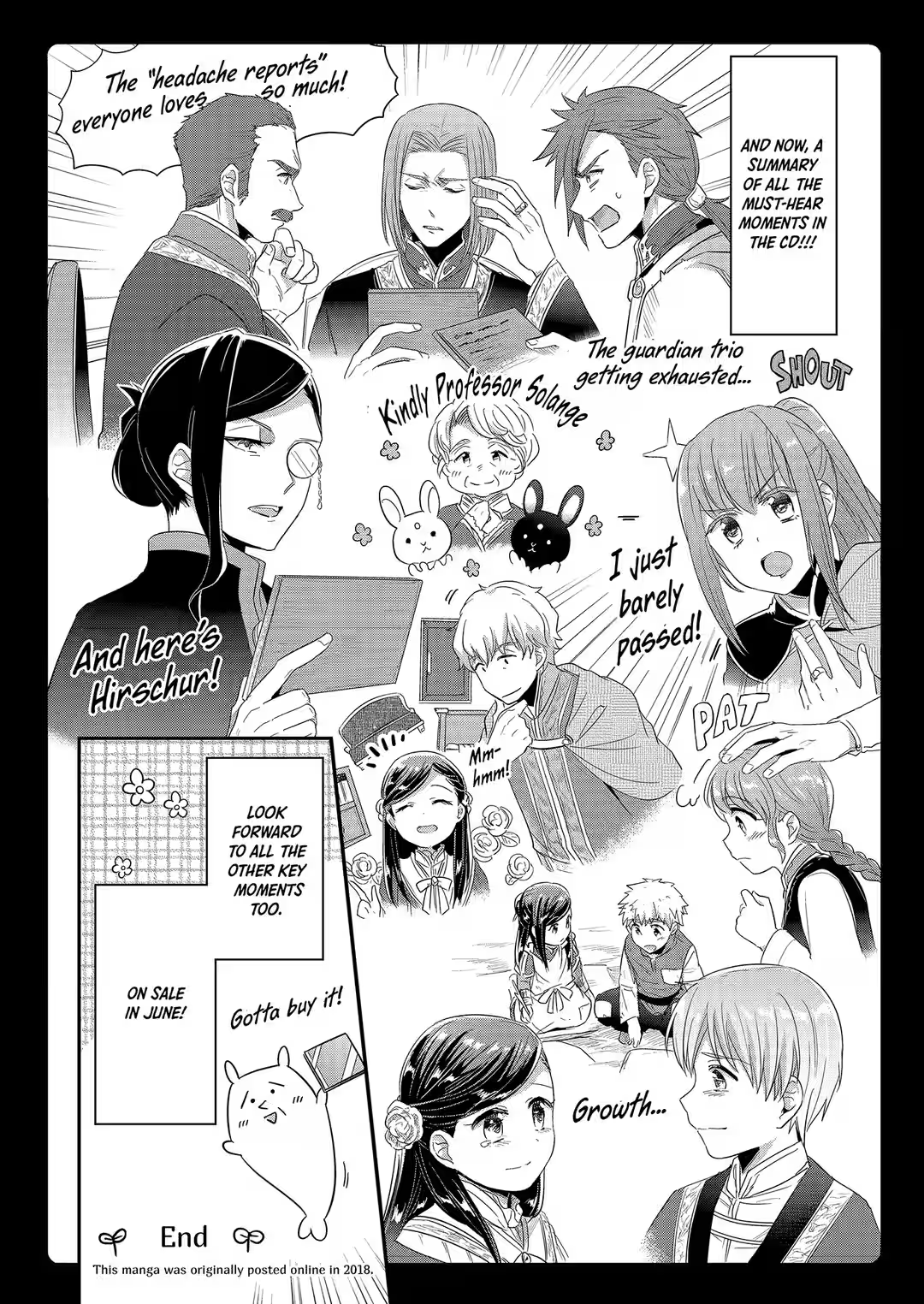
Ascendance of a Bookworm
Drama CD 5 Post-Recording Report
By Miya Kazuki
On a particular day in 2020, I attended the recording of the fifth drama CD. We had originally scheduled the session for earlier in the year, but the coronavirus situation forced us to postpone it. Many of our anime recording sessions were outright canceled. It was only when the restrictions began to ease that we were finally able to record the CD—on the condition that we worked with only one voice actor at a time.
Because we were still trying to avoid mass transit, my editor drove me to the studio. He had started driving a lot more around the time of the coronavirus and insisted that traffic was slowly returning to normal. It felt strange seeing so few advertisements along the way—so many shops were closed, and there were so few people wandering around that I suppose there was no need for them. Billboards that had once been covered with imposing ads were now completely blank.
Even when the state of emergency ended, many stores remained empty. Safety would come slowly, and the arrival of second and third waves seemed inevitable.
The city wasn’t quite so deserted by the time we arrived at the studio, but it still felt eerie. We sanitized ourselves before going inside—there were disinfectant sprays everywhere.
“They sure are being careful, aren’t they?”
“Indeed... We don’t want an outbreak here.”
As I mentioned, we had arranged to work with the voice actors individually. Before each one arrived, the studio was fully ventilated and disinfected. And for the sake of social distancing, only those who absolutely needed to be in the control room were allowed inside.
Manning the equipment at the front of the control room were the sound director, the recorder, and the recorder’s assistant. My editor and the scriptwriter, Kunisawa-san, sat with me at the back. A room that had previously contained over a dozen people now held only six.
Of course, I say that those of us at the back were sitting together, but there was plenty of space between us. Two of us sat in the corners, and the third person sat between them. Classic social distancing. I could appreciate why we were doing it and understood that it was necessary, but it still made me feel a little isolated.
“Kazuki-san, could we ask you to sign these? Put the title here, and your signature here.”
We’d set out early that morning, which meant we’d arrived at the studio much sooner than expected. I signed various papers while we waited for the rest of the staff to arrive. They trickled in just as I was finishing up.
“Work on the anime should start soon, shouldn’t it?” I asked. “Has that also been delayed?”
“We’ve started, but it’s slow going...” the recorder explained. “There’s no way we can keep to our previous schedule—what used to take half a day now takes as long as two. The acoustics are also a problem. We’ve even tried running a curtain between two mics so that two people can record at once.”
“The echo must be a headache to deal with.”
“Yeah, but we’d run out of time otherwise. That’s what makes it so hard.”
It was a tough time to be making anime, and things weren’t going to return to normal anytime soon. We could only hope the second and third waves wouldn’t make the situation worse.
While the others prepared to record, I went over future plans with my editor and minor errors in the script with Kunisawa-san.
In addition to the script and cast list, we had received a strict schedule for the day and a breakdown of all the background noise to be recorded. The team was doing everything in their power to keep things running smoothly, even when we could only accommodate one voice actor at a time. It was the work of veterans with plenty of experience.
I’d seen quite a few sessions where voice actors recorded alone, but this was the first time I’d seen it done that way from the start. It was a pretty interesting experience—and it gave me the chance to really soak in each voice.
Kobayashi Yusuke
The first person to record was Kobayashi-san, who voiced Eckhart, Kenntrips, and Middle-Duchy Knight B.
Kobayashi-san had played Eckhart twice before—and once again, the character had very little to say—so he breezed through those lines in no time. Kenntrips, however, was a new character: an apprentice scholar serving Lestilaut who appears in the epilogue of Part 5 Volume 1. Although he plays a crucial role in the Hannelore spin-off series, he seldom appears in Bookworm proper.
“This is my first time playing Kenntrips,” Kobayashi-san said. “Can you tell me a bit about his character—maybe his personality or how he acts?”
“Um, he’s kind of two-faced in the sense that he seems harmless, even while he’s scheming underneath. But at his core, he’s an honest guy—duplicitous but sincere. Also, he’s Lestilaut’s cousin as well as his retainer, so they should interact more casually.”
Kobayashi-san tried out a voice, and Kunisawa-san and I crossed our arms in thought. He was close, but not quite there. Something was off, though we had trouble putting it into words.
“He sounds a little too childish, don’t you think?”
“Yeah. The actual voice is great, but he should sound more calm and mature.”
Though our instructions weren’t the clearest, Kobayashi-san knew exactly what we meant. What a pro! He delivered a version of Kenntrips with plenty of room to grow in future installments.
With another voice locked in, we took a moment to review the script.
“Kenntrips has a lot of dialogue here. Could we give some of his lines to Lestilaut?”
I thought back to the epilogue of Part 5 Volume 1 and said, “Sure. I don’t see why not.”
From there, we moved on to Knight B. He was only a minor character, but the voice Kobayashi-san provided made both Kunisawa-san and me widen our eyes.
“He sounds like a grown man.”
“The middle-duchy knights are all students, so please use a voice that suits a fourteen- or fifteen-year-old. Only the Sovereign knights are adults.”
“What? Students?!” our voice actor exclaimed. “Wow... I wonder how Knight A’s going to manage.”
Kobayashi-san had no trouble producing the voice of a teenager, but the sound director seemed worried. Apparently, Knight A had been assigned to Inoue Kazuhiko-san.
Next, we worked on some background noise. This can include everything from a chattering crowd to sharp inhales. Several people usually record them together, but of course—the coronavirus. Maybe it was just business as usual for a professional voice actor, but hearing a single voice instead of a crowd was so strange to me. No matter how hard I tried, I couldn’t imagine the finished product.
“Please shout ‘Geteilt!’ as shown on page X. Others will reference it later. Oh, and please shout ‘Heave!’ as well.”
“Understood. Um, how do I pronounce that first one, again?”
“Ge-teilt.”
In short order, Kazuhiko-san provided the exclamations we needed. We planned to show his “Geteilt!” to the other voice actors to teach them how to pronounce it.
“Page X, line Y—using any voice you please. Go ahead and—”
“Wait. Kenntrips is there too, so maybe it should come from him.”
“Sure. On second thought, can you speak in Kenntrips’s voice?”
And that was that. Kenntrips was added to the gasping, chattering crowd. I don’t mind if no one notices—what matters is that he’s there.
Despite recording three characters and some background noise, Kazuhiko-san finished within the time we had scheduled for him. He signed a few things and then went on his way.
“Good work.”
Hayami Show
Next up was Hayami-san. He’s a veteran—and perfectly used to playing Ferdinand by now—so we didn’t have any trouble. It certainly helps that we don’t have to think about how his voice should change over time, as we do with so many of the teenage characters.
“Wait, didn’t he misread the kanji for ‘wait’ on page X?”
“Oh, right. That’s a tough one. A few people made that mistake last time.”
“And on page Y, he said ‘Raimand’ instead of ‘Raimund.’”
There were a few minor mistakes, but everything went smoothly otherwise.
“Ah, this part... Can we make the first ‘very good’ sound different from the second one?”
“Right. They’re both a little too deadpan right now.”
“He can make the first one sweeter or even more deadpan. I don’t mind, as long as they’re not the same.”
The sound director conveyed our thoughts to Hayami-san, and what followed was the most wooden “very good” ever heard. Naturally, the control room burst into laughter.
And then we had the exceptionally important “thank you” scene. You don’t have to be Rozemyne to feel the impact. If you’re a Ferdinand fan, you might be just as stunned as Rihyarda and our resident bookworm!
“As for the background noise... I think we can pass. He’d stand out way too much.”
“Yeah, we can’t have people thinking Ferdinand snuck into a ditter match.”
“Good work, good work.”
By the will of the recorder and sound director, Hayami-san wasn’t required to help with the background noise. He was booked for an hour but finished in a speedy thirty minutes, giving me plenty of time to speak with Kunisawa-san.
“Hayami-san definitely adds weight to his voice when it’s time to actually record,” the scriptwriter said.
I remembered being taken aback by how much his voice had changed between the test recording and the real thing—that must have been what she was referring to.
“Yes, absolutely. It’s like he shifts into high gear,” the recorder chimed in. “And didn’t his voice sound clearer than usual? Maybe this whole coronavirus situation gave him time to rest his vocal cords.”
I nodded in agreement. My ears weren’t keen enough to detect those sorts of changes, but working with the voice actors individually helped me to notice the moment they truly focused.
Iguchi Yuka
Next up was Iguchi-san, our protagonist. She voices Bookworm’s audiobooks and plays an extremely active role in the series even now that she’s done working on the anime, so everything went as smoothly as it could. Because she had so much to record, she was the only one booked for a two-hour slot.
“I have a question. Should ‘Aub Dunkelfelger’ be read as one word or two?”
“Well, sensei?”
“I, uh... don’t know what to say. Aub Dunkelfelger is Aub Dunkelfelger.”
“One word, then.”
Maybe I wasn’t speaking clearly enough.
What followed was a valiant battle with Verfuhremeer. The gods’ names remain the hardest to pronounce in all of Bookworm. “Geduldh” wasn’t much easier. My sincerest apologies, Iguchi-san—and everyone else.
“A quick note on page X—his name’s ‘Hildebrand,’ not ‘Haldebrand.’”
“Can we make sure everyone addresses Anastasius as ‘Prince Anastasius’?”
“On page Y, Iguchi-san said ‘picked up’ instead of ‘lifted.’ Should we stick with it?”
“Try to make page Z less robotic and more ‘advertise-y.’ Envision an excited telemarketer.”
Once we’d ironed out the mistakes, it was time to record. We made it about halfway through before the sound director insisted we take a break. By “we,” he obviously meant Iguchi-san, who had three times as much dialogue as anyone else. She was expected to use her full two-hour slot.
“Oh, don’t worry about me. If everyone else is okay to keep going, so am I.”
“Understood. Let’s continue, then.”
Perhaps because she refused to take a break, Iguchi-san blazed through her lines in an hour and a half. The voice actors for our two main characters are insanely efficient. So fast!
“Good work.”
“Good work, Iguchi-san.”
“I was sad to hear the Niconico broadcast got canceled.”
“Yeah, that was a shame. It happened at the very last moment...”
Indeed, a live broadcast planned for April 2nd was canceled at the eleventh hour due to the coronavirus. I wouldn’t have been in front of the camera—I planned to answer fans’ questions in the form of a voice-over—but still. I was glad to have been able to see Iguchi-san and Hayami-san for the drama CD, at least.
“I look forward to the next one,” I said. I doubted it would happen anytime soon, but I was certainly hopeful.
Watanabe Akeno
A new member of the cast, Watanabe-san, provided the voices of both Hirschur and Fraularm. She was quite the character. The way she switched between her natural voice and Hirschur’s was remarkable—and the voice she created was exactly what we were looking for. Pro voice actors are amazing!
“Amazing. Perfect, even!” I exclaimed. “It’s as if Professor Hirschur strolled into the booth!”
“Hmm... She could do to slow down a little, though.”
Following the advice of our scriptwriter, Watanabe-san slowed down. It hadn’t seemed necessary to me, but Kunisawa-san was right—it really was an improvement.
Once we’d sorted out Hirschur’s voice, the rest went smoothly. Not that I expected any less from a voice acting veteran.
Then we moved on to Fraularm’s lines. Well—line. Her earsplitting screech was so loud and agonizing that the entire control room burst out laughing.
“That was perfect, wasn’t it, Kazuki-san?”
“It couldn’t have been better.”
Watanabe-san had such impressive range—which she made even clearer when it came time to record the background voices. She played a schoolgirl, a young boy studying to become an apprentice knight, and an elderly retainer. It was stunning how easily she switched from character to character.
Professionals. They’re something else.
Iwami Manaka
For this CD, Iwami-san played three of Rozemyne’s adorable retainers: Brunhilde, Philine, and Lieseleta. They’re roughly the same age, and their lines are pretty similar, so I thought it would be hard to tell them apart. Lo and behold, our talented voice actor produced three distinct, equally cute voices. Isn’t that incredible?
Philine was given a young, charming voice.
Brunhilde had the bold, confident voice of an archnoble.
Lieseleta spoke gently and considerately.
Iwami-san even went as far as to tweak the tone of her voice to suit the character she was playing. She deserves a round of applause. Talk about going above and beyond.
Thinking about it, Iwami-san works to such a high standard that I never quite know what to write about her. She did mispronounce “Ferdinand” as “Phildinand” at first, but otherwise, it was smooth sailing.
Iwami-san also helped out with a bunch of background chatter.
“Read this line as Brunhilde, please.”
“Once more, as Lieseleta.”
In the blink of an eye, we’d recorded several gasps from Rozemyne’s retainers.
“Next,” the sound director told Iwami-san, “use a generic voice for the Ehrenfest retainer on page X, and—”
“Wait, that’s not a generic retainer,” I interjected. “That’s Gudrun.” The script might have said “Ehrenfest Retainer,” but I could tell it was Gudrun from the dialogue.
“That’s a named character?”
“Well, it’s Justus in women’s clothes. Please ask his voice actor to play the part.”
“Seriously...?” The sound director scribbled something on his script. “Sorry, Iwami-san, that was someone else’s character. Which means we’re done. Good work.”
Please enjoy hearing Rozemyne’s adorable retainers.
Endou Hiroyuki
Our last voice actor of the day was Endou-san, who played Roderick, Ignaz, and Rasantark. Ignaz is an apprentice scholar serving Wilfried, and Rasantark is one of Lestilaut’s retainers.
Endou-san had no trouble with Roderick’s and Ignaz’s voices, since it wasn’t his first time portraying them. They’re apprentice scholars of roughly the same age, and they had a lot of adjacent dialogue, but our talented voice actor made sure it was easy to tell them apart. Roderick has the timid voice of a medscholar, whereas Ignaz speaks with all the confidence of an archscholar. Excellent work.
And then there was Rasantark. He’s like an excited puppy who loves ditter—just as any good Dunkelfelgerian should. The first voice Endou-san came up with was a perfect match; I thought it really captured the character’s sunny, straightforward demeanor.
“We’d also like you to record a few background voices. First, the Dunkelfelger knight on page X...”
“Rasantark is among the apprentice knights in that scene. We can have the shout come from him.”
“Got it. Speak as Rasantark, then.”
And with that, we got Rasantark’s mighty “CHARGE!” and some heavy breathing for the combat scene.
“The gasp here should come from Roderick.”
For our next scene—the gathering of Rozemyne’s retainers—Endou-san returned to playing Roderick. He switched characters as though it were the easiest thing in the world.
“And... that’s a wrap. Good work.”
With our last recording session of the day behind us, Kunisawa-san and I sat down with the recorder to talk sound effects.
“This page mentions ‘the sound of someone flipping a switch.’ Can you elaborate? If you activated a magic tool, what noise would it make?”
“Not a click, that’s for sure. Could we use one of the same noises used for magic? A zwoom or a pshaa, for example.”
“Those are very different sounds, sensei.”
“Yes, well... Take your pick.”
In the end, I decided to leave the tough choices to the professionals.
Since we could only record one voice actor at a time, the project had to be spread over three days instead of the usual one. I planned to be there for the first and second days, as I wanted to see the new characters. Suzuka-san would join Kunisawa-san on the third day. It was a shame, but our work schedules meant Suzuka-san and I couldn’t attend together.
“How’s your health, Kazuki-san? Will you be here tomorrow?”
“I’ll try my best. I want to be there to help shape the new characters.”
Toyoguchi Megumi
We started the second day with Toyoguchi-san, one of our new cast members. She was here to voice Sieglinde—Dunkelfelger’s first wife—and Cordula, Hannelore’s head attendant.
First, we decided on a voice for Sieglinde. Toyoguchi-san’s initial take was too cute for my tastes—it made the character feel more like a generic rich girl than one of the leading authorities of a greater duchy.
“Can you make the voice sound older?” the sound director asked, passing along Kunisawa-san’s input.
Toyoguchi-san paused in thought. “I can, but it might end up clashing with Cordula.”
“Cordula... Yes, I see what you mean.”
Sieglinde and Cordula had quite a lot in common—one was Hannelore’s mother, and the other, a close relative who provided guidance and support.
“For now, stick with the same voice, but try to make it proud and refined.”
“Indeed. Try using a more condescending tone, like you’re looking down on everyone.”
The sound director stared at us quizzically. “You want Sieglinde to sound condescending?”
“Well, she is at the top of the pecking order. Dunkelfelger ranks much higher than Ehrenfest.”
“Maybe we can keep her kinder voice for when she speaks with Hannelore. It sounded quite nice for a considerate mother.”
Toyoguchi-san had trouble pronouncing the gods’ names, but everything else went smoothly. She positively breezed through Sieglinde’s scenes.
When it came time to create Cordula’s voice, we simply asked for an older version of the voice Toyoguchi-san had already developed. The result worked well—and since the character didn’t have many lines, our work with her wrapped up quickly.
We closed the session with a few more background voices.
Miyazawa Kiyoko
Miyazawa-san returned to voice Rihyarda and Solange.
“On page X, can Rihyarda’s voice crack a bit more? She was watching the battle, unable to intervene, and then saw Rozemyne collapse in front of the royal family.”
“For this section of page Y—you said ‘Dietlinde’ instead of ‘Detlinde.’”
We conveyed our requests for Rihyarda, and our esteemed voice actor quickly adjusted her performance. But when she moved on to Solange, Kunisawa-san and I found ourselves a little confused.
“That wasn’t Professor Solange, was it? I remember her being warmer and more... pleasant.”
“Now she sounds sharper. Should we bring up the previous drama CD?”
“We have it here, but it might take us a while to find what you’re looking for.”
The recorder and his assistant looked through the CD, while Kunisawa-san skimmed the script on the laptop she had brought with her.
“Here we go. It’s about a third of the way through. Scene 2.”
The recorder’s assistant worked quickly and precisely. He located Solange’s voice in the fourth drama CD with impressive speed, then played it for us and for Miyazawa-san. The background music made it less than perfectly clear, but there was nothing we could do about that.
“Ah, my apologies. Thank you for going out of your way for me.”
Using the previous drama CD as a reference, Miyazawa-san went straight back to being the Solange we knew and loved.
For the background voices, we requested some gasps and such from Rihyarda. As Rozemyne’s head attendant, she’s usually by her lady’s side. Then the sound director and the others checked their notes to make sure we hadn’t missed anything.
“Okay, we’re done. Good work.”
“Good work, everyone.”
Yamashita Seiichiro
Next up was Yamashita-san, who played Cornelius, Rauffen, and Anastasius. We approved his voice for Cornelius and then made minor adjustments to the script.
“On page X, we’re going to remove the ‘okay’ from the very end of line Y. Sorry for the inconvenience.”
“Noted.”
Then we moved on to Rauffen. Because of the role that bride-taking ditter plays in this CD, he had plenty to say this time around. I thought his barking during the fight was delivered perfectly. The passion in his voice went straight to my heart.
“For this part, he should speak as though he’s using a megaphone to address the entire crowd.”
“Understood.”
The sound director accommodated even our most bizarre instructions at the drop of a hat. Most of the time, I couldn’t even tell what had changed—all the more reason to be in awe of the professionals.
In any case, voicing Rauffen puts a heavy strain on the vocal cords. The sound director remarked that he should have saved the character for last, and we all nodded in agreement.
Yamashita-san’s last character of the day was Anastasius. This was the prince’s first time appearing in a drama CD, so we started with his voice.
“He sounds cool—which is good—but also a bit too amiable. I’m worried listeners might confuse him with Cornelius. He needs to sound more regal and princely.”
“Agreed. He needs more presence. The moment he appears, it should be obvious that someone important has arrived.”
The sound director relayed our thoughts to Yamashita-san, who tried again.
“Oh, excellent. He sounds a lot more like a prince now.”
“But he should sound a little more arrogant—like he expects people to shut up and obey whenever he opens his mouth.”
And with that, we had our Anastasius. Let it be known that I think his cool design and equally cool voice are somewhat wasted on him...
Terasaki Yuka
Our next voice actor, Terasaki-san, portrayed both Wilfried and Judithe. Since Wilfried is essentially the protagonist of this drama CD, he ended up with plenty of dialogue.
“This line on page X leads into a fight, so try delivering it with more force.”
“You mispronounced ‘Geduldh’ as ‘Gerdurr.’”
“Could you do that one again? You used the wrong first-person pronoun.”
Terasaki-san put so much emotion into shouting “I’ll protect you!” as Wilfried that her voice cracked. Everything else went smoothly, but she still apologized frantically—a moment that felt very characteristic of Judithe.
Speaking of Judithe—well, there isn’t much to say! She didn’t have many lines in this CD, so we wrapped up her scenes relatively quickly. Her screams were adorable.
We also recorded some background noise—namely some shouts and yells from her two characters. Once again, it was remarkable to see her switch between the roles so seamlessly.
Uchida Yuma
Once the booth had been ventilated and disinfected, Uchida-san prepared to record. He would be playing Hartmut and Lestilaut.
“Hartmut’s a schemer, remember. Be sure to lay it on thick.”
“Don’t go too far, of course, but that’s definitely the right idea.”
It didn’t take us long to record what we needed from Hartmut. He only had a small role, and Uchida-san was used to playing the character.
Lestilaut, on the other hand, required much more of our time. Not only was he a new character—meaning we had to decide on his voice—but he also had plenty of dialogue. This time around, he was as much of a protagonist as Wilfried or Hannelore.
Uchida-san mastered Lestilaut’s voice on the first attempt. He exuded the strength, arrogance, and cool-guy attitude expected of an archduke candidate of a top-ranking duchy.
“Hmm... Let’s cut the ‘quite’ from ‘quite terrifying.’”
“Kazuki-sensei, how is this kanji meant to be read?”
“On page X, line Y, could we change ‘the next aub’ to ‘I, the next aub’?”
Once the corrections were done, we sped through Lestilaut’s scenes without issue.
“Lestilaut sure is cool, huh?”
I agreed with Kunisawa-san’s moved observation. He was cooler than I’d ever imagined—than I could even comprehend. I’d never intended to have him be so awesome, but I certainly wasn’t complaining.
As the author, I say this with complete certainty: Lestilaut fans will clutch their chests and swoon when they hear his performance.
Inoue Kazuhiko
I was speaking with Uchida-san about the state of voice acting when Inoue-san arrived at the studio. He would voice both Sylvester and Middle-Duchy Knight A.
We started with a few test runs, but they didn’t last long—Inoue-san had enough experience playing Sylvester to meet our expectations on the first try. The names of the gods were still a nightmare, though, and he groaned a little while going through them. Sorry about that, Inoue-san.
“On page X, didn’t he mispronounce ‘Hannelore’ as ‘Hannerole’?”
“For page Y, try to speak under your breath. Imagine he’s complaining about his supervisor partway through a meeting with him.”
“Oh, there’s an error in the script. On page Z, he says, ‘It is a pleasure to meet you,’ even though they’ve met before.”
Kunisawa-san was taken aback by that last remark. “Isn’t this Sieglinde’s first appearance?” she asked.
“It might be Rozemyne’s first time meeting her, but Sylvester sees her every year during the Archduke Conference.”
“Ah!”
It was a good thing I’d noticed. Small mistakes of that nature can be hard to spot, even when you’re going through the script. What a close call.
Once we’d wrapped up the last of Sylvester’s scenes, it was time for Inoue-san to voice Knight A. As we’d established the day before, the knights were actually students of the Royal Academy.
“As it turns out, Knight A is actually a teenager. Please use a young voice for him.”
“Aah, I see. Hmm... I wonder if I can...”
Inoue-san met the sound director’s apologetic request with a grin—then nailed the voice on the very first try.
“So young! It’s perfect!”
“Wow! Just wow!”
The sound director and everyone else in the control room began to applaud, which helped put Inoue-san at ease. Kunisawa-san and I weren’t quite as enthusiastic in our reactions.
“He really does sound young.”
“It’s neat to hear that kind of voice from him.”
Noticing our lack of excitement, the editor passionately explained the significance of what had just happened.
“Nahhh, what’s amazing is that he sounds exactly like he used to! I didn’t think I’d ever get to hear him speak in that voice again. This is a blessing!”
As it turned out, we had been lucky enough to hear a very rare, very special voice. Yay! Thank you, Inoue-san!
Morohoshi Sumire
Next to arrive was Morohoshi-san, who sang the OPs of the first and second seasons of the Bookworm anime. She was returning to voice Hannelore and Leonore. Last time, she had recorded alone on a separate day, meaning it was my first time seeing her at the studio.
We started with tests, as usual. Her voice was gentle and sweet, which was perfect for Hannelore, but it sounded just a little too young. Only then did it occur to me just how much the character had grown since the last CD.
Morohoshi-san adjusted her performance to match our request, and everything went smoothly from there.
“Please revise her manner of self-address on page X.”
“On page Y, the Fernestine volume comes up rather abruptly. Can we add a line about her borrowing it from Rozemyne?”
“Rozemyne’s monologue on page Z was taken word for word, so it still says ‘boy.’ Changing it to ‘man’ might be more appropriate for Hannelore.”
Though we tweaked the script a few times, no further changes were needed to Morohoshi-san’s performance. Her technique was remarkable, and she had no trouble aligning her greeting with the lines Toyoguchi-san (Sieglinde) had recorded before her.
Morohoshi-san had plenty to record, considering Hannelore’s presence in this drama CD, but she finished quickly nonetheless. Then it was time to start on her second character.
In contrast to Hannelore, Leonore is sharp and mature—the kind of person you’d expect to become a professional secretary. Morohoshi-san recreated that tone perfectly and even made her sound truly heroic during the battle scene. I couldn’t think of a single improvement to make.
To conclude her session, Morohoshi-san recorded a few background voices. It amazed me how smoothly she switched between Hannelore’s and Leonore’s laughter.
Quick, talented, and cute—the ultimate trifecta. How fantastic.
“Good work.”
“You too. In case you weren’t aware, I receive so many comments about how great the Bookworm openings are.”
“Wow, how nice! Thank you!”
Plenty of people had approached me, saying how impressed they were that Morohoshi-san managed to sing such difficult songs. I’ve tried singing them during karaoke at home, but they’re simply too much for me. No matter how many times I listen to them, I just can’t get them right. Can you?
Hondo Kaede
Our next voice actor was Hondo-san, who was portraying Charlotte and Angelica. The first thing about her that stood out to me was how straight she sat while waiting to begin. Her back was at a ninety-degree angle to her legs, and she had a completely serious look on her face as she reviewed the script. She was so pretty.
Those thoughts aside, Charlotte’s voice hadn’t changed since the last CD, so we didn’t need to worry about a test run. She’ll probably sound older in the next one, but not yet.
“On page X, could she sound more relieved when she sees that Rozemyne is healthy?”
“Sorry—this was my mistake. Please update ‘it was thought’ to ‘I thought.’”
Charlotte didn’t have much to say this time, so her dialogue didn’t take long to record. Still, she’s so cute with the way she adores her big sister. I also love the hint of pride in her voice as she explains things to Professor Hirschur during the ditter match.
Next, we moved on to shaping Angelica’s voice. We needed something appropriate for a knight who squanders her beauty, hates studying, and thinks only about getting stronger.
“That was too cold, I think. She isn’t preparing for a fight in this scene, so she should sound more like a wistful beauty.”
“Right—Angelica gives off more of a ‘natural airhead’ vibe.”
“It should make the contrast even more impressive when she does start fighting.”
Kunisawa-san, my editor, and I shared our opinions with the sound director, who turned them into concise instructions for Hondo-san.
“Ooh! Now that is a wistful beauty!”
“Yet she still clearly has muscles for brains. Perfect.”
Please look forward to hearing Angelica’s beautiful voice. She’s just so cute. If we can reach Part 3 in the anime adaptation, we might get to see it paired with some wonderful animation...
We locked in the voice, and the rest of the session was a blur. Hondo-san provided some background voices as well, which all went smoothly. Nothing else to report!
Han Megumi
We ended the day with another new cast member: Han-san, who would be portraying both Detlinde and Isidore. Following the sound director’s advice, we began by working on Detlinde.
Han-san demonstrated the voice she had in mind, but I wasn’t convinced. She sounded like an ultra-seductive woman weighed down by her own overwhelming allure. While it was a valid interpretation, it didn’t align with my vision for the character.
“Detlinde is only fifteen, but that voice makes her sound like she’s in her twenties.”
“And that tone was way too sultry.”
“Got it. I’ll ask her to tone the voice down.”
Han-san tried again. This time, the age was right, but her tone was still too seductive.
“She’s putting a lot of emphasis on sexiness, but that’s really not necessary. Detlinde isn’t someone who puts on airs—she wears her heart on her sleeve. At this point in the story, there’s not much going on in her head; she’s just being arbitrarily selfish.”
“Hmm... It might be best to have her speak normally, then.”
The sound director requested that Han-san read the lines normally, and voilà—we had our Detlinde. It hadn’t occurred to me before, but I suppose she’s a rather difficult character to play.
“There’s a problem on page X. Please change ‘Lady Sieglinde of Dunkelfelger’ to ‘Dunkelfelger’s first wife.’”
“Page Y should say ‘who’ instead of ‘whomst.’”
We made a few small corrections to the script, then began recording. After hearing Han-san’s performance, I could immediately understand why those two from Dunkelfelger struggled to respond. You know someone’s Detlinde is excellent when it leaves you completely speechless.
Next was Isidore, an apprentice archattendant serving Wilfried. I was a bit concerned that voicing a boy might be challenging for Han-san, but she delivered an excellent performance—a voice that was both cute and convincingly masculine. She also contributed some background voices for the ditter match.
“We need an exclamation from a female knight. Could you do that alongside Isidore?”
In the end, Han-san provided not just one background voice but two. Wonderfully done.
And with that, our second day of recording came to an end. I really have to sing the studio’s praises—they knew exactly how much time to allocate for each voice actor, and we were never behind schedule.
Due to work commitments, I wasn’t able to attend the third and final day, when Umehara Yuuichirou-san and Seki Toshihiko-san were scheduled to record.
Umehara-san portrayed Matthias and Rarstark. He also provided some background voices, including one of the knights of Dunkelfelger. As you might have noticed, Damuel doesn’t appear this time. At least he got a chance to shine in episodes twenty-four and twenty-five of the anime. Did everyone see them? He had such a kind, gentle voice, didn’t he? Doesn’t it make you want to hear more?
Damuel gets cooler and cooler as the series progresses, but he can only do so much with Shikza looming over him. The last time we saw him in the anime, he was in a characteristically tragic situation. Here’s hoping it gets renewed for another season.
Seki-san provided the voices for Justus, Heisshitze, and a Sovereign knight. He played Justus in a previous drama CD and one of the anime’s OVAs, so there was nothing to worry about in that regard.
Heisshitze is a knight of Dunkelfelger and Ferdinand’s (self-proclaimed) closest friend. “Let’s play ditter” might as well be his catchphrase. He’s not quite as hot-blooded as Rauffen, but he’s still full of energy—like a big dog who keeps wagging his tail and begging to play, no matter how many times you say no. I want there to be an unmistakable change in his behavior when he learns that Detlinde is Veronica’s granddaughter. He should go from being energetic to wearing his noble “mask” in the blink of an eye. I trust that Seki-san delivered.
Then there’s the bonus role of Gudrun, dropped into Seki-san’s lap at the last moment. The character shouldn’t be exaggerated or stereotypical; since Justus only adopts the persona for work, the voice needs to sound like a genuine impersonation of a noblewoman in her thirties. I wonder how it turned out.
Aah, how exciting! I wish I could have been there, but I trust that Kunisawa-san and Suzuka-san smoothed out any wrinkles in the voices in my absence. I can’t wait to read Suzuka-san’s manga about her experience.

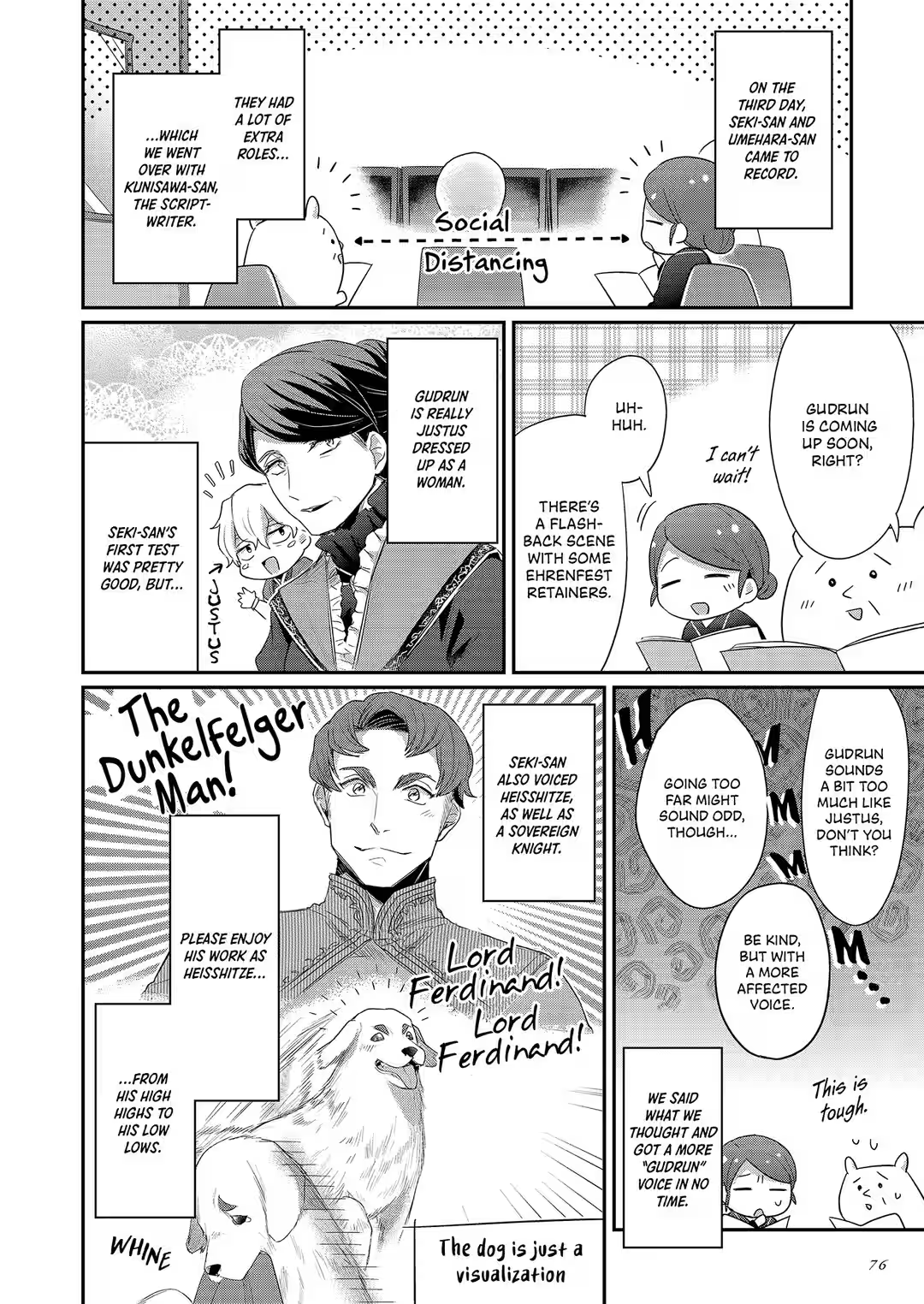
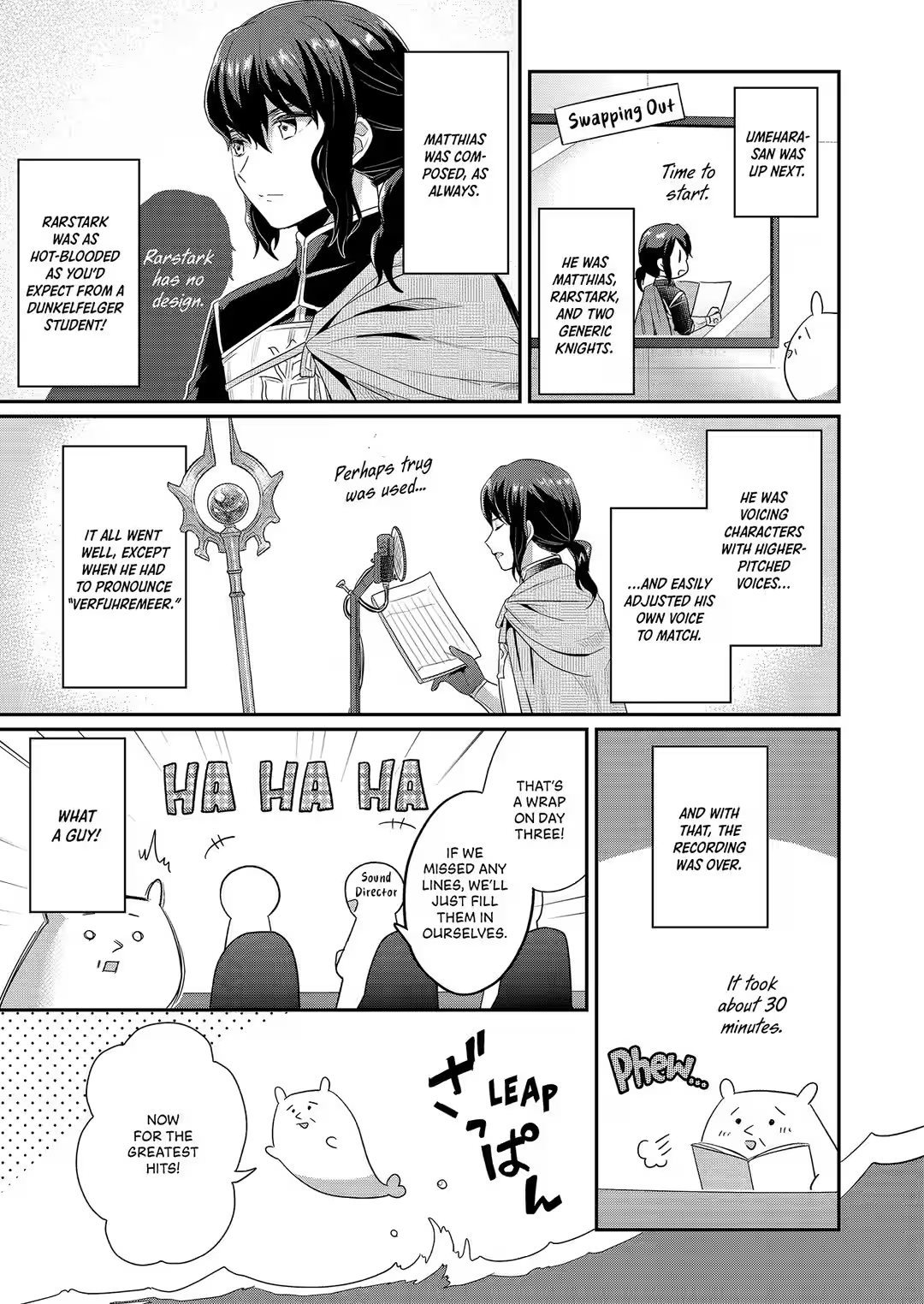
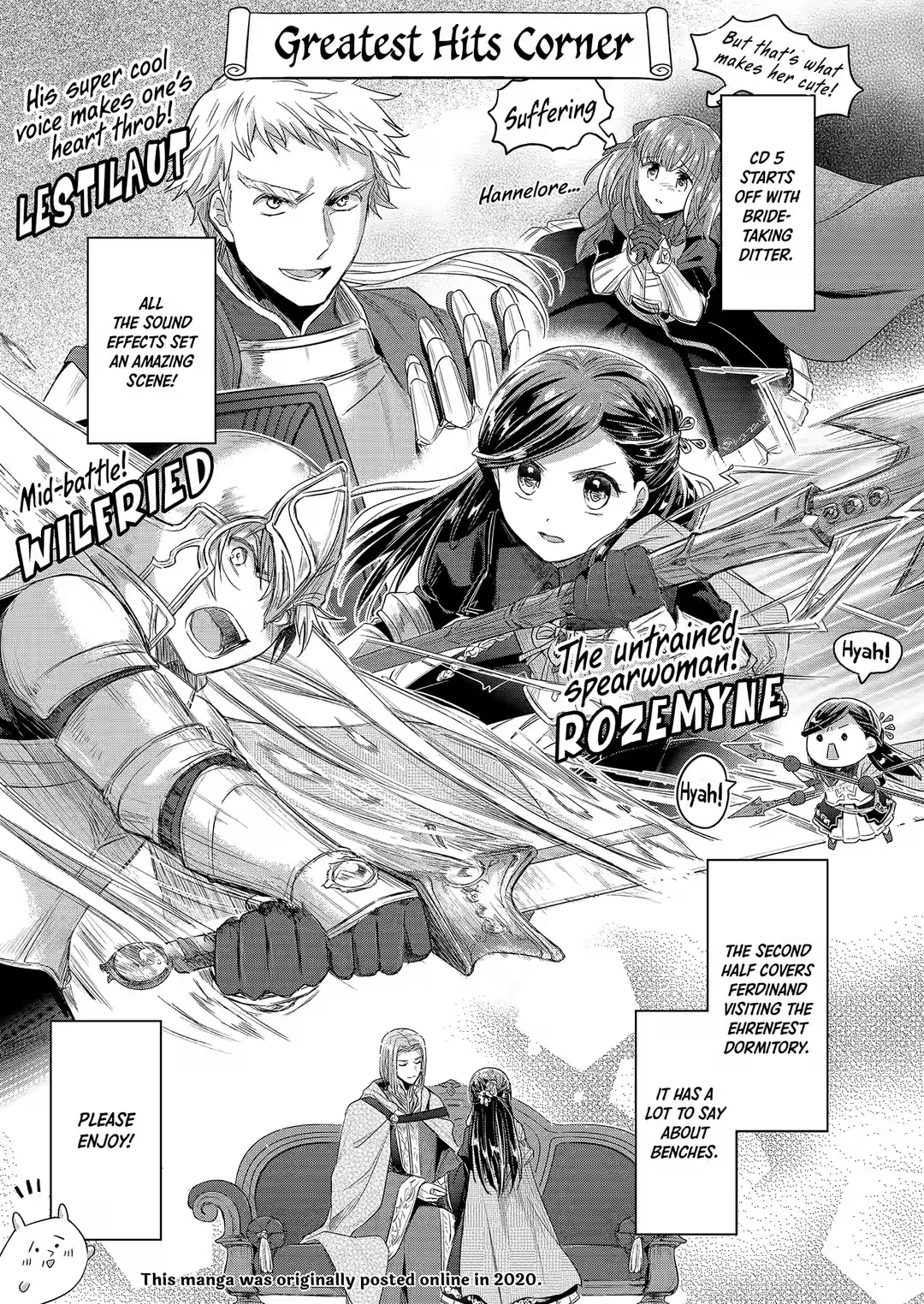

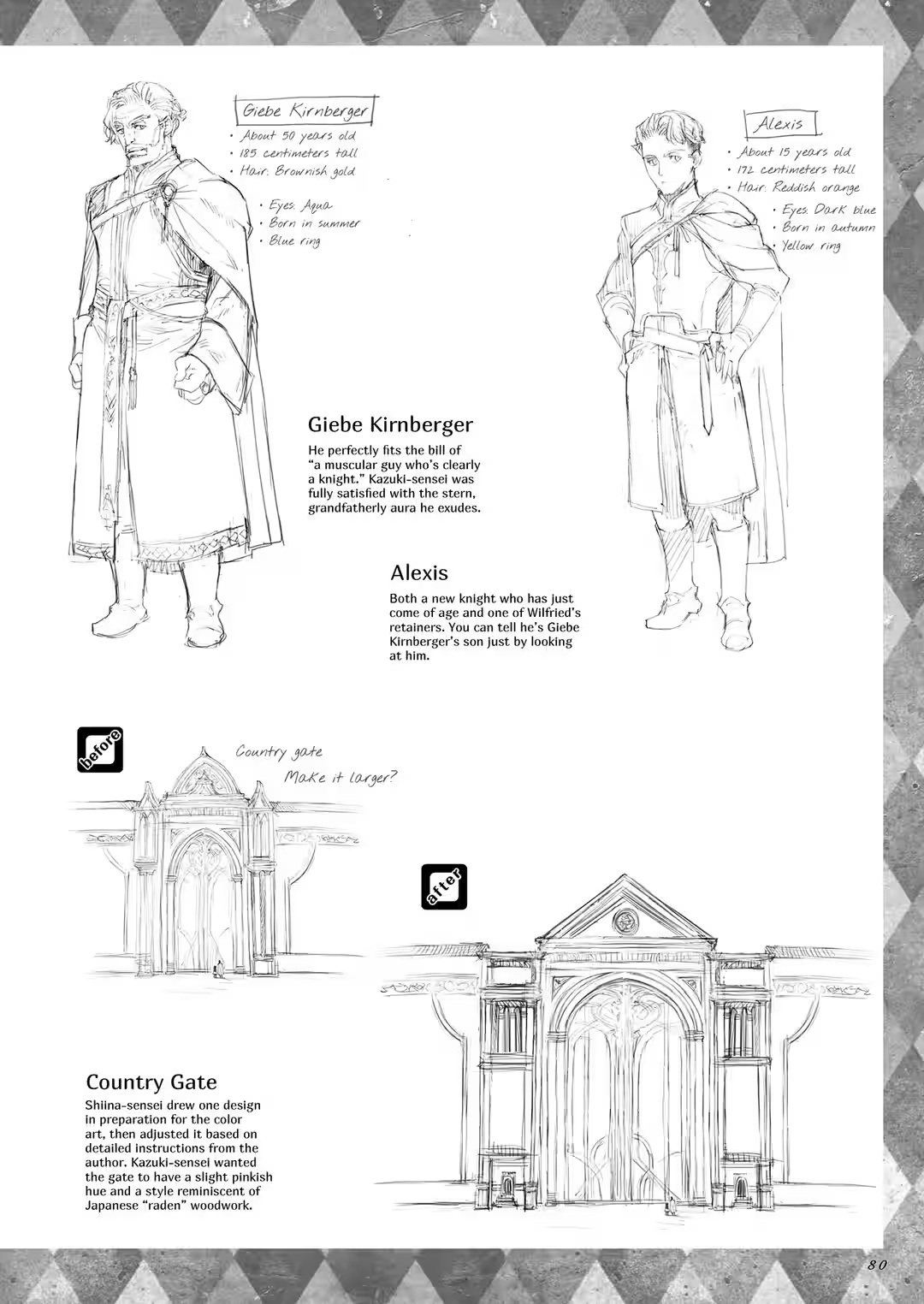
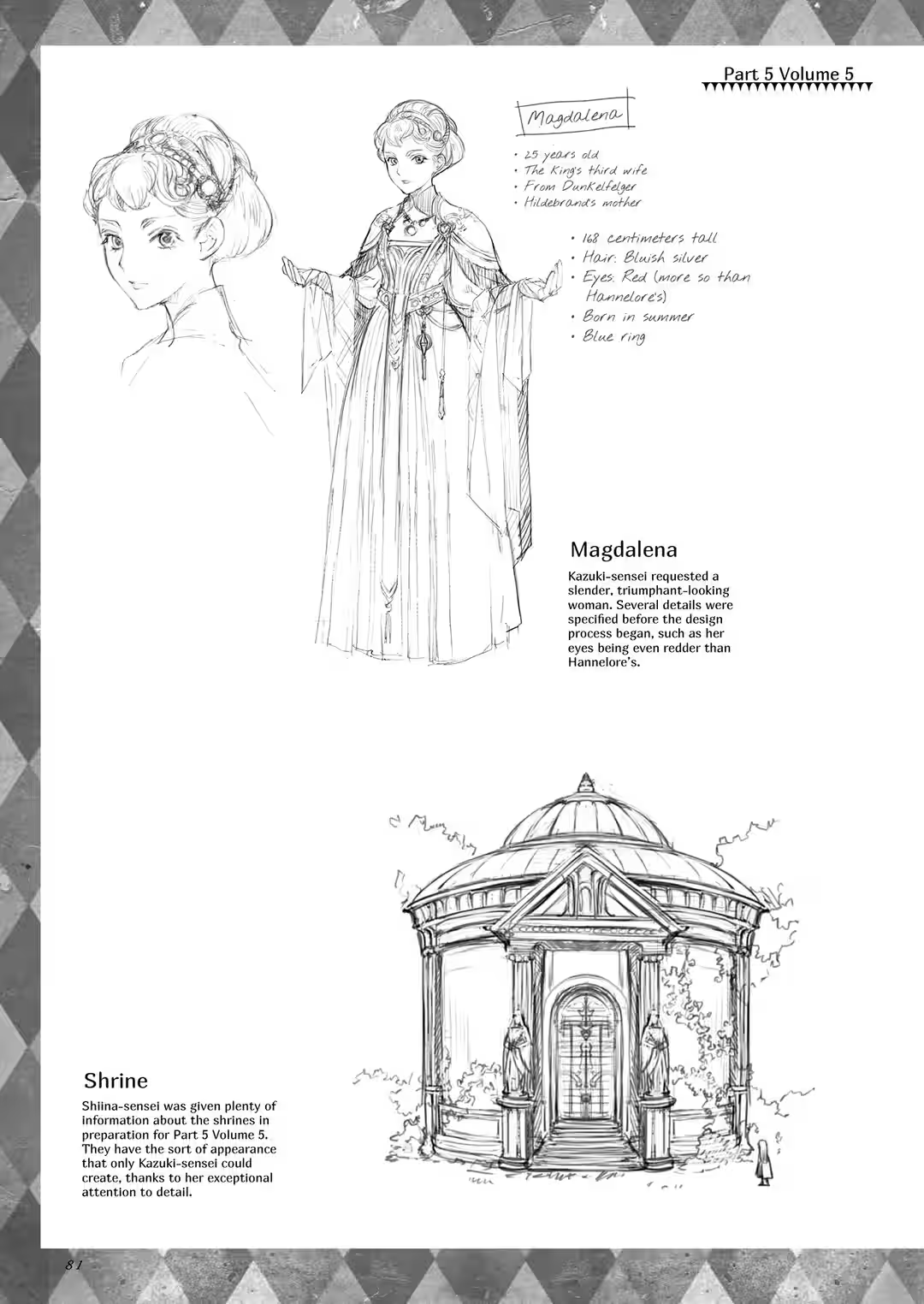
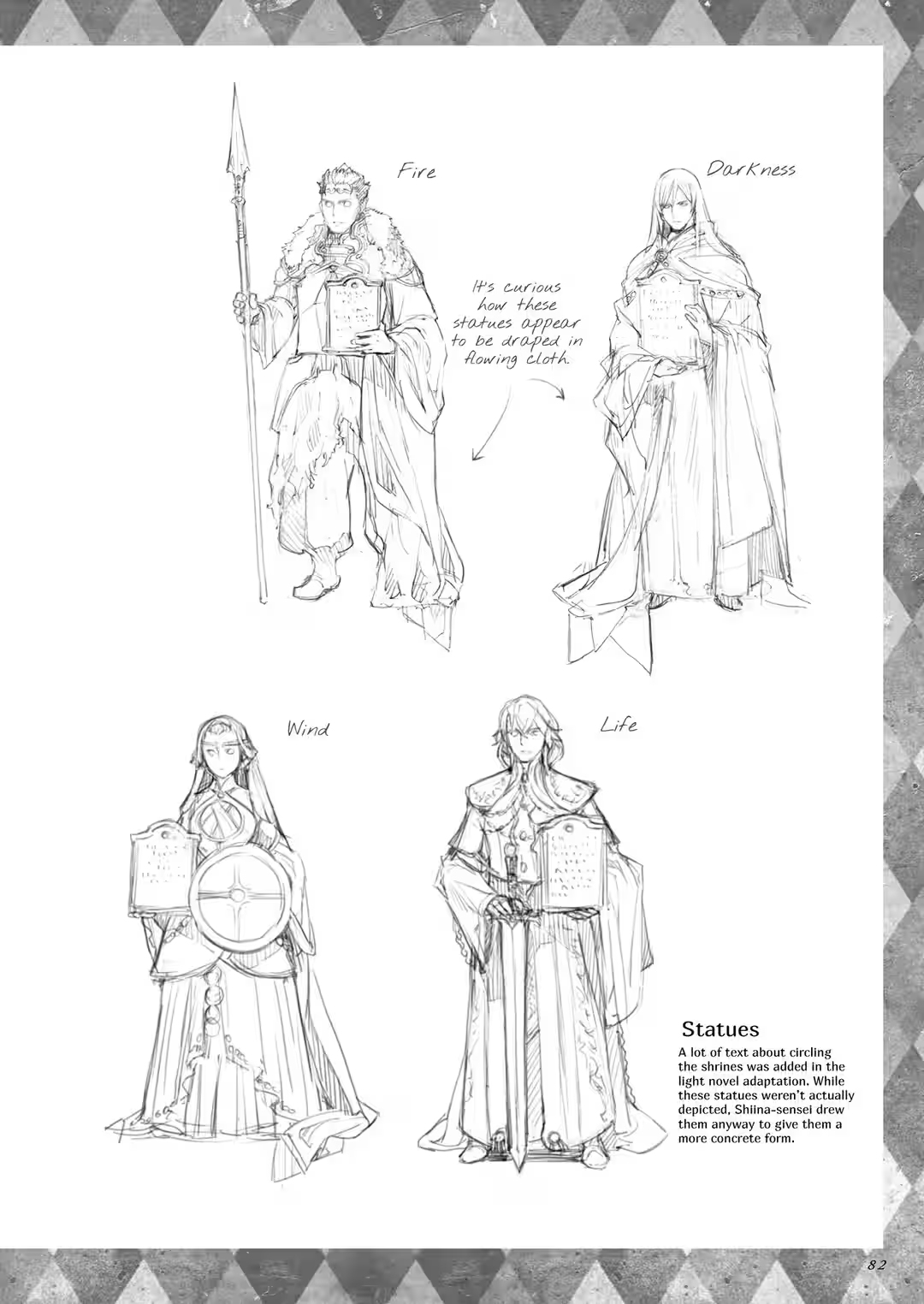
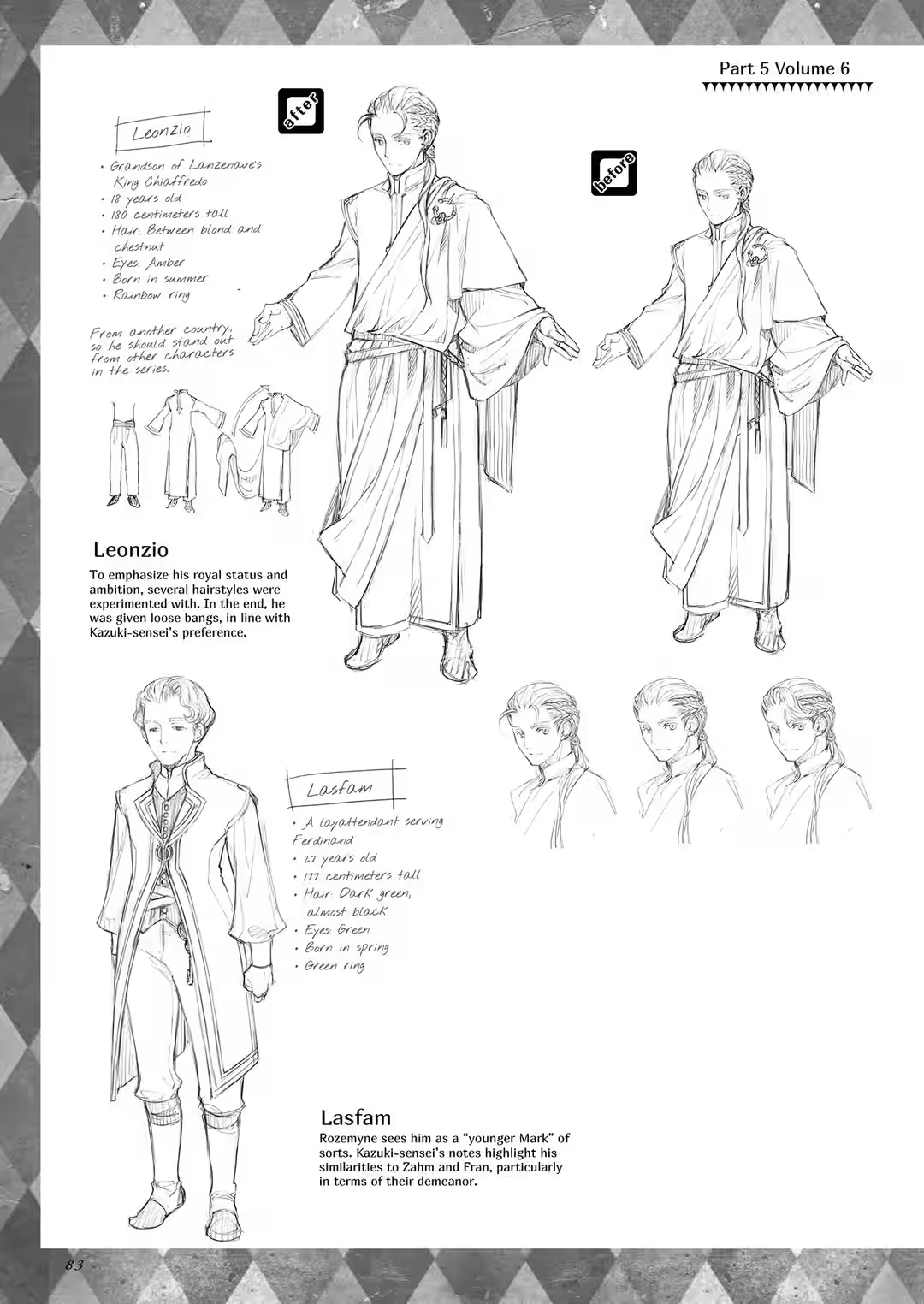

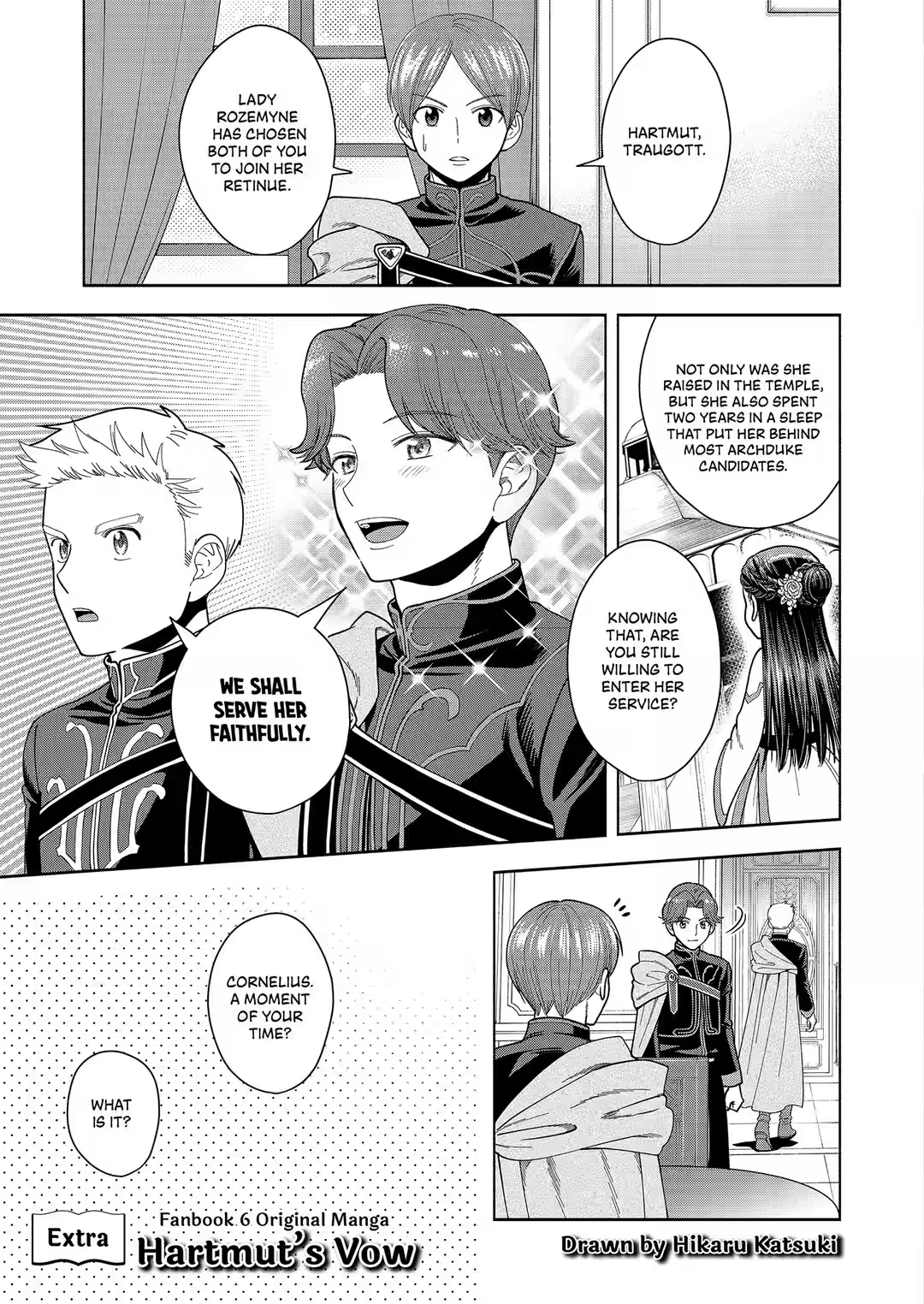

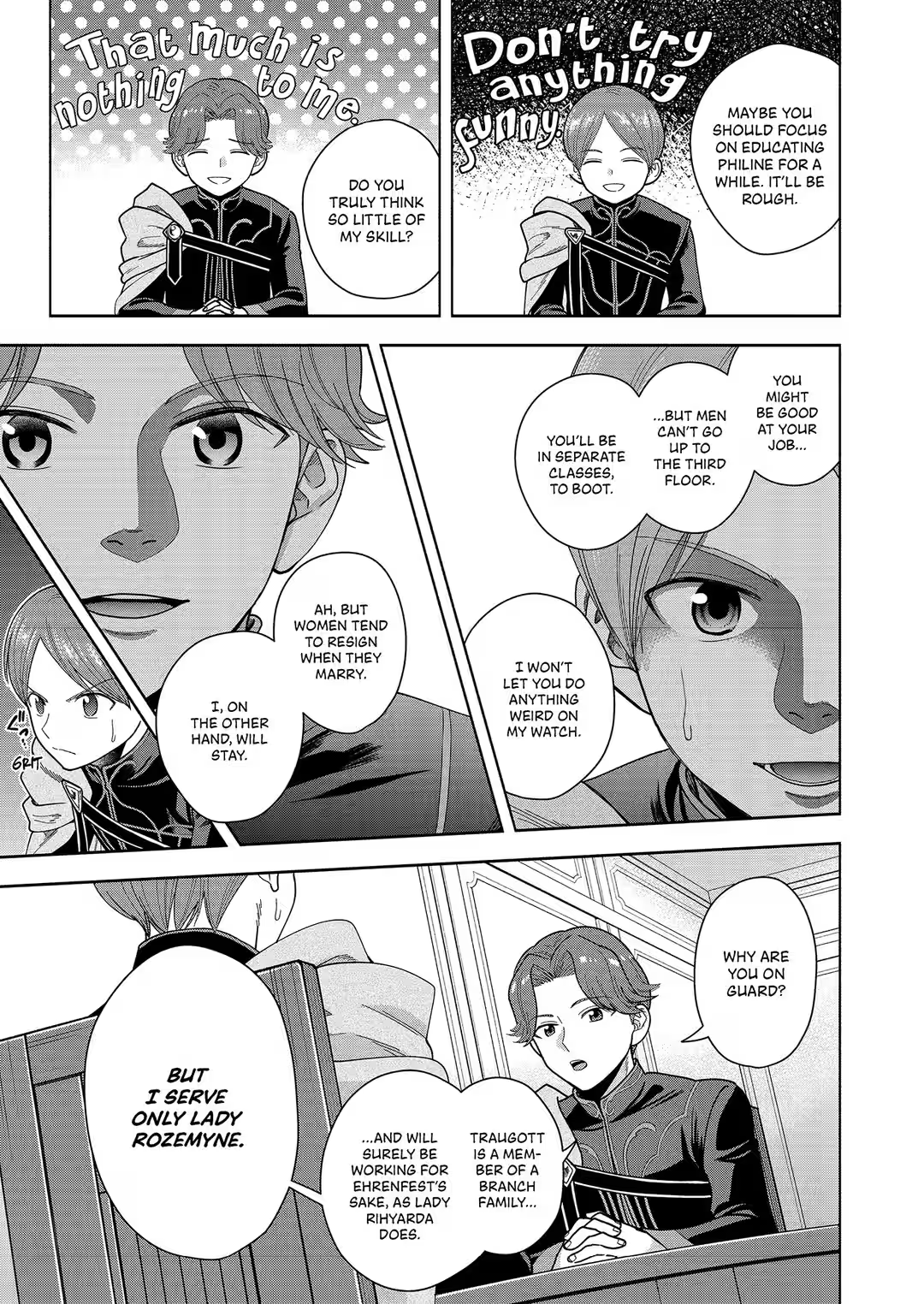
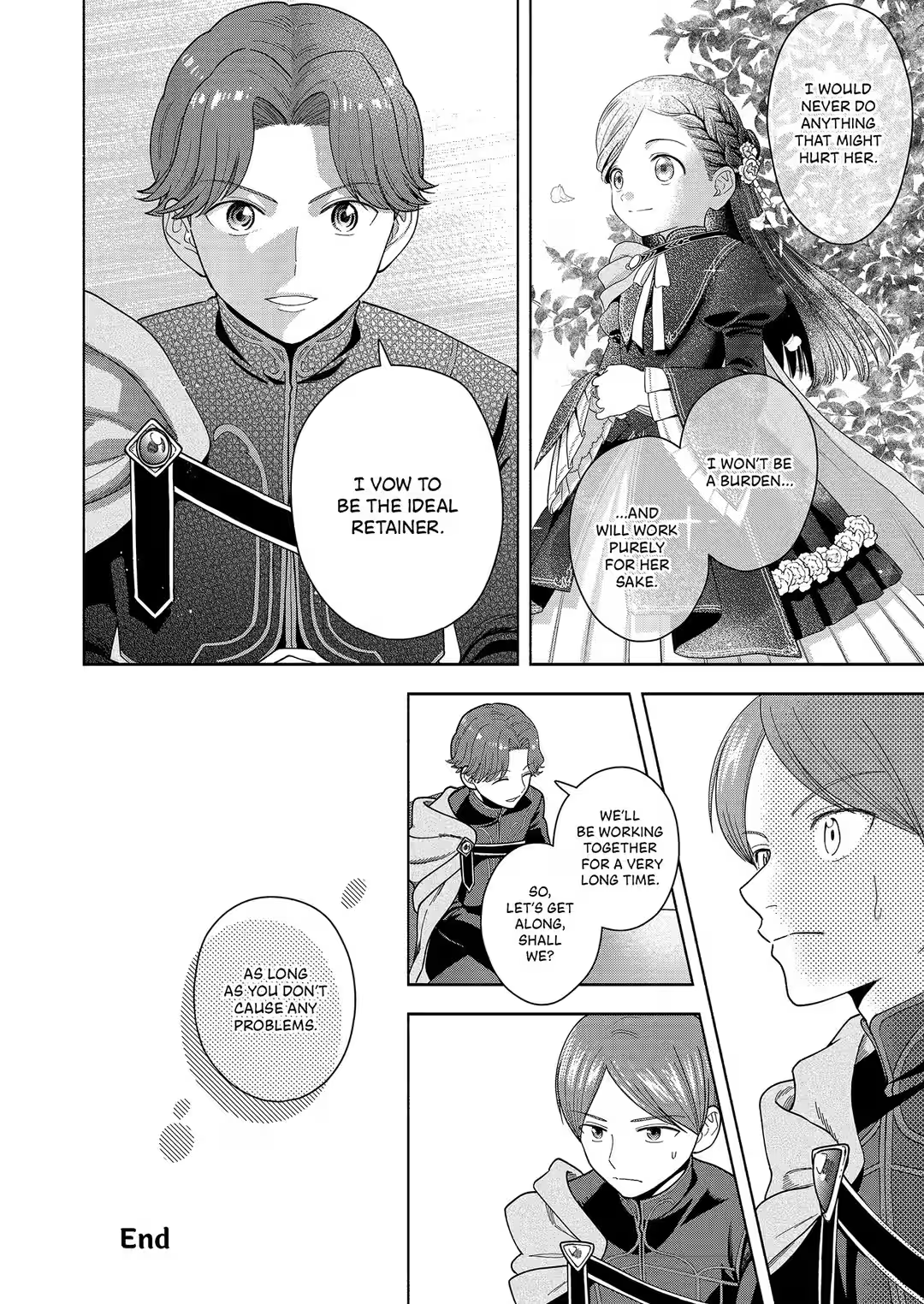
Q&A with Miya Kazuki
Here are my responses to questions posted online between June 30 and July 7, 2021. I restricted submissions to only five questions per person this time, but the response was still quite daunting. My thanks to everyone who helped me organize this section—I won’t soon forget your kindness.
Miya Kazuki
Q: It’s said that the waxing and waning of the moon depends on how the God of Darkness feels. Has there ever been a full moon that lasted several nights before abruptly turning into a new moon?
A: Yes.
Q: Can subordinate gods be swapped around as freely as an archduke candidate might swap their retainers of the same gender? Are they canonically weaker—in terms of mana or otherwise—than primary gods?
A: Your comparison to archduke candidates and their retainers feels quite appropriate. The power dynamic mirrors that between archnobles and archducal family members, with some subordinates being stronger than the primary god they serve.
Q: We know the Goddess of Light melted ice to help save Geduldh from the God of Life. Did the God of Darkness help in any way?
A: Yes, he kept watch to ensure the Goddess of Light and their children didn’t go too far. He didn’t want the world they had worked so hard to create to be destroyed.
Q: Why is Ewigeliebe’s word needed for Zent candidates to obtain the Book of Mestionora? Doesn’t he want her dead?
A: Because of Erwaermen, who sealed part of Ewigeliebe in Yurgenschmidt.
Q: In the manga, Geduldh is always depicted with her eyes closed. It’s even mentioned in the fourth fanbook’s character design sheets that her eyes are always lowered. Is there a reason for that?
A: It’s said that she regrets the atrocities committed in her name, and that she casts her eyes down to look upon the earth in which Ewigeliebe was sealed.
Q: It was mentioned that Liebeskhilfe took Erwaermen’s place as the God of Binding. I thought this was strange, as he served the God of Life, whereas she serves the Goddess of Light. Does their element not impact their role, or is binding an exception? I imagine this must be the case for not just Erwaermen but every one of Ewigeliebe’s subordinates.
A: There’s nothing more to say except that, in the myths passed down in Yurgenschmidt, his job was given to someone else.
Q: What was Liebeskhilfe’s role before she became the Goddess of Binding?
A: Becoming the Goddess of Binding was her “debut” as a goddess, as it were. She was taken in as a subordinate specifically for that purpose. Before then, she was essentially an apprentice goddess assisting Wentuchte the Goddess of Weaving.
Q: In her short story in Part 5 Volume 5, Adolphine prays for Jugereise to bring down her divine instrument and “sever the foul ties that bind her.” What form does Jugereise’s divine instrument take?
A: It’s a pair of scissors meant for cutting cloth and thread. There are many tales in Yurgenschmidt of her severing threads that Liebeskhilfe tied together in jest.
Q: Is there a practical use for the powers of Sehweit the God of Far-Sight? In the light novels, all we really hear is that he watched some of the goddesses bathe. If someone were to obtain his divine protection, would their accuracy with bows improve? Or is the advantage more abstract, like having a keener eye for commercial or political opportunities?
A: His protection makes it easier to identify “weak points,” which helps when hunting and scouting. Knights specializing in long-distance combat would certainly consider it useful. It might not have been mentioned explicitly in the light novels, but the farseeing magic tool used in Part 3 Volume 2 depends on his sigil. As for whether his protection can help with commercial and political opportunities... Well, it depends how the recipient uses it.
Q: Can the Goddess of Chaos guide people down paths that don’t appeal to them?
A: No—she can only tempt them with things they actually desire.
Q: Is Chaocipher a subordinate god, or is she part of a separate system?
A: The latter. She’s part of the same system as Ewigeliebe the God of Life.
Q: What are Chamaewarein and Eifersuneid the gods of? Only their names are ever mentioned. And what is Beischmacht the god of, specifically?
A: “Chamaewarein” isn’t the name of a god or goddess—it’s a feybeast that transforms to traverse both land and sea. Eifersuneid is the God of Jealousy. He has unrequited feelings for Chaocipher and considers the God of Darkness his enemy. Beischmacht is the God of Child-Seeking.
Q: If there are gods for blizzards and other natural phenomena, are there also gods for rain and rainbows?
A: There’s a Goddess of Rain, but not one of rainbows.
Q: How does Verdraeos the God of Deliverance decide who deserves his protection? I want to know what Rozemyne, Cornelius, Matthias, and Laurenz have in common.
A: Prayer is important, of course. Otherwise, his protection is associated with those who struggle against their fate.
Q: I think there’s something really neat about the words used to obtain the Book of Mestionora. “Kraeftark” and “Teidihinder” are two that come to mind. Do they mean something? Are they the same for everyone, or could they be unique to each person, like the names of the supreme gods?
A: They had a meaning when I came up with them, but I can’t find my notes... They’re the same for everyone, but you can’t obtain the Book of Mestionora without the accompanying slates.
Q: Mestionora is said to have been given her midnight-blue hair and golden eyes by the God of Darkness and Goddess of Light. Does that mean her hair and eyes weren’t those colors when she was born? If not, what were they originally?
A: Her hair and eyes were white and red, respectively.
Q: Why are the supreme gods the only ones with ever-changing names? Do they have set names among the other gods, at least? Like, would Flutrane and Leidenschaft both address them the same way?
A: Yes, the supreme gods have set names among the other gods—though Flutrane and Leidenschaft would address the God of Darkness as “Father,” not by his name.
Q: Do the prayers of gray priests and shrine maidens in the temple reach the gods, or does one need magic tools or a schtappe to reach them?
A: One must devote mana for one’s prayers to reach the gods. Divine instruments and schtappes make that easier, but they aren’t required.
Q: We know there can be only seven primary gods, but is there a limit to the number of subordinates? Is there a cap on how many divine protections one can receive when chanting their names?
A: One can receive no more divine protections than there are gods to grant them.
Q: Rozemyne was surprised by what happened when she received the names of the God of Darkness and Goddess of Light. Eglantine seemed just as taken aback. Did anyone besides Rozemyne receive the honor? What are the requirements?
A: Rozemyne was the first person in a few decades to receive the honor. As far as requirements go, one must have devoted a certain amount of mana to the God of Darkness and Goddess of Light.
Q: When the library’s magic tool was being supplied with mana, the feystone turned rainbow even though the liquid was red. Was that because Rozemyne secretly added more of her own mana?
A: Mana always ends up looking red when stored in the chalice during the Dedication Ritual. The feystone turned rainbow because it was filled with mana of various elements.
Q: Schwartz and Weiss know to address their master as “milady” and everyone else by name. How do they distinguish their visitors?
A: By their visitors’ mana, which is registered with the library during one’s first visit. Anyone who wasn’t registered would quickly be eliminated, which is why a librarian is needed to welcome any students coming to register.
Q: Why didn’t Schwartz and Weiss ask Rozemyne to give mana to Gramps (the statue of Mestionora) during her first year? Had she not met some kind of criteria?
A: She hadn’t yet given enough mana to Schwartz and Weiss.
Q: When pillars of light formed after the Royal Academy’s Dedication Ritual, was the mana added to the slates that Rozemyne eventually obtained?
A: All the mana collected in the chalice Rozemyne made was considered to be from her alone. It was only in her fourth year that the mana was recognized as having come from the actual contributors, as they began making the offering through prayer.
Q: In each of the Academy’s dormitories, the aub and their partner have separate rooms on the second and third floors. Are the rooms connected via an internal staircase? I was wondering how newlyweds do the deed after the first day of the Archduke Conference.
A: Yes, an internal staircase connects their rooms.
Q: Laynobles and mednobles stay in shared rooms at the Royal Academy. Does anyone ever end up with someone they can’t stand, either for personal reasons or because they’re from opposing factions?
A: It does happen, but their adult attendants work together to prevent it when they can.
Q: The doors connecting the dormitories to the central building are numbered according to the duchy rankings. What happens when the rankings change?
A: The doors’ destinations are updated.
Q: How is seating decided during archduke candidate classes? I would have assumed students would position themselves based on the duchy rankings, but Rozemyne sits near the front with Hannelore beside her, while Wilfried sits closer to the back.
A: Because their classes are so small, the shortest students are put closest to the front so that everyone can see.
Q: Since starting her second year at the Royal Academy, has Rozemyne spoken with any female archnobles or archduke candidates in her class besides Hannelore, or does she always keep to herself?
A: Rozemyne chooses not to speak with them, and since she always goes all out to pass each class on the very first day, she doesn’t seem very approachable. Those who want to be her friend shoot her respectful glances to show their interest, but Rozemyne misinterprets them as judgmental stares and becomes too guarded to engage.
Q: It was mentioned during the last Q&A that students who wish to become doctors have to take extra classes on top of their specialty course. Is four years of studying on the side really enough? Do they continue studying after they return home, or is there an apprenticeship program they can take upon graduating?
A: There’s a period when they work as medical assistants or, indeed, apprentices. Rarely do nobles decide to become doctors on a whim; those who pursue the path normally come from a family of doctors and work under their relatives as apprentices before learning at the Royal Academy. Students commonly exchange tips and practices with aspiring doctors from other duchies.
Q: If a student were to die unexpectedly at the Royal Academy, would their parents be entitled to seek compensation or restitution?
A: Do you mean if a student died from an illness or some such? Their parents wouldn’t receive any compensation, no. Even when students died during treasure-stealing ditter, there was never any restitution.
Q: Blenrus are native to Haldenzel, but can they also be gathered in the section of Klassenberg that used to belong to Eisenreich?
A: Yes, assuming the trees remain and one performs the proper ceremony.
Q: Did the people of Klassenberg react to the Miracle of Haldenzel? Is that why Karin’s father changed his route?
A: There was a slight change in how commoners traveled, but the nobles didn’t take action until after Ehrenfest’s joint research with Dunkelfelger. Klassenberg nobles are good at gathering information but err on the side of caution when it comes to acting on it.
Q: It seems strangely merciless that Gabriele was kept from becoming an aub’s first wife and essentially banished to a giebe’s province, especially when Veronica was designated as the next aub’s first wife from a young age. Was that due to greater pressure from Ahrensbach, or something else entirely?
A: It wasn’t “merciless”; it was due to a lack of better options. I covered this in the short story about Damuel and Brigitte’s courting, but when someone’s status changes through marriage, their behavior is expected to change as well. Gabriele wasn’t suited to be the first wife of a low-ranking duchy like Ehrenfest—even after marrying in, she continued acting like a big shot from a greater duchy. As a result, during a meeting with Aub Ahrensbach, it was decided to have the next aub become a giebe instead. To compensate, a contract was drawn up to ensure that Gabriele’s child would be raised to become either the next aub or the next aub’s first wife.
Q: How did Lestilaut—or rather, Dunkelfelger—know that the black shield could be used to get through Schutzaria’s shield?
A: It’s only natural to assume that a shield known to absorb mana would be effective against one made of mana. Since they knew it worked against geteilts, they simply extrapolated from there.
Q: What happened to the lesser and middle duchies that interfered with Ehrenfest and Dunkelfelger’s bride-taking ditter match? Were they punished?
A: The blame ultimately fell on the Sovereign Knight’s Order, and since the incident took place at the Royal Academy, no major punishments were issued. At most, the involved students received stern lectures from their respective aubs or dormitory supervisors—and dirty looks from the knights of Dunkelfelger.
Q: We know that Drewanchel specializes in research and Dunkelfelger in ditter, but what kind of duchy was Werkestock? Since their apprentice knights were close to Dunkelfelger’s, I get the impression they were more military-focused.
A: Werkestock was a greater duchy—strong enough to take on both Klassenberg and Drewanchel simultaneously while keeping Dunkelfelger neutral and at bay. That said, it was more scholarly than militaristic, known for its knights and attendants “of the quill,” as it were. Werkestock held many important footholds in the Royal Academy and the palace, with its nobles often serving as librarians and in other administrative roles. After the civil war, Drewanchel filled the void Werkestock left behind.
Q: It’s said that Ahrensbach women can have the veils they wear in public made from any cloth they desire. Could someone not mimic another person’s design with the intention of impersonating them? Are there rules in Ahrensbach to prevent that from happening?
A: In situations where someone might pretend to be someone else, nobles can still be identified by their mana.
Q: Are there Japanese equivalents to the fish caught in Ahrensbach? I want to try my hand at creating some Yurgenschmidt recipes.
A: Garneschel are essentially big lobsters, with huge claws that are eaten the way crabs are in Japan.
Q: Were other duchies taken aback by Detlinde’s shameful display during the graduation ceremony and the fact that her mother, Georgine, didn’t get involved? Did it have a negative impact on Ahrensbach, such as causing engagements to fall through?
A: If you’re curious about the other duchies’ reactions, check out the sales bonus story for Part 5 Volume 3. The Sovereign temple declared that Detlinde was a Zent candidate, and Georgine told anyone who asked that the hairpins were from her daughter’s fiancé, so Ferdinand received more of the blame than Ahrensbach.
Q: Is Werkestock’s temple located in the region overseen by Ahrensbach or Dunkelfelger? Do Werkestock’s blue and gray priests continue to work there, or were they replaced with priests sent from Ahrensbach’s (or Dunkelfelger’s) temple?
A: It’s in the region overseen by Ahrensbach, though it no longer contains any blue or gray priests. They were absorbed into Ahrensbach’s temple, along with Werkestock’s chalices.
Q: I’m curious about Zausengas and the relationship it had with its neighboring duchies.
A: Bonifatius’s younger sister married into Zausengas’s archducal family, only to be executed. The duchy’s land is now overseen by Klassenberg. Deposed duchies are treated more harshly than those that merely lost the civil war—they lost the right to self-govern and were instead placed under the control of a duchy from the winning side. For Ehrenfest, interacting with Zausengas would have meant losing its neutrality. While commoner merchants from the two duchies were free to associate, interactions between nobles were prohibited.
Q: Could one procure flower offerings at the Sovereign temple? Did royal retainers, scholars, knights, and professors go there?
A: Yes to all of the above. Flower offerings were also seen as a way to provide sex education to male students who developed mana-sensing at the Royal Academy. That’s why nobles have such a unified perspective on what kind of place the temple is.
Q: Did the boys born in the Adalgisa villa who weren’t chosen to become the next king of Lanzenave know they were going to die when they turned seven? Did any of them panic or try to escape? By what means were they turned into feystones?
A: I wouldn’t say they knew they were going to die, but they might have sensed that something bad was going to happen to them. Anyone who panicked or tried to run away was turned into a feystone then and there. The means by which they were turned into feystones is going to be revealed in a future story.
Q: Did those living in the Adalgisa villa have attendants to care for them, or were they not allowed to have attendants, since they weren’t seen as human?
A: They had attendants—usually from Lanzenave, as well as those unable to marry into royal branch families.
Q: The term “Ehrenfest’s flower” sent a shiver down my spine. It struck me as the kind of thing someone who viewed people as mere tools would say. Not to sound crude, but was there a high chance of Rozemyne being treated as the new “Adalgisa princess” of sorts?
A: No, Immanuel wanted her in the Sovereign temple.
Q: Women married to aubs are known as first wives, second wives, etc. What about men married to female aubs?
A: They’re known as first husbands, etc.
Q: Do men also use “frau,” “assis,” and “aehrtin” as titles for the first, second, and third husbands, respectively?
A: They use “artner” for the first husband, but the titles for the other husbands remain the same.
Q: In a previous fanbook, it was said that the first wife of an archduke holds more status than an archduke candidate. Do the second and third wives hold more status than the first wife’s children? Anastasius and Sigiswald used a polite form of address for their father’s third wife, but Eckhart and Cornelius didn’t for Karstedt’s second wife. Does it have something to do with their personal relationships?
A: It depends on the first wife’s status before marriage and her relationship with her husband. The children of the first wife tend to enjoy more status than the third wife, but Sigiswald remains respectful nonetheless. His mother hails from a middle duchy, while the third wife is from Dunkelfelger, so Sigiswald would want to maintain good relations with her even if he one day becomes king. Cornelius, on the other hand, has an archnoble mother, and his father’s second and third wives were mednobles from an opposing faction. Not only did he fail to show them respect, but he also treated them with open hostility.
In general, even when second and third wives rank below them, the children of a first wife will behave respectfully—as long as their father does too, and the second and third wives are respectful toward the first.
Q: Which of his three wives did Karstedt spend the most time with? Did he stay in the primary building with his first wife, or did he stay with his preferred wife instead?
A: Most husbands live with their first wife, but a man who’s particularly smitten will naturally spend more time with the wife he prefers. While mistresses are frowned upon, there’s nothing wrong with being closer to one’s second or third wife—as long as the first wife is treated with the respect she deserves.
Q: As I understand it, nobles take no more than three wives due to concerns about not having enough buildings for more. Is that limit also baked into the contract magic used during the Starbind Ceremony?
A: Nobles can take more than three wives, but the ceremony can’t be performed without the archduke’s permission.
Q: Are couples who don’t get along—who are put together purely because of their faction, for example—still obligated to have children?
A: Yes, that’s what it means to be in a political marriage.
Q: In cases where an archduke candidate marries into another duchy, do the retainers who move with them get a chance to start their own houses? That didn’t seem to be the case for Gabriele’s or Florencia’s retainers.
A: Retainers who move with their family and spouse can start their own houses, but only with their new aub’s permission.
Q: Why did a guard knight accompany Clarissa on her move to Ehrenfest? Based on the fact that even giebes’ first wives operate alone, I thought archducal family members were the only ones who had guards with them at all times. It seems strange to me that a regular noble marrying into another duchy would go to the trouble of hiring someone to escort her.
A: Moving to another duchy involves transporting all of one’s belongings, so most brides would ask a knight among their acquaintances to guard them. Clarissa hired someone because she recognized the potential risks of traveling through another duchy alone. There would be feybeasts on the road, and she might need someone to confirm her identity to get through the gate. In truth, Clarissa also had an attendant with her when she set out, but she moved so quickly that the attendant couldn’t keep up.
Q: Did Clarissa’s guard knight become an Ehrenfest noble?
A: No—she was hired specifically for the journey and returned to Dunkelfelger once her duties were complete.
Q: Brunhilde is joining the archducal family by becoming the aub’s second wife. Won’t she struggle due to not having taken the archduke candidate course?
A: Not as his second wife. A first wife might benefit from taking the course, as it would enable her to perform the aub’s duties if he were to pass away before any of their children came of age—but even then, it’s not strictly required.
Q: Lieseleta’s story in the previous fanbook clarified the process of color-mixing, but is mana capacity really all that’s needed to finalize an engagement?
A: Yes. There are nuances—such as one’s elements, how adaptable one’s mana is, and so on—but the existence of potions and magic tools that make color-mixing easier means that capacity is ultimately all that matters.
Q: The color-mixing story in the previous fanbook gave me the impression that those who learned Rozemyne’s compression method ended up with more mana than their parents. Is there a risk that the rings they received from their parents could turn to gold dust? If so, would they need to make new ones themselves?
A: Technically, yes—the rings could break, but only if someone went all out. That said, nobles mostly use their schtappe rather than their ring to control their mana, and the amount used in greetings isn’t nearly enough to pose a risk. Trouble might arise if someone got emotional enough to flood their surroundings with mana, but that’s extremely rare. If a ring did break, the owner would simply make a new one to match their increased capacity.
Q: How do normal engagement ceremonies—that is, those not set in motion by a royal decree—begin? Ferdinand claimed to have received the guidance of the supreme gods for his, while Brunhilde thanked the God of Guidance. How does an engagement ceremony start for the first wife of an aub who hasn’t received their position by royal decree? Does anything change if the bride is from within the duchy rather than from outside it? Does the phrasing change?
A: There’s room for variation, but first spouses tend to thank the guidance of the supreme gods. Second and third spouses thank the guidance of other gods.
Q: If one’s biological parents pass away before one’s baptism, but one has a claim to their inheritance as the eldest child, would one be baptized as a child of the deceased?
A: Potentially. Philine, for example, was baptized as the daughter of her late mother. And if not for Elvira’s kindness, Rozemyne would have been baptized as the daughter of Karstedt’s deceased third wife.
Q: Between their baptism and coming-of-age, can archduke candidates who aren’t children of the aub live in the northern building? An example that comes to mind is Karstedt before he was demoted to an archnoble. Is the practice the same in Drewanchel, with its abundance of archduke candidates?
A: Even archduke candidates not related to the aub can stay in the northern building, as seen with Rozemyne moving there after her adoption. The same practice applies in Drewanchel.
Q: I don’t remember the prayer pose (aka the Gl*co pose) being taught when myths are read during noble baptisms. Was it just not mentioned, or do noble children not know how to pray?
A: Noble children are aware of the prayer pose, but they don’t pray themselves—nobles generally view praying as the duty of priests.
Q: When would someone be sent to the temple for not having enough mana? Additionally—aside from those sent to the orphanage as a result of the purge—would a young noble given to the temple be granted a room before their baptism, or would they also stay in the orphanage?
A: Usually between the ages of five and seven—by that point, it’s clear whether a child has enough mana to be baptized. Those who join the temple as blue priests are given a room in the nobles’ section. It’s rare for a child with a surviving noble connection to be made to mingle with commoners in the orphanage.
Q: When having a baby, noble parents channel mana into the mother’s belly. How does this work in the Adalgisa villa, where the father can’t provide mana directly?
A: The father pours mana into a magic tool, which is then used instead. In some cases, he might leave behind feystones containing his mana, but this can result in an excruciating birth.
Q: Noblewomen are meant to channel mana into their bellies when pregnant, but I can’t imagine Gretia’s mother or any of the Devouring mistresses knowing how to do that. How are babies with enough mana to become nobles born, then?
A: If a pregnant woman doesn’t know how to control her mana, the baby will simply absorb the mana it needs on its own.
Q: Do nobles ever refuse to let someone bless them the first time they meet? How would the other party react?
A: Not under normal circumstances. Nobles are taught to control their emotions, so they would never lash out. A blatant refusal would cause such great offense that it could even escalate into war. For example, if Veronica were to refuse a blessing from a Leisegang, her husband would have every reason to initiate a divorce. Not even Ahrensbach would be able to defend her.
Q: Did the nobles working in the castle get there because of personal connections, or was there some kind of test they had to pass?
A: They mostly had to pass tests. Their grades at the Royal Academy and the quality of their work as apprentices were also taken into account.
Q: As I understand it, female knights tend not to participate in hunting trips or gathering expeditions without a fixed base of operations. But what about those who have finished raising children, or who become widows? If they rejoin the Knight’s Order, are they still barred from such missions? If they don’t, what kinds of duties do they take on instead?
A: They serve as guards for the Noble’s Quarter and for members of the archducal family. Those who rejoin the Knight’s Order and wish to go on expeditions need only ask, though few mothers would choose to be apart from their families and children.
Q: Rozemyne is said to have barely any retainers. How many would an archduke candidate of a middle duchy normally have?
A: Given how work is distributed, Rozemyne would want at least two more adult knights, scholars, and attendants each to educate the apprentices.
Q: All of Rozemyne’s archnoble attendants elected to stay in Ehrenfest. Is there a risk that their replacements won’t acknowledge Lieseleta as her head attendant?
A: A head attendant requires the approval of both their lord or lady and their fellow retainers. Thankfully, Lieseleta won’t face any issues with that.
Q: Georgine told Justus to become a scholar, since attendants need to be the same gender as the person they’re serving. How come Rihyarda gets to serve Sylvester despite being a woman? Are there unique circumstances at play?
A: While having an attendant of the opposite gender is allowed, it’s generally impractical due to the nature of the role. It would be deeply inappropriate for a man to undress and bathe a woman roughly his age, for example. As for Rihyarda, she’s old enough to be Sylvester’s mother and has served him since he was young, so there’s no confusion about the nature of their relationship. Wilfried would probably have ended up with a female head attendant instead of Oswald, had Veronica not dismissed all his female attendants out of fear they might steal him away from her.
Q: Can the archducal family’s personal doctors see other nobles? If a laynoble fell sick, would they be able to get treatment?
A: Yes, the archducal family’s personal doctors can see other nobles, with the aub’s permission. A sick laynoble could receive treatment if they knew a doctor and could pay them for their services. Some provinces don’t have any doctors, though, so access to one wouldn’t be guaranteed.
Q: Do knights, scholars, and attendants have set uniforms beyond their work clothes? Do they need to have certain hairstyles or bring certain things with them?
A: Do you mean uniforms handed out by one’s employer, or the black attire worn at the Royal Academy? People bring what they need, but there aren’t any set rules, really.
Q: Do men wear socks that need to be fastened to their waist, as women do? Are there Bookworm equivalents of garter belts?
A: Men wear the same kind of socks as women. They don’t have their own version of garter belts.
Q: Do archduke candidates who go to the castle for work bring their personal chefs with them, or do the castle chefs prepare food for everyone?
A: The latter. Ferdinand still doesn’t trust the food served at the castle, so he returns to his estate to eat—unless someone invites him to join them.
Q: Are there as many kitchens in Ehrenfest’s castle as there are members of the archducal family, or do they all share a big one? I assume those who share chefs also share a kitchen, but not those with chefs of their own.
A: For meals served in the main building, everyone’s personal chefs gather in a massive shared kitchen and cook together. In the northern building, however, each archduke candidate has their own kitchen where breakfast and other such meals are prepared.
Q: Is the slime found in Bookworm’s toilets a feybeast or a magic tool? If the former, wouldn’t the mana in the waste it consumes empower it or something?
A: The slimes have been modified to account for that.
Q: Elderly nobles such as the former Giebe Liesegang seem to prefer carriages over highbeasts. Is there a maximum age for traveling by highbeast? Is it the same for men and women? Do Rihyarda and Norbert also travel exclusively by carriage?
A: There’s no upper age limit—anyone with mana can form a highbeast. That said, carriages are sometimes preferred. If someone struggles just to sit up or stand, they likely wouldn’t want to be flying through the air. Rihyarda uses her highbeast in the light novels, including at the Royal Academy.
Q: When Rozemyne was still an apprentice blue shrine maiden, Ferdinand warned that her rampaging mana could make her burst. Would that be dangerous to those nearby? Could the explosion ever be powerful enough to damage her surroundings?
A: Only the person who explodes would suffer. At worst, those nearby might get splattered with blood.
Q: Nobles turn into feystones when they die because the mana within them hardens. Does that not happen after mana starvation, as there’s no mana to solidify? In those cases, does the corpse remain as a commoner’s would, eventually decaying?
A: Except in abnormal circumstances, such as when someone suddenly turns into a feystone, a person’s feystone is removed from their corpse during their funeral. Even when starved of mana, a noble’s internal mana organ will still turn into a feystone. It won’t contain any mana, of course, so their corpse will start to melt.
Q: Is the spell that was used in Hasse used every time a noble, priest, or commoner is executed? Are executions ever done manually, like on Earth?
A: The spell isn’t used every time—only when commanded by the aub—but it’s always performed by a member of the archducal family. The method of execution depends on who gives the order.
Q: I assume nobles performed Shikza’s and Bezewanst’s executions and the purge of the former Veronica faction. Did the Knight’s Order do most of the work, since destroying medals with the God of Darkness would burden the archducal family?
A: Yes, the Knight’s Order did most of the work.
Q: Nobles seem to attend winter socializing no matter how intense the blizzards get. Do they ever visit someone’s estate and end up trapped there due to the weather? Men can travel freely by highbeast, but the carriages that women and children use would have a hard time getting through the snow. In such cases, might they stay the night at their host’s estate?
A: Yes, invitations are extended with the understanding that such situations might arise.
Q: When nobles write to merchants—to order clothes or what have you—do their servants go to the lower city to deliver the letters in person? Furthermore, one of the novels mentioned that the gray priests hadn’t been to the city before Myne joined the temple. In that case, how did the blue priests send their letters?
A: As seen when Benno goes to the Noble’s Quarter, merchants regularly visit nobles to take their orders. If something is particularly urgent, laynobles and mednobles might send servants to the lower city, but archnobles and members of the archducal family tend to use magic letters, a form of communication that doesn’t require a response.
Blue priests normally correspond through their house of origin. They inform their families of what they need, and their families take care of the rest. It’s usually food, which is sent straight to the temple for their personal chefs or the gray priests to receive. That said, blue priests do sometimes write to merchants and place orders themselves.
Q: Can an archnoble from one duchy and an archduke candidate from another become friends, assuming their duchies are ranked appropriately? Ferdinand was friends with Heisshitze, and Bonifatius seemed to be on good terms with archnobles from Werkestock and Dunkelfelger.
A: They can bond over shared traits and interests, but their relationship wouldn’t qualify as friendship by modern standards. Ferdinand and Heisshitze got along when playing ditter and gathering ingredients, but status was always a factor between them.
Q: Rihyarda has always had gray hair, as I understand it, and Bonifatius is still blond. Are there any characters whose hair has grayed with age? Do they dye it? I’m especially curious about the former Giebe Leisegang.
A: Rihyarda and Bonifatius both have plenty of gray hairs. As for the previous Giebe Liesegang, he had already lost his hair by the time he appeared in the story. It used to be reddish-brown, though.
Q: Were there more freedoms in the days when there were mana-rich nobles in abundance? When the land was rich with mana, I assume there was less pressure for women to marry, and those who were married could work alongside and stand on equal terms with their husbands—when they weren’t pregnant, at least. Monogamy, divorce, and bachelors all might have been more common.
A: Nobles in those days enjoyed more or less the same freedoms as nobles do now. Divorce severely weakens one’s blessing from the supreme gods and is only considered in extreme cases. As for bachelors, while the idea might sound nice, most would see being bound to one’s house—without the independence that comes with marriage—as more unfortunate than freeing.
Q: Mana is used to close a wound in Part 2, and a magic circle is used to check the flow of mana in Part 3. Are there any other situations where a doctor might need to channel their mana into another person?
A: There’s a wide range of treatments for a variety of symptoms. Ferdinand isn’t strictly a doctor, so he isn’t capable of performing them all.
Q: In the light novels, Rozemyne doesn’t mention anything about the archducal family or Karstedt’s estate raising feybeasts as pets. Does that mean it’s uncommon among archnobles and those of higher status?
A: Pets are a huge source of emotional support, so I wouldn’t have been able to introduce one without making it a fairly major character. That’s more of a meta reason, though. From an in-world perspective, it would have been tough for Rozemyne or Melchior to keep a pet while constantly moving between the temple and the castle, and Karstedt’s estate simply doesn’t have the capacity. Maybe once her children have left the nest, Philine and Muriella have taken husbands, and the printing industry has evened out, Elvira might consider getting one.
Q: I assume toilet paper isn’t a thing in Yurgenschmidt, as they only had parchment before Rozemyne introduced plant paper. Do people use rags, then—or maybe plants, leaves, or straw? Or do they simply not wipe? I wish to know for both nobles and commoners. Please forgive the crudeness of this question.
A: Nobles clean themselves with a magic tool that casts a simple form of waschen. As for commoners... It depends on their economic situation. Rags and plants are both common choices.
Q: As we know, it’s considered shameful for a noble to wander around barefoot. Is this also true for commoners? Do nobles in hot duchies like Dunkelfelger and Ahrensbach wear sandals or dip their feet in water to keep cool during the summer?
A: Myne and Lutz wore wooden clogs or went barefoot during their commoner days. Sometimes, those without wooden shoes simply wrap their feet in cloth. They always remove their footwear before entering the river.
Q: There’s a very clear divide between nobles and commoners in Ehrenfest. Is this also true in more peaceful duchies, or in those facing especially hard times? Would the meritocracy of Drewanchel or the knightly duchy of Dunkelfelger recognize commoners with exceptional talents?
A: Even in Ehrenfest, skilled merchants and craftspeople are shown favor. If you’re asking whether commoners are ever given the work of scholars or knights, then no—they aren’t on par with nobles in any duchy. The fact that they can’t use magic tools prevents them from performing the same tasks as nobles.
Q: I assume the commoners of Eisenreich continued to associate even after the duchy’s land was divided into Ehrenfest, Frenbeltag, and eastern Klassenberg. Do the three duchies share any customs as a result? Their means of surviving the winter are of particular interest to me.
A: Techniques for surviving the winter might come up in conversation, but that doesn’t lead to shared customs. Klassenberg developed underground cities, for example, but just because Ehrenfest commoners hear about them doesn’t mean their aub will perform an entwickeln to create something similar.
Q: The scholars in Ahrensbach’s castle were gravely disappointed to learn that Detlinde hadn’t managed to dye their foundation, even after half a year. I assume the difficulty depends on the size of the duchy and other factors, but how long did it take Sylvester to dye Ehrenfest’s foundation?
A: It depends on how much mana is in the foundation when one begins, but a single season is usually enough to dye it. An aub who can’t even manage that will find it difficult to supply the foundation with the mana it requires.
Q: In Ahrensbach, the aub-to-be didn’t start dyeing the foundation until the current aub had passed away. Could one start dyeing it sooner, while the current aub is still alive? Would that be seen as treason?
A: Unless the reigning aub passes away completely out of the blue, the handover begins well in advance. Detlinde was entrusted with the key to the foundation when the aub’s health took a turn for the worse—which was also when Ferdinand was asked to move ahead of schedule. She had to return to the Royal Academy before she could finish dyeing it, and then she was declared a Zent candidate during her graduation ceremony. Becoming an aub would prevent her from becoming the Zent, so she stopped dyeing the foundation by choice.
Q: Why does Rozemyne have more divine protections than Sylvester, who spent years performing Mana Replenishment almost daily? Did she offer more mana than he did during the few years she spent in the temple, or do the gods simply favor her?
A: Sylvester prays exclusively to the primary and supreme gods, while religious ceremonies also involve the subordinate gods. Rozemyne devoted more mana, and since the temple is a place of prayer, her prayers had an easier time reaching the gods than those performed elsewhere.
Q: What happens when you use the Goddess of Light’s divine instrument outside of a Starbind Ceremony?
A: It results in something akin to contract magic.
Q: To my knowledge, Verfuhremeer was the first subordinate god to be shown as having a divine instrument. If magic circles are used to form them, could researchers as smart as Ferdinand modify one to wield the instruments of other subordinates?
A: By studying the bible and texts in the underground archive, one could come to intimately understand the instruments of the other subordinates. From there, it would indeed be possible to modify Verfuhremeer’s magic circle to create them—though that wouldn’t be necessary, as the circles needed to create the other instruments are already recorded in the archive.
Q: Did Ferdinand and Georgine develop their two-step mana compression methods independently? Or did Ferdinand learn his from the archive, and Georgine from Aub Ahrensbach, who devised it in response to the mana crisis?
A: You could say those were their inspirations, but they didn’t adopt the methods wholesale. Though professors at the Royal Academy explain the compression process, students can’t perform it themselves until they devise a first step that works for them personally. The fact that Rozemyne can clearly visualize her method and articulate it in terms others can understand is exceptional, to say the least.
Q: We’ve been told that mana compression works in the same way as training a muscle, but what about prayer? In the same way that running and swimming are separate forms of exercise that develop many of the same muscles, do mana compression and prayer both work to increase one’s mana capacity?
A: Prayer grants additional divine protections, but that’s all—it doesn’t increase your mana capacity.
Q: What happens to the contents of a hidden room when it’s destroyed? What would happen if someone were inside?
A: The room isn’t destroyed—it merely becomes inaccessible. Anyone inside at the time will be trapped and perish.
Q: Does one need to regularly supply a hidden room with mana to keep it active? If so, does the mana have to come from the room’s owner, or can it be drawn from the foundation or another source?
A: One needs mana to create a hidden room, as well as to open and close its door, but not to maintain it.
Q: To what degree is a hidden room preserved when its owner passes away? From the novels, we can infer that they don’t immediately disappear.
A: It will remain as long as the registration is preserved—though whether one could enter it is another matter.
Q: Could a person take ownership of someone else’s hidden room by registering their mana with it? Can rooms be passed down after death?
A: No—they would simply replace the person’s hidden room with their own. This is shown in the light novels when Hartmut creates a hidden room in the High Priest’s chambers and when Melchior creates one in the monastery. While the rooms themselves can’t be passed down, the things within them can. However, they would need to be taken out of one room and moved into another.
Q: Can Sylvester, Karstedt, and Bonifatius make water guns, since they were present when the weapon was first described? It doesn’t seem ideal, given how much mana it requires. Is there a way to use it effectively?
A: Sylvester, Karstedt, and Bonifatius can create water guns—but as you mentioned, the weapon requires an enormous amount of mana. Its shots can split apart, which is useful for distracting or subduing an enemy, but they lack the strength for a finishing blow. The Knight’s Order has other methods for pinning down targets, and even if a knight has enough mana to use a water gun, they would prioritize overwhelming firepower instead. Water guns might be more useful in duels, where attack variety is key.
Q: If a person used someone else’s water gun, whose mana would shoot out? Would the gun first use whatever mana was stored inside and then switch to the wielder’s, or would it use the wielder’s from the start?
A: First and foremost, schtappes are creations of one’s own mana—they can’t be lent or borrowed. You could touch someone else’s schtappe—or channel mana into a relative’s schtappe, in certain special circumstances—but you wouldn’t be able to use it. If someone gave you their water gun, you could tilt it and watch the mana inside pour out, but that’s about it. You couldn’t fire your own mana through someone else’s schtappe.
Q: Rozemyne uses her schtappe to cast geteilt, but not when she makes Schutzaria’s shield. Is that because schtappes aren’t big enough? It’s said that you need to have a strong mental image of whatever you want your schtappe to turn into, but is there a limit to the size of what you can create?
A: Schutzaria’s shield can be created using one’s schtappe, but Rozemyne prefers to use her ring instead, as this allows her to keep her schtappe free for use as a weapon or divine instrument. Geteilt is more limited—because it’s a spell that transforms one’s schtappe, it can’t be cast through a ring. It also has a fixed design, so it can’t produce a hemispherical shield, for example.
Q: What happens to the mana spent greeting commoners, or the mana Rozemyne expels when she blesses them during ceremonies? I can’t help but wonder, since they don’t have rings to absorb it.
A: If a greeting is given without a clear focus, the mana ends up flying all over the place, eventually being absorbed by ivory buildings or the earth. In the case of a prayer to Greifechan the Goddess of Luck, maybe the commoners would get a bit luckier?
Q: Nobles greet each other by exchanging small amounts of mana. Is there any discomfort when their mana is too different? Has anyone ever become exhausted from receiving too many greetings in a day?
A: No, there’s no discomfort—the mana goes into one’s ring, not one’s body.
Q: Can any noble with an affinity for Water cast Heilschmerz’s healing?
A: Its strength depends on one’s mana capacity, but anyone can use it through prayer. Even if a person doesn’t have an affinity for Water, they can simply use a feystone filled with Water mana. While one would normally want to pray to the gods for more divine protections, in the modern age, it’s far more efficient to heal people with rejuvenation potions and magic tools.
Q: Can healing spells prevent or reverse the changes that occur to one’s voice over time?
A: They can ease the pain associated with it, but that’s all. You can’t prevent your voice from changing any more than you can stop aging.
Q: Why can nobles cast waschen on themselves but not healing spells?
A: If you mean Heilschmerz’s healing, that’s because the blessing involves giving one’s mana to the gods so they can heal another. Waschen doesn’t function the same way as a prayer; it was designed to allow mana to be used without offering it to the gods.
Q: What temperature is the water that waschen creates? Can it be made hotter or colder as needed?
A: It’s lukewarm. You can’t control or change the temperature.
Q: At one point in the light novels, Rozemyne shows Wilfried how to use Ewigeliebe’s sword. She was brimming with mana at the time, so were there any negative repercussions?
A: Rozemyne is a girl, and since she wasn’t with another girl she was trying to protect, the sword only displayed a fraction of its full strength. Several of Life’s subordinates began to rampage, but because it was already snowing, nothing significant came of it.
Q: What’s the difference between a Darkness feystone and an empty one? Do they serve any unique purposes?
A: Darkness is highly absorptive. Its capacity depends on the size of the feystone, but a Darkness feystone can absorb mana of all other elements and convert it into Darkness. As shown at the end of Part 2, the previous High Bishop’s stone absorbed Myne’s mana automatically. Since Freida hasn’t learned to control her mana, the bracelet she wears similarly uses Darkness feystones.
An empty feystone, on the other hand, is simply one that has lost all the mana it originally contained. It must be replenished before it can be used again. The element of the mana infused into it will remain the same.
Q: At the Royal Academy’s shrines, one gains the primary gods’ protection by having the protection of their respective subordinates. How does that work for Geduldh, who doesn’t have any subordinates?
A: One first obtains Ewigeliebe’s divine protection, then prays to Geduldh.
Q: Can even a laynoble receive an improved schtappe by circling the shrines?
A: Yes, but only the schtappe’s capacity would improve; it wouldn’t gain any extra elements. For example, a laynoble who received their schtappe when they had only Wind would end up with a more developed version of that element. Their schtappe wouldn’t become omni-elemental—not even if they visited every shrine. Rozemyne’s schtappe improved in every element only because she was omni-elemental from the start.
Q: In Part 5 Volume 5, it was stated that those born without certain affinities could pray at the shrines of the subordinate gods to secure their protections and obtain special feystones. Are the protections granted by these feystones the same as those obtained through the divine protections ritual?
A: Not exactly. Think of the feystones as special tickets that guarantee the divine protections of the primary gods when you perform the ritual.
Q: Do nobles born with all the elements have an easier time obtaining the Book of Mestionora, since they don’t need the element-enhancing feystones from the subordinate gods?
A: Indeed, those born omni-elemental can skip visiting the shrines of the subordinate gods. They can go straight to the shrines of the primary gods to obtain the slates—and praying there counts as praying to the subordinate gods as well.
Q: Are there any nobles, aside from Rozemyne and Ferdinand, whose strongest element isn’t that of their birth season? Has anyone ever received a blessing that made one of their other elements stronger than their birth season’s element?
A: It’s not particularly rare. Those with the Devouring are influenced by the location of their birth, and many are shaped more by their parents than their seasons. One’s strongest element can also change through blessings and divine protections. In the past, nobles built up their mana through prayer until their coming-of-age. Only in recent times, as prayer has been neglected, has a person’s mana tended to remain as it was at birth.
Q: Can Rozemyne draw magic circles as cleanly and neatly as Ferdinand?
A: That’s tough to answer, as evaluations of magic circles are largely subjective. It’s like being shown the handwriting of two calligraphers, then having to decide which one is neater—it depends entirely on personal preference. Rozemyne’s magic circles are clean enough to have earned the approval of Dunkelfelger’s first wife, but they have a unique style that sets them apart from Ferdinand’s.
Q: In Part 3, Ferdinand was able to redye the rairein honey that had been dyed with Myne’s mana. Was that because mana was used to grow it, or because the ingredients weren’t dyed directly? Was it because the original mana came from someone with the Devouring? Or was it due to the strength of the connection between his and Myne’s mana—stronger even than that between parent and child?
A: It was because of his methods and the fact that Myne had the Devouring.
Q: What criteria must one meet to see the magic circle above the bible?
A: One must offer mana to the divine instrument held by the Royal Academy’s statue of Mestionora. See Part 4 Volume 6 for reference.
Q: Rozemyne sees magic as a consequence of praying while drawing upon mana, but what’s the consensus among Yurgenschmidt nobles? How do they view magic? How is it interpreted at the Royal Academy? How is it seen overall?
A: At the Royal Academy, magecraft involves studying mana control, sigils, magic circles, magic tools, and more. Contemporary nobles generally view magic as something that happens when they channel mana into a magic tool. To them, the gods exist only in the stories passed down through generations, the elements are simply a classification system, and prayers function more like activation words for spells than genuine supplications.
Q: Who created name-swearing and when? What was their reason for doing so? How do nobles see it in the modern day?
A: Name-swearing originates from the kind of contract used when a primary god creates a subordinate god. As for how nobles view it in the modern day, that depends on the duchy and time period you’re referring to. Veronica, Georgine, and Bonifatius all express their views on name-swearing in the light novels.
Q: If our resident bookworm made a name stone, would it say “Myne” or “Rozemyne” inside?
A: She would make the stone as Myne.
Q: When someone who has given their name climbs the towering stairway, what happens to the recipient? What happens to the relevant name stone?
A: Nothing significant happens to either the recipient or the name stone. One thing worth noting, however, is that the feystone extracted from the deceased will be enveloped in their master’s mana, making it the property of the master rather than the deceased noble’s descendants.
Q: What would have happened if one of Rozemyne’s charms had reflected Rarstark’s attack during their game of bride-taking ditter?
A: Rarstark would have perished, and the knights around him would have sustained serious injuries. The attack might have exhausted all of Rozemyne’s charms, leaving her unprotected against Lestilaut. Or maybe, depending on the timing, Lestilaut would have been caught in the explosion. Either way, it would have been a very close call.
Q: It seems to me that the highbeasts of scholars and attendants aren’t really mentioned in the light novels. Are they all blue or white, like the knights’ highbeasts, or do they match the color of their creators’ mana, like Rozemyne’s Pandabus?
A: It varies from person to person, so it’s hard to generalize. Scholars and attendants from Dunkelfelger often make their highbeasts blue or white.
Q: As I understand it, if a noble has the right mental image, they can use their highbeast feystone no matter how many times it gets broken and mashed together again. Is that true of any feystone, or is it exclusive to the highbeast variety?
A: In the main series, Rozemyne was able to repair her highbeast feystone due to several factors: her unique way of conceptualizing mana, the fact that highbeast feystones are designed to change shape, and the feystone being saturated with her mana. Regular feystones, by contrast, can’t be manipulated as easily.
Q: Charlotte chose to have her highbeast take the form of a shumil, going against the trend of Aub Ehrenfest’s children using lions. Did she draw inspiration from Professor Hirschur, or was it because she believed at the time that she had no chance of becoming the next aub?
A: Both. Professor Hirschur contributed by designing a shumil-based version of Rozemyne’s highbeast, anticipating it would appeal more to female students. At the same time, Charlotte expected to be married out of the duchy and assumed she had no chance of ever rising to power.
Q: Did anyone make a “drivable highbeast” based on something other than a shumil? If so, what did they choose?
A: Yes—there were schands, tirties, kullermuns... Imagine more rotund animals like sheep or guinea pigs, but with wings.
Q: Giebe Kirnberger received the archduke’s permission to open his province’s border gate when showing Rozemyne the country gate behind it. I thought only aubs could open border gates. Can giebes do it too—presumably with the aid of a feystone?
A: Yes, using a registration feystone. When Ehrenfest’s country gate was open, the acting Giebe Kirnberger opened the border gate as a representative of the aub. It’s similar to how professors at the Royal Academy carry registration feystones granting them royal authority.
Q: I get the impression that most materials used to create magic tools come from living creatures, such as feybeasts and feyplants. Are minerals ever used—like the stones mined in Klassenberg and the rest of Old Eisenreich, for example? Or do they contain only commoner-level mana, making them unsuitable for magic tools?
A: Living creatures contain the most mana, which is why their materials are preferred. Minerals can be used, but their lower mana concentration makes them far from ideal.
Q: Does gold dust have elemental affinities? Light feels like the most fitting element, but does that mean all gold dust shares the same elemental attribute?
A: Gold dust inherits the primary elements of the person who saturated the original material with mana.
Q: Does the quality of gold dust depend on the material that was saturated with mana? For instance, would gold dust formed from Professor Hirschur’s low-quality feystones be inherently worse than that made from Dunkelfelger’s treasured shield?
A: Yes, the quality of gold dust depends on the quality of the material it’s derived from.
Q: If someone sent Rozemyne an ordonnanz while she was asleep, bathing, or in her hidden room, would it wait until she became available? Or could someone else receive the message on her behalf?
A: No on both counts—which is why ordonnanzes aren’t sent at night unless it’s an emergency. If the recipient can’t be reached, a magic letter is used instead.
Q: Is there a way to have an ordonnanz do more than simply repeat a message? Are there faster versions one could use?
A: Ordonnanzes repeat the messages they’re given three times, and that’s all. You could adapt one into a new tool that functions similarly but includes additional features—though at that point, it would no longer be considered an ordonnanz.
Q: Can anyone who’s omni-elemental make rainbow feystones from regisches? I’m specifically interested in comparing those who are naturally omni-elemental, those who become omni-elemental by obtaining divine protections, and those who become omni-elemental by giving their names.
A: It depends on one’s mana capacity. Those who become omni-elemental by giving their names still have strong and weak elements, so any rainbow feystones they create would likely be biased toward certain elements.
Q: Because she’s omni-elemental and has such an immense mana capacity, Rozemyne wasn’t given one of the tools young nobles use to absorb their overflowing mana. If someone were to make one for her, how many feystones would it need to contain? Would it require a bunch of regisch rainbow feystones?
A: Regisch rainbow feystones wouldn’t be enough. Anyone aiming to create such a tool for Rozemyne would need to embark on a large-scale expedition, much like the one she undertook while preparing for her jureve.
Q: Are the same medals used to register both nobles and commoners, with only the registration method changing? Or are they completely separate magic tools?
A: They are separate magic tools.
Q: Do those destined to become blue priests grasp the shining magic tool that nobles hold during their baptisms, or do they undergo commoner baptisms instead?
A: They are baptized in the same manner as nobles.
Q: Do the elements registered to a medal change when someone performs the ceremony for obtaining new divine protections? Also, does a medal change when the person registered to it passes away?
A: They reregister their mana during their graduation ceremony; Rozemyne has yet to attend hers. Historically, students obtained their schtappes and performed the ceremony to obtain divine protections during their final year of school.
Q: Was the lunch box magic tool mentioned during the trip to Lohenberg a smaller version of the time-stopping magic tool? What was Ferdinand using it for?
A: Ferdinand brought the magic tool to preserve the ingredients gathered during their expedition. For maximum efficiency, provisions are placed inside before setting out.
Q: Could Damuel use the time-stopping magic tool unassisted, or does it require the mana capacity of an archnoble?
A: He could use it to preserve small items for two or three days. It’s a fairly expensive tool, though, so I doubt he owns one.
Q: Was it really Viscount Gerlach who brewed the fake bible and the poison smeared over it? I would have assumed only a talented scholar could produce them. They must be super tough to make, and it seems highly unlikely that recipes for them would be taught at the Royal Academy.
A: Yes, Grausam brewed them. The recipes might not be part of the Royal Academy’s curriculum, but they’re available to those who search hard enough. Poisons and antidotes are two sides of the same coin—and, as it happened, the research of a professor who studied ways to prevent the royal family from being poisoned was accessible in the Academy’s library. By Part 5, Justus had already passed that knowledge on to Hartmut.
Q: Sound-blocking magic tools come up often in the series, but not during lessons at the Academy. At what point does one learn to make them?
A: During one’s fourth year.
Q: How are the feystones given to children during their baptisms prepared? Do they come from feybeasts?
A: The feystones in noble children’s baptismal rings usually come from their parents. Though they might originate from feybeasts, feyplants, or other sources, they’re typically chosen based on the season of the child’s birth.
Q: Is trug a plant made by the Goddess of Chaos?
A: It’s native to Lanzenave.
Q: Once processed into a burnable form, how long does trug keep before it spoils?
A: Around two to three years.
Q: We’ve seen in the series so far that taues can grow into trombes. Do they hold any religious significance—perhaps related to their resistance to fire?
A: Not really.
Q: A zantze turned into a goltze after eating a fruit dyed with Rozemyne’s mana. Why can feybeasts adapt to absorbing massive amounts of mana, while humans can’t? Would a feybeast that had already reached its final form have the same difficulty absorbing mana as humans do?
A: Because the mana organ in humans is fragile. As you suspect, feybeasts can’t grow beyond their final form, and they succumb to rampaging mana just like humans do. In particular, they often fail to control their mana after sudden growth.
Q: Can feyplant seeds cross province or duchy borders?
A: It depends on how much mana the seed (or fruit) contains.
Q: Parues seem to fly away before disappearing. Can they be found anywhere outside the Central District? Are there any in the forest used by nobles?
A: Parues aren’t normally found outside the lower city’s forest. A barrier stretches across the sky above the city, preventing them from flying into the forest reserved for nobles.
Q: Did Justus know about parues?
A: He knew they were used as a winter sweet and as bird food.
Q: Can parues be turned into feystones?
A: Yes.
Q: If a parue were turned into an ingredient, what would its primary element be?
A: Life.
Q: How do feyplants propagate? Can they move? If so, how?
A: It depends on the feyplant, so I can’t make any broad statements. In general, they grow fruit containing seeds, which can spread in various ways.
Q: Are there any regular trees in Bookworm, like oak or cherry blossom trees?
A: Not exactly, but there are feyplants that resemble them.
Q: Are there any demihumans in Bookworm, either inside or outside of Yurgenschmidt?
A: None have been discovered. If any do exist, they’d most likely be treated as feybeasts.
Q: Are there solar or lunar eclipses in Yurgenschmidt?
A: There would be, if the God of Darkness ever went berserk. The Goddess of Light could cause one as well, though I can’t imagine how.
Q: If astronavigation isn’t an option, do people rely on maps, roads, and geography to figure out where they are?
A: Yes, that’s what commoners do.
Q: Maps of Yurgenschmidt show borders that stretch across the seas. Is there ever conflict over maritime territory?
A: Maritime boundaries exist, but they’re rarely enforced.
Q: I understand that country gates are massive teleportation devices, but is Yurgenschmidt connected to Lanzenave or Bosgeiz by land? Could someone hop on their highbeast and fly to them without using the gates?
A: They’re separate worlds, so no.
Q: Yurgenschmidt is circular. Is that true for other countries as well?
A: No.
Q: Can countries foreign to Yurgenschmidt reach each other without using the country gates? Are they all on the same planet, or do they exist in entirely separate dimensions?
A: Some countries might be connected, while others could exist in separate dimensions.
Q: How does one communicate with another country? Does the country gate need to be open?
A: Messengers transport letters between countries, so the gate does need to be open.
Q: Aubs can sense when nobles cross the borders of their respective duchies. Can they also detect feybeasts and those with the Devouring?
A: It depends on the feybeast’s or person’s mana capacity, but an aub would generally sense them. They would be seen as threats, and most feybeasts caught trespassing would be hunted down.
Q: Giebe-ruled provinces are given small chalices, but I suspect they still end up with less mana than the commoners getting bucketloads from the large chalice. Do the giebes’ families compensate by channeling mana into their foundations?
A: The small chalices are divine instruments themselves; they hold far more mana than their size would suggest.
Q: Do the metals in Yurgenschmidt—particularly those worked by commoner smiths like Zack and Johann—occur naturally in the world, or were they created through magical means when the country was founded? If the latter, are they a finite resource, or can they be regenerated with magic?
A: The metals were magically created and can be restored by supplying the land with mana.
Q: Are there others besides Myne who have been reincarnated or have memories from a past life?
A: Yes, though they won’t appear in the main volumes written from Rozemyne’s perspective.
Q: Are there any humans or gods in Yurgenschmidt who have gradients in their hair?
A: I don’t oppose the idea, but it would complicate the process of checking the color illustrations, so I haven’t included anyone like that in the story.
Q: Is there heterochromia in Yurgenschmidt? If so, do people find it strange or attractive?
A: I wouldn’t mind it existing, but having to memorize which eye is which color for the color art would only complicate things, which is why there haven’t been any cases of heterochromia in the series so far. Some people would probably see it as abnormal and gross, while others would consider it beautiful.
Q: Did Ferdinand commission craftspeople to make the harspiel and bedding he gave to Myne during her early days in the temple, or did Justus handle the arrangements for him? If they weren’t custom-made, were they hand-me-downs?
A: Lasfam made the necessary arrangements. On both occasions, he was instructed to source “something befitting a noblewoman of a low-ranking house.” He likely purchased premade items—perhaps a display piece, in the case of the harspiel.
Q: Were there any visual similarities between Rozemary and Rozemyne? Did Joisontak truly believe that Rozemyne was his niece?
A: Rozemyne doesn’t resemble Rozemary—but then, she doesn’t look like Elvira either. The similarity between their names, combined with the fact that Rozemyne would have been born around the time Karstedt was doting on his late wife, was enough to convince Joisontak that she truly was his niece. He also had good reason to want to believe it—being related to a member of the archducal family came with significant benefits. Giebe Gerlach’s group was a source of additional encouragement.
Q: Rozemyne does many unexpected things, which seem to grow in scale as the years go by. Is this partly because she prays to the gods too much—or at least more than other nobles?
A: Rozemyne prays too much, and other nobles don’t pray enough. Had prayer been more common, she wouldn’t have become the only window to the gods.
Q: If Rozemyne had married Lestilaut after their bride-taking ditter match, would she have fulfilled the duties expected of Dunkelfelger’s first wife?
A: Even if Lestilaut had won, Rozemyne wouldn’t have become his first wife. The incident with the Grutrissheit was inevitable, and at that point, Dunkelfelger’s only options would have been to either support her as the next Zent or marry her into the royal family to preserve the peace.
Q: In the epilogue of Part 4 Volume 3, Rozemyne compares various people in her life to pieces of furniture. What might she compare her scholars and attendants to (aside from Rihyarda)?
A: In the context of that volume, perhaps she would compare them to the fine cutlery of the nobility—something she uses every day due to the expectations placed on her as a noble. It’s pretty, she likes it, and she needs it, but she has to be careful with how she uses it. She would much rather have chopsticks, which require no such reservations.
Q: Following up on the previous question, what would Bonifatius be? He shows his love in a very “commoner” way, so I’m curious how she feels about him.
A: Bonifatius is a tough one. On the one hand, it’s heartening to have him watching over Rozemyne, but on the other, he poses a very real threat to her life. Hmm... Maybe he’s like a trap magic tool used to defend the castle—one that would explode on contact with anyone, be they friend or foe.
Q: As I understand it, Karstedt and Sylvester know that Rozemyne has memories of a past life in another world. Is Rozemyne aware that they know? It hardly ever comes up in conversation.
A: Since becoming a noble, Rozemyne has learned who owns the memory-searching magic tool and who has the authority to order Ferdinand to search her memories to determine if she poses a danger to the duchy. The topic rarely comes up in conversation because printing alone is such an influential and overwhelming industry that Sylvester doesn’t want to risk another one springing to life and causing him even more trouble. Not to mention, Ferdinand makes it clear during his reports that she won’t say much about anything except books. (Haha.)
That said, Rozemyne’s past life does factor into some discussions. Sylvester never knows what opinions or wisdom she might share, which is why the archducal office is often cleared of retainers—lest her otherworldly memories introduce more problems. Under normal circumstances, archdukes never send their retainers out of the room. Wilfried’s jealousy partly stems from Rozemyne being the only one granted such special treatment.
Q: So far, most of Rozemyne’s major inventions have come from her days among commoners, when she had limited access to mana and resources. Now that she has greater control over her mana, can she not skip the need to train craftspeople, search for materials, and so on, and simply make what she wants out of thin air? Where is the line drawn between things created with mana and things made by hand? It seems strange that volumes were devoted to the painstaking effort of building a single printing press, yet an entire monastery can be constructed in the blink of an eye.
A: As shown in the novels, there are no preexisting spells that can bring Rozemyne’s knowledge into Yurgenschmidt. While she has a sizable mana capacity, she lacks a researcher’s spirit and the necessary experience to create magic tools. She can learn about the tools already in the temple and supply them with mana, but creating a printing magic tool from scratch would require a completely different skill set. Even in the world of nobles, those around her would struggle to turn her ideas into reality.
Q: Rozemyne hasn’t yet developed mana-sensing, has she? When she eventually does, is it possible she’ll have so much mana that others still won’t be able to sense her? We know Detlinde can’t sense Ferdinand, for example. Would other archduke candidates assume they couldn’t sense Rozemyne simply because she hadn’t developed mana-sensing? If so, would they think of her as “still just a kid”?
A: No, Rozemyne hasn’t developed mana-sensing—not as of Part 5 Volume 6. There are indeed cases where someone develops mana-sensing but has so much mana that others can’t sense them. In those cases, they are unfortunately considered “still just a kid.”
Q: How did those who wanted Rozemyne to become the next aub plan to find her a husband? Given her poor health, wouldn’t it be as difficult as finding an ideal partner for Detlinde? Ehrenfest doesn’t seem very close to other duchies.
A: There are plenty of duchies eager to get closer to Rozemyne and Ehrenfest, so she wouldn’t have lacked suitors. The hard part would have been finding one with a suitable mana capacity—especially since she has yet to develop mana-sensing. Many nobles who don’t usually see her aren’t aware that her mana capacity is great enough to make finding a partner a challenge. The color-mixing stage would have been especially problematic.
Q: Not that this would ever have happened, but would the size or quality of Rozemyne’s Divine Will have been different if she hadn’t been wearing enhancement tools when she obtained it? Would she have absorbed it faster?
A: The absence of enhancement tools wouldn’t have affected the size or quality of Rozemyne’s Divine Will. She would have absorbed it faster, but indeed—without the enhancers, she wouldn’t even have been able to reach it.
Q: Given how devious and crafty the people of Dunkelfelger think Rozemyne is, would she be a natural at gewinnen? Could she absolutely crush Wilfried?
A: No, Rozemyne wouldn’t be able to crush Wilfried. Even eking out a victory might be too much for her. Gewinnen pieces were used to tutor Angelica, but Rozemyne has never actually played the game—she doesn’t even know the rules.
Q: When Ferdinand peered into Myne’s memories in Part 2, was he able to understand her conversation with her mother? I’d assume that being able to feel her emotions gave him a rough idea of what they were saying, but not much more than that.
A: Because he was synchronized with Myne, he understood the exchange despite not knowing Japanese.
Q: How does Ferdinand go about “distancing” people, as he did with Arno? I doubt he handled it personally, so did he entrust the task to his retainers? Or does he make use of commoner servants?
A: Ferdinand has no qualms about getting his hands dirty, so he killed Arno personally. While he wouldn’t mind entrusting such a task to a name-sworn retainer, he’d rather do it himself than rely on someone he can’t fully trust.
Q: In the temple, Ferdinand justified conducting Myne’s health check early by explaining that the discovery of rare symptoms would attract a crowd of eccentric researchers. Was he speaking from experience?
A: Ferdinand wasn’t speaking from personal experience—that’s simply how medicinal science develops. At most, he knows just how eccentric the researchers at the Royal Academy can be.
Q: Ferdinand said he would use Hasse as a teaching experience for Rozemyne, but what exactly was he hoping to teach her?
A: He wanted to teach her how nobles deal with their enemies, and the darkness that comes with being involved with the archducal family. Ultimately, he decided against it, concluding it would be too much for her.
Q: There’s a massive gap between Detlinde’s and Ferdinand’s mana capacities, but could they have managed to have children if their Starbinding hadn’t been delayed?
A: As a general rule, the inability to fulfill one’s marital duties is considered the fault of the party who initiated the union—in this case, Detlinde. Even if she and Ferdinand had consummated the marriage, they wouldn’t have been able to produce children. This would have placed Ferdinand in a somewhat weaker position, though not significantly—he and Detlinde are essentially together only to buy time until Letizia comes of age.
Q: Has Ferdinand played the harspiel during any Ahrensbach tea parties?
A: He first played during the Feast of Beginnings, then again while attending tea parties.
Q: When Ferdinand started attending tea parties in Ahrensbach, did he bring any trendy Ehrenfest sweets, like pound cake, with him? If not, did this cause a panic among the nobles hoping to capitalize on his knowledge of Ehrenfest trends?
A: Since winter social events involving the archducal family are generally held at the castle and Ferdinand didn’t bring any personal chefs to Ahrensbach, he had the court chefs prepare traditional Ahrensbach sweets. He sees no point in going to the trouble of bringing Ehrenfest’s pound cake to tea parties, which is why Detlinde keeps pressing him about when his chefs will arrive.
Q: In one chapter, Ferdinand tried to explain to Detlinde how the princesses from Lanzenave were treated. It was a powerful scene, as his heightened emotions revealed that he still cared for his mother, despite knowing she always intended for him to become a feystone. Could you elaborate on his feelings toward her?
A: He considers the Adalgisa villa extraneous and would sooner see Lanzenave destroyed than allow more unfortunate women and children to bear the burden of keeping it afloat. He harbors no special feelings toward his birth mother.
Q: It was mentioned in Eglantine’s chapter in Part 4 Volume 3 that her elder sister was around the age to be considering engagements, implying that she attended the Academy at the same time as Ferdinand. Did the two ever meet outside of the fellowship gatherings?
A: Not really.
Q: It was said at one point that children too young to attend the Royal Academy shouldn’t be allowed to use personal sound-blockers for extended periods, as doing so places too great a strain on them. Rozemyne was annoyed that Ferdinand never showed her that kind of consideration—but was there a reason for that? Perhaps he expected her to feel queasy and excuse herself, which would have suited him perfectly.
A: Ferdinand knew from the amount of mana Rozemyne supplied that using the sound-blockers wouldn’t burden her. Even if it did, he wouldn’t have minded if she had to leave early.
Q: I would have expected Ferdinand to be much shorter, considering how much he compressed his mana during his school years. When did he surpass Sylvester in height?
A: Ferdinand grew rapidly once he began staying at the Royal Academy even outside of the academic term. He surpassed Sylvester in height just before his coming-of-age.
Q: Was it because of Veronica that Ferdinand strove so intensely to increase his mana capacity? If he hadn’t worked so hard, would he have less mana than Sylvester?
A: Yes, Veronica played a key role. Ferdinand already had more mana than Sylvester before his baptism, and he would have stayed ahead even using regular compression methods.
Q: Why did Ferdinand pray to the gods and fight so hard to survive, even after being abused and poisoned in his youth?
A: Perhaps because there was someone who wished for him to go on living.
Q: For how long was Ferdinand the knight commander?
A: Roughly half a year.
Q: Does anyone in Ehrenfest know where Ferdinand really came from—maybe someone who was at the handover as a guard or scholar?
A: Yes—Bonifatius.
Q: Sylvester faces a lot of trouble because of Rozemyne’s shenanigans. Does he still feel glad to have adopted her, or does he regret it?
A: Sylvester feels exasperated when things go wrong and proud when they go well. Overall, though, he’s glad he adopted Rozemyne—especially considering that the alternative was to heed the previous High Bishop’s warning, execute Myne along with her commoner family and attendants, and punish Ferdinand for acting as her guardian. Letting Count Bindewald get away with attacking him would have exposed a weakness for Ahrensbach to exploit and allowed Veronica to continue her reign of terror.
Q: There’s a two-year age gap between Sylvester and Florencia. What year of the Academy was he in when he began courting her? How did he find opportunities to interact with her when they wouldn’t have had any classes together? Was it love at first sight at the fellowship gathering where they first met?
A: Sylvester met Florencia when his older sister, Constanze, became acquainted with Florencia’s elder brother. Before engagements are arranged, many forces act to prevent prospective couples from being alone together, so Constanze brought her younger brother to tea parties with Frenbeltag. Sylvester began courting Florencia after developing mana-sensing in his second year.
Q: Brunhilde insisted on marrying Sylvester so she could take over Rozemyne’s social duties. Why did Bonifatius approve of her becoming a second wife for such an unconventional reason, when he had been so adamant about Rozemyne following the traditional path of a first wife?
A: Bonifatius admired Brunhilde’s spirit—her readiness to marry to support her lady, fully aware that Rozemyne wasn’t much of a socialite. But no matter how strongly Brunhilde insists that Rozemyne doesn’t need to socialize if she prefers not to, Bonifatius firmly disagrees.
Q: Bonifatius was denied the chance to help Rozemyne leave the temple. The whole situation felt like an unnecessary intervention from the Leisegangs, none of whom truly understood her wishes. Was there ever any real chance for Bonifatius to see things from her perspective?
A: I don’t think so. He vehemently rejected the idea of Ferdinand being taken from the Sovereignty and added to Ehrenfest’s archducal family, which made others wary of him and prompted measures to keep him and Rozemyne apart.
Q: As it stands, Bonifatius dotes on Rozemyne obsessively. Would that change if he learned she wasn’t his granddaughter by blood?
A: Yes, it would.
Q: Bonifatius champions the idea of Rozemyne becoming the next aub, but doesn’t he share Claudio’s concern that she has no siblings on her mother’s side? She’s sickly enough that she might not be able to bear children, and her brothers by baptism didn’t take the archduke candidate course. Does he truly believe she would make a good aub?
A: Yes, he does. Ehrenfest already has several other archduke candidates, so it doesn’t matter to Bonifatius whether Rozemyne can have children. He isn’t someone concerned with keeping his direct bloodline in power, which is why he supported his younger brother and Sylvester freely, even after Karstedt was demoted to the rank of archnoble. If Rozemyne proved unable to reproduce, or if her children weren’t suited to succeed her, he would have been fine with one of Charlotte’s or Melchior’s children being brought into the archducal family instead. In a sense, he’s the model example of an archducal family member.
Q: As a member of the archducal family, Bonifatius was in the rare position of being able to criticize Veronica to her face. He was also the closest to the Leisegangs of anyone in the archducal family. Given that, why didn’t he take action, even after the death of the former Aub Ehrenfest?
A: Bonifatius could grumble, but he wasn’t in a position to openly criticize or take Veronica to task. Besides, she was the main force behind Sylvester becoming the aub; he couldn’t have moved to eliminate her without being ready to become the archduke himself. Bonifatius had already refused the position and thrust it upon his younger brother, so his hands were effectively tied. The most he could do was assist Sylvester with any requests—and that’s exactly what he did.
Q: Wilfried said it was abnormal for archduke candidates to do their own brewing—but why? His good friend, a fellow archduke candidate, comes from the research-loving duchy of Drewanchel.
A: Rozemyne’s brewing is usually for potions she needs—and indeed, creating such necessities (along with goods such as ordonnanzes) is the duty of her scholars. Brewing as a hobby is another matter, though even the most passionate researchers still entrust most preparations to their retainers. Professor Gundolf, Drewanchel’s dormitory supervisor, gave Rozemyne the same warning.
Q: When did Wilfried give up on becoming the next Aub Ehrenfest? Was it during Spring Prayer, when he insisted on meeting the Leisegangs but came back feeling slighted? After he learned through Bonifatius’s intense training that he lacked talent? Or was it after Brunhilde resolved to marry his father?
A: There were many contributing factors. That said, it wasn’t so much that he gave up as that he wanted his family to be more considerate of his feelings—namely, his frustration that things weren’t going his way. He complained often and received all sorts of advice from Barthold, but eventually concluded that he didn’t even want to become the next aub.
Q: For someone who was expected to become an archduke, Wilfried seemed to have a surprisingly incompetent group of retainers. Was the person who assigned them just bad at their job?
A: Veronica cared more about loyalty than competence, which makes it somewhat ironic that the Leisegangs had to cultivate real talent to survive her ire. Those serving Wilfried weren’t entirely incompetent, though—their talents simply lay in factional conflict, eliminating enemies, and stealing credit from those beneath them.
Of course, it didn’t help that no capable retainers wanted to serve Wilfried—and who could blame them? He was a selfish brat raised by Veronica, so poorly educated that he nearly failed his debut after she was deposed. Less than a year later, he caused the Ivory Tower incident and became a criminal. Though he went on to secure more retainers and an engagement to Rozemyne, the purge soon followed—and he was so uncooperative with his office work that his education as the next aub was put on hold. In the end, even his prospective marriage to Rozemyne was called off.
To any noble who didn’t interact with him regularly, Wilfried was a total minefield. And the more skilled someone was at gathering intelligence, the less likely they were to want to serve him.
Q: To whom was Giebe Kirnberger referring when he said someone had given their name to Veronica yet hadn’t served her faithfully? I can’t imagine Veronica allowing such a person to live...
A: There was a time when those forced to give their names warned others and made their misgivings known.
Q: What triggered Veronica’s string of poisonings? Was it losing her mother shortly after birth? The death of her elder brother? Her younger brother being sent to the temple? One could also point to her marriage to the previous aub, the continued enmity of the Leisegangs, the births of her son and daughters, or the arrival of Ferdinand.
A: It started after her mother and elder brother died, and her younger brother was sent to the temple. She studied poisons as a means of protecting herself. Her ultimate goal was to secure her Starbinding with the previous aub—no matter the cost.
Q: Did Veronica poison the previous Aub Ehrenfest, or did he die of natural causes?
A: He died of natural causes. Veronica knew she couldn’t maintain her hold on power without her husband, so she would never have done anything to endanger him. On the contrary, she used her knowledge of medicine to keep him alive longer than anyone expected.
Q: Do Rozemyne’s retainers—especially Hartmut—know that the royal family forced her to circle the shrines? If so, how do they feel about it?
A: They know Rozemyne was made to clean the shrines, but not that she went inside—since the doors never actually opened. They felt that, no matter how busy the royal family was, it was unreasonable to expect her to clean all the shrines at once.
Q: After Rozemyne circled the shrines, Hartmut seemed unsurprised that the royal family moved to bring her into their fold. What did the other retainers think?
A: Rozemyne’s other retainers couldn’t believe what was happening. They never imagined the royal family would take such a serious interest in obtaining her.
Q: Hartmut’s entire way of life changed when he met his saint. If he had the necessary mana and status, would he do everything in his power to marry Rozemyne, or would he keep his distance out of respect for her and focus solely on her protection?
A: Hartmut can worship Rozemyne without much friction, as she outranks him in status. But who knows what might have happened if they had both been archduke candidates? Before his obsession took hold, Hartmut would have shown no restraint in pursuing marriage with her, inevitably earning her ire. And if he failed, he likely would have resorted to eliminating her instead.
Q: Judithe’s father had a potential partner in mind for her. Who was he, how old was he, and which faction did he belong to?
A: He was a Kirnberger scholar four years her elder.
Q: As the aub’s second wife, Brunhilde will presumably remain involved with the archducal family. But will she supply the duchy’s foundation, despite not being an archduke candidate?
A: She will. To enter the Mana Replenishment hall, one simply needs to be a member of the archducal family. Through marriage, even a laynoble could obtain access and perform the ceremony. That’s how Veronica gained entry.
Q: Laurenz chose loyalty to Rozemyne over the first wife of another duchy, as he appreciates the current state of Ehrenfest and the Royal Academy. But what does he truly think of his lady?
A: He thinks she’s unlike any other archduke candidate, but it’s precisely because she’s so different that he and his friends weren’t executed. He’s also grateful that she saved his half-brother. Overall, he probably thinks something like “Lady Rozemyne’s a serious weirdo. You never know what she’s gonna say—and she leaves me speechless half the time—but that’s fine. It’s nothing I can’t get over!”
Q: During Rozemyne’s second year at the Royal Academy, Matthias and one other member of the former Veronica faction earned grades worthy of an honor student. Was Laurenz the other member?
A: No, it was Barthold.
Q: We’ve seen Laurenz achieve grades worthy of an honor student. Does he, like Matthias, possess the mana expected of an archnoble, even though he’s only a mednoble?
A: Yes—he’s talented enough to have been taught Georgine’s mana compression method.
Q: Would Angelica’s schtappe have been sealed if she failed to pass her classes and become a noble? Would she have been allowed to keep her manablade?
A: Her manablade would most likely have been confiscated, as it would be considered ill-fitting for anyone but a noble.
Q: Barthold was one of Muriella’s potential engagement partners. Did she have any other suitors?
A: Yes—the men invited to a mana-sensing celebration party are largely those recognized as potential suitors, and there are usually several whose mana makes them suitable for marriage. There’s often some overlap between those of the same rank or extended family, as seen with Hartmut and Cornelius, who were viable candidates for both Leonore and Brunhilde.
Q: Who won the competition to be the first to produce Ewigeliebe’s sword?
A: Hartmut, as he spends the most time in the temple.
Q: It seems to me that students usually bring relatives to the Royal Academy to serve as their attendants. Who attends to Philine, or to the name-sworn of the former Veronica faction without relatives to depend upon?
A: Rozemyne consulted Lieseleta’s house and those related to Philine’s late mother, making the necessary arrangements from there. Isberga, Philine’s attendant, was offered the role as an opportunity to work for the archducal family.
Q: Is Damuel’s mother still alive? If not, how old was he when she passed away?
A: She died shortly after Henrik got married. Knowing his mother was sick, he rushed to have the ceremony before her passing. I’m not sure how old Damuel was at the time.
Q: Did Rozemyne’s retainers attend Ferdinand’s harspiel concert as guests?
A: They didn’t, no. At most, her knights were there as security. Ottilie had told Hartmut to take some time to clear his head, while Brunhilde, Leonore, Judithe, Matthias, Laurenz, Gretia, and Roderick were all absent because they didn’t have estates in the Noble’s Quarter. Lieseleta’s parents were at work, so they couldn’t take her. Philine hadn’t even been baptized.
Q: If Rozemyne’s knights were made to fight each other in one-on-one duels, and were given time to prepare, who would come out on top?
A: Probably Cornelius. He might not have any standout strengths, but he also has no clear weaknesses. Having the most mana would give him access to a wide range of fighting styles. Compare that to Angelica, whose main strength is speed—since she trusts her body more than magic tools, anyone who’s trained with her will recognize her fighting style and be able to exploit it. Leonore excels in defense and command, but she lacks the offensive strength needed for a duel. The same goes for Laurenz, who’s better as part of a duo. Judithe might have the advantage in long-range combat, but her strength up close is average at best. As for Damuel... he might actually stand a good chance. If he does proper reconnaissance, focuses on dodging, and conserves his mana, he might be able to land a surprise attack that could even defeat Cornelius.
Q: What do Rozemyne’s retainers think of Charlotte and her retinue—and vice versa?
A: They all view each other as supportive companions.
Q: Justus married a woman chosen by his parents, but divorced her to serve Ferdinand. Does that mean he married in his late teens, for a year or two at most?
A: It was around the time Ferdinand enrolled at the Royal Academy that Justus resolved to serve him, impressed by how effectively he used gathered intel to support Sylvester. By then, Justus had already been married for four or five years.
Q: How did Eckhart get his hands on one of Wilma’s illustrations of Ferdinand? Were the knights given a chance to buy them, or did his mother ask him to purchase one for her?
A: The knights acting as security were given the opportunity to purchase them.
Q: How big is the age gap between Lasfam and Ferdinand? Who’s older?
A: Lasfam is one year older than Ferdinand.
Q: Does Lasfam know Rozemyne used to be a commoner?
A: Yes.
Q: Does Lasfam commute to Ferdinand’s estate, which is now Rozemyne’s library? Is he married?
A: Lasfam was ostracized by Veronica for choosing to align with Ferdinand. To ensure his loyal attendant had a place in the world, Ferdinand entrusted him with managing his estate, where Lasfam lives, unmarried.
Q: Is Sylvester’s head attendant, Norbert, a member of the Leisegangs? Or is he part of the former Veronica faction, and therefore someone who might have been targeted in the purge?
A: Norbert isn’t associated with either faction; like Rihyarda, he serves the aub.
Q: Is Norbert part of an archducal branch family? Hirschur is his niece, but how are they related?
A: Indeed, Norbert is part of a branch family. Hirschur’s mother is his elder sister.
Q: Does Elvira know that Karstedt told Sylvester about Wilma’s illustrations?
A: She doesn’t, no. If she had found out, it would have ruined their relationship.
Q: At what age—and under what circumstances—did Heidemarie become Ferdinand’s retainer? Did she give him her name? If so, when?
A: Heidemarie was a Leisegang on bad terms with Veronica. Her house was already in the process of being taken over by its Veronica-loyal second wife by the time she entered the Royal Academy. She had socialized with Eckhart from a young age and felt comfortable confiding in him about her situation. So, when Justus proposed that Eckhart become a retainer while assisting Ferdinand with his scholarly work, Heidemarie decided to join him. For a while, Ferdinand viewed her as little more than an “extra” who came with Eckhart. It wasn’t until he saw them compete over who could be more useful to him that he started to take her seriously. She never gave him her name, though.
Q: Is Justus’s child a boy or a girl? I suspect it’s a girl, and that Justus was so kind to Rozemyne the first time they met because she reminded him of his daughter.
A: Justus has a son. He was kind to Rozemyne during their first meeting because his research had led him to conclude that she cared about Ferdinand and would be an interesting subject for observation.
Q: How old is Justus’s child? Perhaps we could figure it out based on when he got divorced. Could it be that they attended the Royal Academy at the same time as Rozemyne?
A: Justus was eighteen when his son was born, so his son would have already come of age by the time Rozemyne entered the Royal Academy.
Q: Leberecht is Giebe Leisegang’s half-brother, yet as Florencia’s retainer, he executes various plans to drastically weaken the Leisegangs. What does he stand to gain from that, aside from serving his lady?
A: Leberecht holds quite the grudge against his house and takes no small satisfaction in meticulously undermining its elders. He was frustrated when Rozemyne resolved things amicably before his plan could come to fruition, and he vented that frustration by giving his son a bit of a lecture.
Q: Do Hartmut’s elder brothers and Giebe Kirnberger’s children also serve as retainers in the castle?
A: Hartmut’s eldest brother works in the castle, but the other is in Leisegang. Giebe Kirnberger’s children from his first wife remain in Kirnberger.
Q: Hartmut is said to have two brothers. How big is the age gap between them?
A: My main reason for giving him brothers was to develop Elvira and Ottilie’s relationship, so I didn’t put much thought into the age gap. The eldest brother is one year younger than Eckhart. They weren’t in the same year at the Royal Academy, but they were still fairly close. Their mothers bonded over the fact that their pregnancies overlapped quite a bit. Hartmut’s other brother is two years younger than Lamprecht. That should give you enough to work out the age gap between them.
Q: Does Giebe Kirnberger intend for his son Alexis to eventually leave Wilfried’s service and succeed him as giebe?
A: No. Giebe Kirnberger has a son with his first wife, so Alexis—his son by his second wife—would never become giebe.
Q: When Alexis graduated from the Royal Academy, was his escort partner his fiancée? Are they due to be Starbound?
A: Yes, she was his fiancée. They’re in a somewhat unusual position, though—when Rozemyne’s adoption into the royal family and the cancellation of her engagement are announced, his engagement might be canceled as well.
Q: I noticed that Kantna reappeared in Part 4. What would he have done to Philine if she hadn’t been with a guard knight?
A: What makes you think he would have done anything? He already earned Rozemyne’s ire once; he wouldn’t risk doing anything to her retainers that could land him in even more hot water.
Q: It seemed to me that, after instigating the Ivory Tower incident, Grausam intended to rescue Wilfried to gain his trust. Could that ever have worked? I find it hard to believe he could save Wilfried when the leader of his faction was already a criminal. And even if he somehow managed it, I doubt Wilfried would feel grateful to someone from the same faction that tricked him.
A: The archducal family assumed that was Grausam’s goal, but they were mistaken. As shown in Part 4, although he’s a member of Veronica’s faction, he isn’t truly loyal to her. He serves Georgine, to whom he gave his name, and cares only about granting her wishes. His primary objectives were to spark unrest among Sylvester’s faction, test how easily Wilfried could be manipulated, observe how the archducal family’s guard knights would act during such a vast gathering, and determine the best way to operate from the shadows. I would say he was largely successful.
Q: A mednoble family that displays archnoble-level mana for three successive generations can be elevated to a more appropriate rank. The appeal of that prospect leads me to believe that Matthias’s eldest brother already had a pre-baptismal son or daughter by the time of the purge. Were they taken into the orphanage?
A: Matthias’s eldest brother had a son, but he wasn’t taken into the orphanage. By the time Bonifatius barged in during the winter purge, the boy was already dead.
Q: Which duchy was the first Aub Ehrenfest from? Or were they from a branch of the royal family?
A: They were from a branch of the royal family.
Q: How did Count Bindewald and the former High Bishop find out that Dirk had the Devouring?
A: They knew Dirk’s skin bubbled when he cried and—thanks to a report from Delia—that Ferdinand was looking for someone to adopt him.
Q: Delia was told she would need to spend the rest of her life in the orphanage. Does that mean she’s forbidden from going to the forest—or anywhere outside, for that matter?
A: Of course. She knows that all of Bezewanst’s other attendants were executed, and that she was spared only thanks to Myne’s intervention and Sylvester’s generosity. Even if Dirk pleaded with her to leave, she wouldn’t—she knows it could result in her demise.
Q: I assume that becoming Rozemyne’s personal musician gave Rosina more chances to meet other musicians. Is romance in the cards for her?
A: Even if she developed a faint crush on someone, the seeds of romance would never grow into anything more. Given the general opinion of the temple and the number of people who would jump at the chance to get close to—and exploit—a member of the archducal family, Rosina would be far too wary to let her guard down.
Q: If the civil war had never happened and Trauerqual had remained a vassal as intended, would he have married into his first wife’s duchy?
A: No. As a vassal, Trauerqual would have supported the Zent just as Bonifatius supports Sylvester. He was already married by the time the civil war started and was teaching the archduke candidate course at the Royal Academy as a branch royal.
Q: Why does Magdalena seem to harbor such deep disdain for Ferdinand? Is it merely that their personalities don’t mix, or could it be a sign she once had very strong feelings for him?
A: Magdalena was firmly opposed to marrying Ferdinand, but she never held any true disdain for him. At most, she finds certain aspects of him irritating—such as the way he manipulates knights, or the fact that he accepted Veronica’s mistreatment when assassinating her would have been trivial. “If you can be so cold and calculated when playing ditter, why not devise a plan to silence her once and for all?” she would say. Her perspective was markedly Dunkelfelgerian, which conflicted with Ehrenfest’s political stance at the time, as well as with Ferdinand’s relationship with Sylvester and their father. Magdalena recognizes his talents and doesn’t actively dislike him, but their personalities don’t mesh at all.
Q: What does Magdalena think about Hildebrand being in love with Rozemyne?
A: She thinks it’s troublesome that he can’t keep it to himself, especially since both he and Rozemyne are engaged to other people. No matter how young Rozemyne might look, Hildebrand needs to accept that they simply aren’t compatible.
Q: During one of Rozemyne’s discussions with the royal family, it was suggested that she might marry Sigiswald upon coming of age. How would that have affected the arrangement of his wives?
A: Provided she could offer the Grutrissheit, Rozemyne would have become Sigiswald’s first wife as the Divine Avatar of Mestionora, regardless of Ehrenfest’s position in the duchy rankings. Adolphine would have been his second wife, and Nahelache his third.
Q: As of Part 5 Volume 5, Sigiswald seems to want Rozemyne to enter the Adalgisa villa. Does he intend for her to offer flowers?
A: For obvious reasons, he wouldn’t insist on his own wife offering flowers. Raublut mentioned that Ferdinand was connected to the villa, so Sigiswald thought it might be a suitable place for Rozemyne, given her relationship with Ferdinand. Although it was insensitive, he wasn’t acting out of malice.
Q: Part 4 Volume 2 revealed that Lestilaut lacks the element of Darkness. How did Anastasius find out?
A: Being roughly the same age, they were often measured against one another.
Q: Between the ages of five and seven, did Eglantine live in her castle’s playroom, or was she given a room in a separate estate?
A: She resided in the playroom of a villa that belonged to her father, the third prince.
Q: Which duchies are represented among the current royal family’s wives and retainers? I’m aware of Klassenberg, Dunkelfelger, Drewanchel, Gilessenmeyer, and Hauchletzte.
A: Ahrensbach, Gaussbuttel, and Jossbrenner are also represented.
Q: Arthur seems quite young to be Prince Hildebrand’s head attendant. Under what circumstances was he given the role? I thought such positions were usually reserved for older retainers.
A: Arthur becoming head attendant was largely a result of the manpower shortage. When it came time to assign Hildebrand his retainers, every competent candidate was already overwhelmed with work. The female head attendant who had nursed him—effectively his equivalent of Rihyarda—had passed away, and the decision had been made for him to marry into another duchy. Since he was set to begin his princely duties at the Royal Academy at such a young age, knights and scholars were given priority.
Q: Is Raublut, the Sovereign knight commander, an archnoble from a branch family close to Aub Gilessenmeyer?
A: Yes. His branch family is well trusted by Gilessenmeyer’s archducal family.
Q: Was Raublut’s attendant—the one who spoke with Hortensia—formerly an attendant of an executed princess?
A: No, he has always been Raublut’s attendant.
Q: There was some debate about whether Raublut was a guard at the Adalgisa villa at the same time Ferdinand was there. If he was, isn’t it a bit of a stretch that he would recognize Ferdinand, who was only a child when they supposedly met? Could it be that the royal family kept tabs on Ferdinand after he left the villa, and Raublut came to know him then?
A: No, the royal family wouldn’t have done such a thing. Raublut simply had a strong suspicion about the seed taken from the villa and relocated to Ehrenfest. Ferdinand’s resemblance to the missing child caught his attention, but that alone wasn’t enough to draw a conclusion. After deducing that Ferdinand was the right age and status to be the seed, Raublut checked the palace records to confirm his theory.
Q: One of the four-panel manga in Part 5 Volume 5 states that Raublut was handsome when he was young. Is that true? I understand that the manga in the fanbooks isn’t always canon, but what about the end-of-volume manga?
A: Raublut had stern features, but he wasn’t unattractive. If Shiina-san chooses to draw him as handsome, then I don’t mind that becoming the “truth,” so to speak.
Q: Did the ship Tollkuehnheit used to travel to Lanzenave belong to Ahrensbach? Did he take it without permission, or was Ahrensbach cooperating with him?
A: Ahrensbach was cooperating with him.
Q: It was said that the princess with a bad reputation was “officially” the sister of the princess who invited Ferdinand to a tea party. Does that mean they were both from the Adalgisa villa? Could her bad reputation have stemmed from factors beyond her control?
A: No, her behavior was intentional. As princesses were sent back to the Adalgisa villa if they couldn’t find a fiancé before graduation, many ended up tarnishing their reputations in their efforts to secure a partner.
Q: What kind of person was the princess who invited Ferdinand to tea? Was she romantically interested in him?
A: No, there was nothing romantic about it. Ferdinand wanted to avoid the royal family as much as possible, but he couldn’t refuse an invitation from a princess. At most, he hoped it might help keep Veronica at bay. The princess, on the other hand, wanted to observe the seed of Adalgisa that had miraculously escaped the villa and learn about the kind of life he had lived since.
Q: In Part 5 Volume 3, what was Lestilaut trying to tell Rozemyne before Detlinde interrupted him?
A: “You are too inconsiderate of your own worth and the worth of this research.” He was trying to warn her that the royal family had begun targeting her.
Q: Does Lestilaut decorate his hidden room with his finished paintings and gaze upon them in secret?
A: He has many unfinished paintings, but I don’t imagine he would display the finished ones so deliberately. If anything, they’d be carelessly strewn about the room. He feels compelled to paint the vivid images in his mind, but his work never quite seems to satisfy him.
Q: How did Heisshitze feel when he was given his cape back and saw that not only had it been well used, but it had also been added to?
A: He was so stunned that Ferdinand was returning the cape to him that he didn’t notice anything else.
Q: Was Heisshitze the only person in Dunkelfelger who knew Veronica was abusing Ferdinand? How did he find out?
A: He wasn’t the only one; many of the Dunkelfelger apprentices who spent time with Ferdinand knew what was going on. They were among the loudest voices advocating for him to marry into Dunkelfelger.
Q: Why did Heisshitze propose that Ferdinand marry Detlinde, Veronica’s granddaughter? Was it an accident? Did he not know they were related?
A: Heisshitze wasn’t aware of Detlinde’s relation to Veronica. Georgine had already been made a third wife by the time he entered the Royal Academy, and she didn’t show up to the Interduchy Tournament. In his eyes, Detlinde was simply the next aub of Ahrensbach.
Q: During the bride-taking ditter match between Ehrenfest and Dunkelfelger, which side was Clarissa rooting for?
A: “If we win, Lady Rozemyne will marry into Dunkelfelger. Come on, Dunkelfelger! But wait... I want to burn the sight of Lady Rozemyne’s glorious victory into my memory. Go, Lady Rozemyne! Show no mercy!”
Q: In the prologue of Part 5 Volume 5, it’s revealed that Georgine was forbidden from writing to or associating with Bezewanst after entering the Royal Academy. Before that, though, how (and how often) had they met in person? I assume it would have been difficult for young Georgine to see him at the temple, and I can’t imagine Bezewanst had many opportunities to visit the castle. So, how did they grow close enough for her to get emotional about not being able to contact him?
A: Veronica would invite Bezewanst to the castle even when there were no ceremonies to justify it. During these visits, he would socialize not as the High Bishop but as a regular member of the family. Georgine also sent him letters as practice.
Q: Did Georgine actually feel anything for Bezewanst, or was he just a useful tool to her?
A: She loved him sincerely.
Q: If Sylvester had surpassed his sisters in grades, leadership, and mana capacity, would Georgine have obediently accepted a supportive role like Bonifatius? Or would she have refused to give up on becoming the next aub, even then?
A: If he had possessed both talent and the discipline to stay committed to his studies, I believe she would have eventually conceded in some way.
Q: Georgine seems utterly obsessed with becoming Aub Ehrenfest, to the detriment of absolutely everything else. Would she have succeeded in obtaining the foundation if her theft of the bible had gone as planned and the winter purge never happened? If she had taken over, what would have become of the current archducal family?
A: If not for Matthias betraying her, Georgine would have obtained the foundation, and the current archducal family would have been executed. The fourth child might have been spared due to not having a medal, but... probably not. Since the executions would have been carried out using medals, not even Bonifatius would have been able to fight back. Georgine is an exceptionally formidable opponent, having taken her studies to become the next aub very seriously.
Q: Detlinde’s and Martina’s failure to sense Ferdinand’s mana led them to conclude that his capacity couldn’t be very large. Is that a belief shared by all Ahrensbach nobles?
A: That’s the stance those close to Detlinde take, as their happiness depends on hers. It doesn’t help that they have so little information about Ferdinand. I doubt the average noble would believe he has less mana than Detlinde, especially considering she struggled to dye the foundation while he ranked first-in-class every single year he was at the Royal Academy.
Q: Did someone in the first wife’s faction assassinate Wolfram?
A: No.
Q: What position would Letizia have held if she had been baptized in Drewanchel?
A: It would depend on her mana capacity, but she would most likely have been an archduke candidate.
Q: Ferdinand and Sergius are part of the same generation, but how large is the age gap between them? Is Sergius married?
A: Sergius is one year older than Eckhart, and he is married to his first wife.
Q: Has Lueuradi finished writing her first story?
A: Not as of Part 5 Volume 6. She’s in the final stretch, writing as if she absolutely has to finish by the end of autumn—though she wants to get Muriella’s opinion on it before showing it to anyone else.
Q: What kind of environment did the nobles and blue priests imprisoned during the purge find themselves in? Were the nobles placed in rooms with their attendants, while the blue priests were locked in cells?
A: It depended on their crimes. The imprisoned nobles weren’t allowed to have their own attendants. Instead, they were attended to as a group.
Q: I consider Tuuli an angel, which led me to wonder—do angels exist in Bookworm?
A: They do, but someone from Ehrenfest would interpret the term differently than you or I. They would think of angels as star children, rather than agents of the heavens.
Q: The fourth fanbook’s original manga, “Liz’s Apprentice Selection,” mentions House Langheim. Who are they?
A: They are a laynoble house.
Q: As I understand it, the language used in Yurgenschmidt has two scripts—like hiragana and katakana in Japanese, or capital and lowercase letters in English—but we only ever see one of them. Why is that?
A: Wait for the third season of the anime; Johann will remedy that when he creates Rozemyne’s metal types.
Q: How far have you planned into the future of the Bookworm universe? I expect the advent of the printing industry to blossom into a technological revolution that diminishes the need for mana. Could there one day be an energy source that replaces mana entirely, making the world more comparable to Earth, or would the gods intervene before that could happen?
A: No matter what technological advances are made, Yurgenschmidt can’t exist without mana and prayer to the gods. Things might become more convenient for commoners, as they did in Urano’s world, but it would never be quite the same.
Q: Which character have you enjoyed writing the most?
A: I’d have to say Rozemyne. If I didn’t enjoy writing the protagonist, I doubt I could have made it this far.
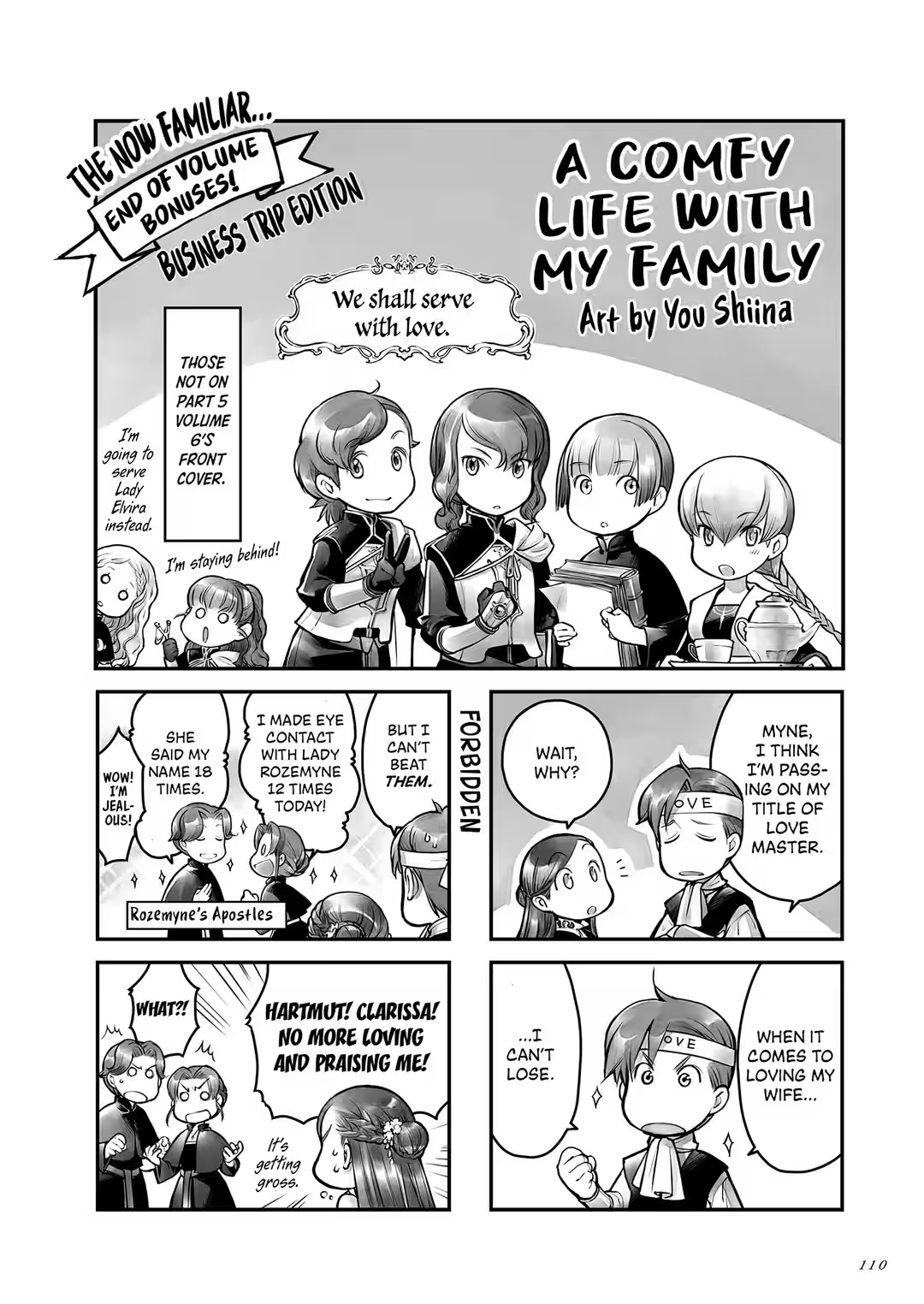
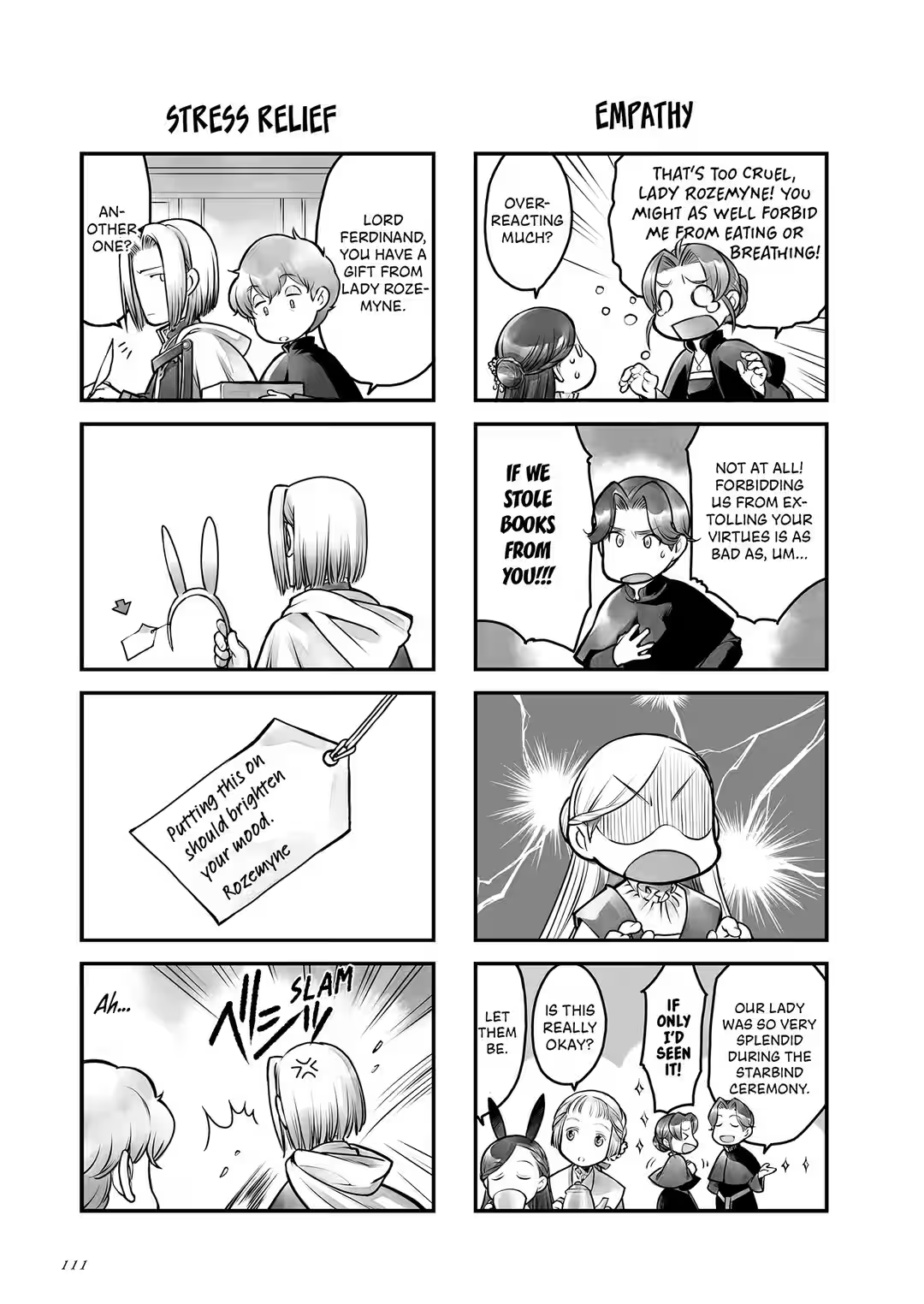
Messages from the Creators
Miya Kazuki
This time, I included the plotting stage of a short story wholesale. Please enjoy seeing my thought process and what ended up being cut.
You Shiina
For this volume’s cover, I took inspiration from Part 5 Volume 5 of the light novels. Rozemyne’s the princess of constellations.
Suzuka
It feels like forever ago that I drew the post-recording manga for the second drama CD. Going to the studio is always so much fun.
Ryo Namino
We’re finally at the sixth fanbook. It was plenty fun to work on. I look forward to the next one.
Hikaru Katsuki
Greetings! I’m in charge of the manga adaptation of Part 4. I hope you enjoy Hartmut’s enthusiasm at becoming a retainer, and Cornelius’s struggles!